| Revision as of 06:24, 19 January 2009 editJohnAlbertRigali (talk | contribs)Extended confirmed users3,898 edits →External links: (added Stirnet links, did some cleanup)← Previous edit | Latest revision as of 16:50, 24 December 2024 edit undoMaxymczech (talk | contribs)Extended confirmed users506 editsm →Table of rulers | ||
| (253 intermediate revisions by 97 users not shown) | |||
| Line 1: | Line 1: | ||
| {{Short description|Dynasty of German rulers}} | |||
| {{Royal house| | |||
| {{pp-pc|small=yes}} | |||
| |surname =House of Ascania | |||
| {{Multiple issues| | |||
| |estate =Anhalt | |||
| {{more footnotes needed|date=November 2017}} | |||
| |coat of arms =] | |||
| {{expand German|Askanier|date=March 2018}} | |||
| |country =], ], ], ], ], ] | |||
| |titles =Count, Prince, Duke, Margrave, Empress | |||
| |founder =] | |||
| |final ruler =] | |||
| |current head = ] | |||
| |founding year =1036 | |||
| |dissolution =1918 | |||
| |nationality =German | |||
| }} | }} | ||
| {{infobox royal house||surname=House of Ascania|coat of arms=] ] ]|country=] [[Duchy of Saxony|Duchy of Saxony | |||
| The '''House of Ascania''' ({{lang-de|Askanier}}) was a ] of German rulers. It was also known as the '''House of Anhalt''', after ], its longest possession. | |||
| (804–1036)]]<br />] [[Duchy of Saxony|Duchy of Saxony | |||
| (1036–1296)]]<br />] ]|titles=*Count/Prince/Duke of ] | |||
| *] | |||
| *] ] | |||
| *] | |||
| *] | |||
| *] ] | |||
| *] ] | |||
| *] | |||
| *]|founder=]|final ruler=]|current head=]|founding year=1036|deposition=1918 (])}} | |||
| The '''House of Ascania''' ({{langx|de|Askanier}}) was a ] of German rulers. It is also known as the '''House of Anhalt''', which refers to its longest-held possession, ].<ref>{{Cite web|last=Hiebl|first=Manfred|date=2006|title=Das Haus Askanien-Anhalt, dessen Zweige und ihre Bedeutung|url=http://www.manfred-hiebl.de/genealogie-mittelalter/partenheimer_lutz/dessau_katalog.html|access-date=2020-08-29|website=www.manfred-hiebl.de}}</ref> | |||
| The Ascanians are named after Ascania (or Ascaria) Castle, which |
The Ascanians are named after Ascania (or Ascaria) Castle, known as ''Schloss Askanien'' in German, which was located near and named after ].<ref>{{Cite web|date=2003-08-01|title=Ascania 1|url=http://genealogy.euweb.cz/ascania/ascan1.html|access-date=2020-08-29|website=genealogy.euweb.cz}}</ref><ref>{{Cite book|last=hrsg. von Werner Paravicini. Bearb. von Jan Hirschbiegel|url=https://www.worldcat.org/oclc/723003848|title=Höfe und Residenzen im spätmittelalterlichen Reich Bd. 1. Ein dynastisch-topographisches Handbuch Teilbd. 2. Residenzen|isbn=978-3-7995-4515-0|location=Ostfildern|chapter=Askanier|oclc=723003848|chapter-url=https://adw-goe.de/en/digital-library/hoefe-und-residenzen-im-spaetmittelalterlichen-reich/gsn/rf15_I_121220-38/}}</ref> The castle was the seat of the County of Ascania, a title that was later subsumed into the titles of the princes of Anhalt. | ||
| ==History== | |||
| The earliest known member of the House is ]. He was first mentioned in 1036, and is assumed to have been a grandson (through his mother) of ]. From Odo, the Ascanians inherited large properties in the ]. | |||
| <gallery> | |||
| File:Schloss Ballenstedt, Hofseite.JPG|] Castle | |||
| File:Arms of the house of Ascania (ancient).svg|First coat of arms of the family | |||
| Map of Anhalt (1747-1793).svg|Map of Anhalt (1747–1793) | |||
| </gallery> | |||
| The earliest known member of the house, ], first appears in a document of 1036. He is assumed to have been a grandson (through his mother) of ]. From Odo, the Ascanians inherited large properties in the ]. | |||
| Esiko's grandson was ], who died in 1123. By Otto's marriage to ], daughter of ], the Ascanians became heirs to half of the property of the House of ], former dukes of ]. | |||
| Otto's son, ], became, with the help of his mother's inheritance, the first Ascanian duke of Saxony in 1139. However, he soon lost control of Saxony to the rival ]. | |||
| However, Albert inherited the ] from its last ] ruler, ], in 1150, and became the first Ascanian margrave. Albert, and his descendants of the House of Ascania, then made considerable progress in ] and ] the lands. As a borderland between German and ] cultures, the country was known as a ]. | |||
| Albert inherited the ] in 1157 from its last ] ruler, ], and he became the first Ascanian margrave. Albert, and his descendants of the House of Ascania, then made considerable progress in ] and ] the lands. As a borderland between German and ] cultures, the country was known as a ]. | |||
| In 1237 and 1244 two towns, Coelln and Berlin were founded during the rule of Otto and Johann, grandsons of Margrave Albert the Bear, (later they were united into one city, Berlin). The emblem of the House of Ascania, red eagle and bear, became the heraldric emblems of Berlin. | |||
| In 1237 and 1244, two towns, ] and Berlin, were founded during the rule of Otto and Johann, grandsons of Margrave Albert the Bear. Later, they were united into one city, ]. The emblem of the House of Ascania, a red eagle and bear, became the heraldic emblems of Berlin. In 1320, the Brandenburg Ascanian line came to an end. | |||
| In 1320 the Brandenburg Ascanian line came to an end. | |||
| After the Emperor had deposed the Guelph rulers of Saxony in 1180, Ascanians returned to rule the Duchy of Saxony, which had been reduced to its eastern half by the Emperor. However, even in eastern Saxony, the Ascanians could establish control only in limited areas, mostly near the River Elbe. |
After the Emperor had deposed the Guelph rulers of Saxony in 1180, Ascanians returned to rule the Duchy of Saxony, which had been reduced to its eastern half by the Emperor. However, even in eastern Saxony, the Ascanians could establish control only in limited areas, mostly near the River Elbe. | ||
| In the 13th century, the Principality of |
In the 13th century, the ] was split off from the Duchy of Saxony. Later, the remaining state was split into ] and ]. The Ascanian dynasties in the two Saxon states became extinct in 1689 and in 1422, respectively, but Ascanians continued to rule in the smaller state of Anhalt and its various subdivisions until the monarchy was abolished in 1918. | ||
| ], Empress of Russia from 1762 to 1796, was a member of the House of Ascania, herself the daughter of ]. | |||
| ==Rulers of the House of Ascania== | |||
| ===House of Ascania=== | |||
| ====Partitions of the House of Ascania==== | |||
| {|align="center" style="border-spacing: 0px; border: 1px solid black; text-align: center;" | |||
| |+ | |||
| |- | |||
| | colspan=23 style="background: #fff;" | <!---Ballenstedt---> | |||
| |- | |||
| | colspan=4 rowspan="2" style="background: #aee;" |'''County of Weimar-Orlamunde'''<br/>(1113–1247) | |||
| | colspan=19 style="background: #fff;" |'''County of Ballenstedt'''<br/>(1030–1170) | |||
| |- | |||
| | colspan=4 rowspan="3" style="background: #fea;" |'''Duchy of Saxony'''<br/>(1180–1296) | |||
| | colspan=2 rowspan="2" style="background: #ceb;" |'''Margraviate of Brandenburg'''<br>(1157-1266/67) | |||
| | colspan=7 style="background: #fde;" |'''County of Anhalt'''<br>(1123–1212)<br><small>Raised to:</small><br>'''Principality of Anhalt'''<br>(1212–1252) | |||
| |- | |||
| | colspan=3 rowspan="2" style="background: #adf;" |'''Weimar'''<br/>(1247–1372) | |||
| | colspan=1 rowspan="7" style="background: #aee;" |'''Orlamunde'''<br><small>(from 1354 in Schauenforst and Droyssig)</small><br/>(1247–1420) | |||
| | colspan=4 rowspan="6" style="background: #ecd;" |'''Zerbst'''<br><small>(1st creation)</small><br>(1252–1396) | |||
| | colspan=1 rowspan="7" style="background: #ecf;" |'''Bernburg'''<br><small>(1st creation)</small><br>(1252–1468) | |||
| | colspan=1 rowspan="4" style="background: #fde;" |'''Aschersleben'''<br>(1252–1315) | |||
| |- | |||
| | colspan=1 rowspan="2" style="background: #cfc;" |'''Stendal'''<ref>From Stendal split off: | |||
| *<span style="background-color:#acc;">'''Krossen'''</span> (1266–1308) | |||
| *<span style="background-color:#aca;">'''Neumark'''</span> (1266–1318)</ref><br>(1266–1318) | |||
| | colspan=1 rowspan="2" style="background: #ada;" |'''Salzwedel'''<ref><span style="background-color:#ace;">'''Stargard'''</span> split off from Salzwedel (1267-1316) and was then annexed to the ].</ref><br>(1267–1317) | |||
| |- | |||
| | colspan=1 rowspan="3" style="background: #adf;" | <!---Weimar---> | |||
| | colspan=1 rowspan="3" style="background: #bee;" |'''Plassenburg'''<br/>(1285–1340) | |||
| | colspan=1 style="background: #adf;" | <!---Weimar---> | |||
| | colspan=1 rowspan="5" style="background: #fea;" |'''Wittenberg'''<br/>(1296–1356)<br><small>Raised to:</small><br>'''Electorate of Saxe-Wittenberg'''<br/>(1356–1422) | |||
| | colspan=3 style="background: #fedf;" |'''Lauenburg'''<br/>(1296–1303) | |||
| |- | |||
| | colspan=1 rowspan="4" style="background: #cef;" |'''Lauenstein'''<br/>(1319–1460) | |||
| | colspan=1 rowspan="3" style="background: #ec6;" |'''Mölln'''<br/>(1303–1401) | |||
| | colspan=1 style="background: #fc9;" | <!---Bergdorf---> | |||
| | colspan=1 style="background: #ffc;" |'''Ratzeburg'''<br/>(1303–15) | |||
| | colspan=2 style="background: #ceb;" |'''Margraviate of Brandenburg'''<br><small>(<span style="background-color:#cfc;">'''Stendal'''</span> line)</small><br>(1318–20) | |||
| |- | |||
| | colspan=2 rowspan="2" style="background: #fc9;" | '''Bergdorf'''<br/>(1303–15)<br><small>Renamed as</small><br>'''Ratzeburg'''<br/>(1315–1401) | |||
| | colspan=2 rowspan="13" style="background: #eee;" |<small>''Annexed to the<br> ]''</small> | |||
| | colspan=1 rowspan="13" style="background: #eee;" |<small>''Annexed to <br>]''</small> | |||
| |- | |||
| | colspan=2 rowspan="12" style="background: #eee;" |<small>''Annexed to the <br>]''</small> | |||
| |- | |||
| | colspan=3 rowspan="7" style="background: #fedf;" |'''Lauenburg'''<br><small>''(<span style="background:#fc9;">'''Ratzeburg'''</span> line'')</small><br>(1401–1689) | |||
| | colspan=3 rowspan="5" style="background: #ccf;" |'''Köthen'''<br><small>(1st creation)</small><br>(1396–1562) | |||
| | colspan=1 style="background: #fde;" | <!---Dessau---> | |||
| |- | |||
| | colspan=3 rowspan="10" style="background: #eee;" |<small>''Annexed to the<br> ]''</small> | |||
| | colspan=2 style="background: #fde;" | <!---Dessau---> | |||
| |- | |||
| | colspan=1 style="background: #fde;" |'''Dessau'''<ref>The color chosen for Dessau was the same as the Principality of Anhalt as a whole, because, when united, the principality had this town as capital.</ref><br><small>(1st creation)</small><br>(1396–1561) | |||
| | colspan=1 rowspan="2" style="background: #ecd;" |'''Zerbst'''<br><small>(2nd creation)</small><br>(1544–62) | |||
| |- | |||
| | colspan=1 style="background: #fde;" | <!---Dessau---> | |||
| |- | |||
| | colspan=2 style="background: #ecd;" | <!---Zerbst---> | |||
| |- | |||
| | colspan=5 style="background: #fde;" |'''Principality of Anhalt'''<br><small>''(<span style="background-color:#ecd;">'''Zerbst'''</span> line)''</small><br>(1562–1603) | |||
| |- | |||
| | colspan=1 style="background: #fbd;" |'''Plötzkau'''<br>(1603–1665) | |||
| | colspan=1 style="background: #ccf;" |'''Köthen'''<br><small>(2nd creation)</small><br>(1603–1847) | |||
| | colspan=1 rowspan="2" style="background: #fde;" |'''Dessau'''<br><small>(2nd creation)</small><br>(1603–1863) | |||
| | colspan=1 rowspan="2" style="background: #ecd;" |'''Zerbst'''<br><small>(3rd creation)</small><br>(1603–1793) | |||
| | colspan=1 rowspan="4" style="background: #ecf;" |'''Bernburg'''<br><small>(2nd creation)</small><br>(1603–1863) | |||
| |- | |||
| | colspan=3 rowspan="4" style="background: #eee;" |<small>''Annexed to the<br> ]''</small> | |||
| | colspan=2 rowspan="2" style="background: #ccf;" | <!---Kothen---> | |||
| |- | |||
| | colspan=2 style="background: #fde;" | <!---Dessau---> | |||
| |- | |||
| | colspan=4 style="background: #fde;" | <!---Dessau---> | |||
| |- | |||
| | colspan=5 style="background: #fde;" |'''Duchy of Anhalt'''<br><small>''('''Dessau''' line)''</small><br>(1863–1918) | |||
| |} | |||
| ====Table of rulers==== | |||
| {{Sticky header}} | |||
| {| class="wikitable sticky-header" | |||
| |- style="background:#cccccc" | |||
| ! colspan=2 | Ruler!!Born!!Reign!!Ruling part!!Consort!!Death!!Notes | |||
| |- style="background:#fff" | |||
| |]<ref>Even his name is uncertain; sources name him Adalbert assuming that his grandson, Count Adalbert (II) (d.1080) was named after him.</ref>|| | |||
| |align="center"|c.970<br><small>?</small> | |||
| |align="center"|c.1000–1036||County of ]||Hidda<br>four children | |||
| |align="center"|1036<br><small>aged 65–66</small>||First documented member of the family. | |||
| |- style="background:#fff" | |||
| |]|| | |||
| |align="center"|c.1000<br><small>Son of ] and Hidda</small> | |||
| |align="center"|1036–1060||County of ]||]<br>1026<br>three children | |||
| |align="center"|1060<br><small>aged 59–60</small>|| | |||
| |- style="background:#fff" | |||
| |]||] | |||
| |align="center"|c.1030<br>]<br><small>Son of ] and ]</small> | |||
| |align="center"|1060–1080||County of ]||]<br>c.1070<br>two children | |||
| |align="center"|c.1080<br>]<br><small>aged c.49-50</small>|| | |||
| |- style="background:#fff" | |||
| |]|| | |||
| |align="center"|c.1065<br><small>First son of ] and ]</small> | |||
| |align="center"|1080 – 9 February 1123||County of ]||]<br>c.1095<br>two children | |||
| |align="center"|9 February 1123<br><small>aged 57–58?</small> | |||
| |rowspan="2"|Children of Adalbert II, divided their inheritance. | |||
| |- style="background:#aee" | |||
| |]|| | |||
| |align="center"|c.1070<br><small>Second son of ] and ]</small> | |||
| |align="center"|1080 – 9 March 1113||]||]<br>1026<br>three children | |||
| |align="center"|9 March 1113<br><small>aged 42–43?</small> | |||
| |- style="background:#aee" | |||
| |colspan=7 style="text-align:center"|<small>''Regencies of ] (1113–1115) and ] (1115–1121)''</small> | |||
| |rowspan=2|Left no descendants. The county went to his brother. | |||
| |- style="background:#aee" | |||
| |]||] | |||
| |align="center"|1107<br><small>First son of ] and ]</small> | |||
| |align="center"|9 March 1113 – 19 March 1124||]||]<br>no children | |||
| |align="center"|19 March 1124<br><small>aged 16–17</small> | |||
| |- style="background:#fff" | |||
| || ] ||] | |||
| |align="center"|c.1100<br><small>Son of ] and ]</small> | |||
| |align="center"|9 February 1123 – 18 November 1170||County of ]<br><small>(with ] from 1157)</small>||]<br/>1124<br/>thirteen children | |||
| |align="center"|18 November 1170<br>] (possibly)<br><small>aged 69–70</small>||Besides count of Ballenstedt, he was also the first Margrave of Brandenburg (1157). Ruler of the ] from 1134, and the county of Weimar-Orlamünde since 1140. | |||
| |- style="background:#aee" | |||
| |colspan=7 style="text-align:center"|<small>''Regency of ] (1124-1126)''</small> | |||
| |rowspan=2|Also ascended as a minor Left no descendants. The county went to his cousin, Albert the ''Bear'', from Ballenstedt. | |||
| |- style="background:#aee" | |||
| |]|| | |||
| |align="center"|1112<br>]<br><small>Second son of ] and ]</small> | |||
| |align="center"|19 March 1124 – 13 February 1140||]||Adelaide<br>no children | |||
| |align="center"|13 February 1140<br>]<br><small>aged 27–28</small> | |||
| |- style="background:#aee" | |||
| |align="center" colspan="8"|''Weimar-Orlamünde briefly annexed to Ballenstedt (1140-70)'' | |||
| |- style="background:#ceb" | |||
| | ] ||] | |||
| |align="center"|1128<br><small>First son of ] and ]</small> | |||
| |align="center"|18 November 1170 – 8 July 1184||]||]<br/>1148<br/>two children<br/><br/>]<br/>1175<br/>one child | |||
| |align="center"|8 July 1184<br><small>aged 55–56</small> | |||
| |rowspan="5" style="background:#fff"| Children of Albert I, divided their inheritance. After Adalbert and Dietrich's childless deaths, their possessions were inherited by the younger brother, Bernard. | |||
| |- style="background:#aee" | |||
| |]|| | |||
| |align="center"|1130<br><small>Second son of ] and ]</small> | |||
| |align="center"|18 November 1170 – 19 October 1176||]||Irmgard<br>two children | |||
| |align="center"|19 October 1176<br><small>aged 45–46</small> | |||
| |- style="background:#fff" | |||
| |]|| | |||
| |align="center"|1136<br><small>Fourth son of ] and ]</small> | |||
| |align="center"|18 November 1170 – 1171||County of ]<br><small>(at ])</small> | |||
| |rowspan="2"|''Unmarried'' | |||
| |align="center"|1171<br><small>aged 34–35</small> | |||
| |- style="background:#fff" | |||
| |]|| | |||
| |align="center"|1137<br><small>Fifth son of ] and ]</small> | |||
| |align="center"|18 November 1170 – 1183||County of ]<br><small>(at ])</small> | |||
| |align="center"|1183<br><small>aged 45–46</small> | |||
| |-style="background:#fde" | |||
| |]<ref>Numbered ''Bernard III'' as Duke of Saxony, but, as an ancestor of the Anhalt branch, he is not counted in Anhalt, as the next prince Bernard, reigning in Bernburg, is usually styled ''Bernard I''. This is probably derived of a different status between this Bernard, a count in Anhalt, and the following Bernards, who were already princes.</ref>||] | |||
| |align="center"|1140<br><small>Sixth son of ] and ]</small> | |||
| |align="center"|18 November 1170 – 2 February 1212||]<br><small>(with ] and ])</small> || Brigitte of Denmark<br>one child<br><br>]<br>c.1173<br>five children<br><br>Sophia of Thuringia<br>one child | |||
| |align="center"|2 February 1212<br>]<br><small>aged 71–72</small> | |||
| |- style="background:#fff" | |||
| |align="center" colspan="8"|''Aschersleben and Burgwerben annexed to Anhalt'' | |||
| |- style="background:#aee" | |||
| |]|| | |||
| |align="center"|1155<br><small>Son of ] and Irmgard</small> | |||
| |align="center"|19 October 1176 – 1206||]||]<br>c.1180<br>three children | |||
| |align="center"|1206<br><small>aged 50–51</small>|| | |||
| |- style="background:#ceb" | |||
| | ] ||] | |||
| |align="center"|c.1150<br><small>First son of ] and ]</small> | |||
| |align="center"|8 July 1184 – 4 July 1205||]||''Unmarried'' | |||
| |align="center"|4 July 1205<br><small>aged 54–55</small> | |||
| |rowspan="2"|Elder children of Otto I, both left no descendants. The patrimony was inherited by their half-brother, Albert II. | |||
| |- style="background:#ceb" | |||
| | ] || | |||
| |align="center"|c.1150?<br><small>Second son of ] and ]</small> | |||
| |align="center"|8 July 1184 – 1192||]<br><small>(at ])</small>||''Unmarried'' | |||
| |align="center"|1192<br><small>aged 41–42?</small> | |||
| |- style="background:#ceb" | |||
| | ] ||] | |||
| |align="center"|1177<br><small>Son of ] and ]</small> | |||
| |align="center"|4 July 1205 – 25 February 1220||]||]<br>1205<br>four children | |||
| |align="center"|25 February 1220<br><small>aged 42–43</small>|| | |||
| |- style="background:#aee" | |||
| |]|| | |||
| |align="center"|1182<br><small>First son of ] and ]</small> | |||
| |align="center"|1206 – 22 October 1245||]<br><small>(at ])</small>||''Unmarried'' | |||
| |align="center"|22 October 1245<br><small>aged 62–63</small> | |||
| |rowspan="3"| Children of Siegfried III, divided their inheritance, which was soon reunited by Herman II. | |||
| |- style="background:#aee" | |||
| |]||] | |||
| |align="center"|1184<br><small>Second son of ] and ]</small> | |||
| |align="center"|1206 – 27 December 1247||]<br><small>(at ])</small>||]<br>c.1230<br>six children | |||
| |align="center"|27 December 1247<br><small>aged 62–63</small> | |||
| |- style="background:#aee" | |||
| |]|| | |||
| |align="center"|c.1185<br><small>Third son of ] and ]</small> | |||
| |align="center"|1206–1211||]<br><small>(at ])</small>||''Unmarried'' | |||
| |align="center"|1211<br><small>aged 25–26</small> | |||
| |- style="background:#aee" | |||
| |align="center" colspan="8"|''Nordhalben and Weimar rejoined Orlamünde'' | |||
| |-style="background:#fde" | |||
| |]||] | |||
| |align="center"|c.1173<br><small>First son of ] and ]</small> | |||
| |align="center"|2 February 1212 – 1252||]<br><small>(until 1218)</small><br><br>]<br><small>(from 1218)</small> ||]<br>1211<br>eleven children | |||
| |align="center"|1252<br><small>aged 78–79</small> | |||
| |rowspan="2" style="background:#fff"| Children of Bernard, divided their inheritance. In 1218 Henry becomes Prince of Anhalt, which after his death is divided by his sons. | |||
| |- style="background:#fea;" | |||
| |]||] | |||
| |align="center"|c.1175<br><small>Second son of ] and ]</small> | |||
| |align="center"|2 February 1212 – 7 October 1260||] || ]<br/>1222<br/>five children<br/><br/>]<br/>1238<br/>three children<br/><br/>]<br/>1247<br/>five children | |||
| |align="center"|7 October 1260<br><small>aged 84–85</small> | |||
| |- style="background:#ceb" | |||
| |colspan="7" style="text-align:center"|<small>''Regencies of ] (1220–1225), ] (1220–1221) and ] (1221–1225)''</small> | |||
| |rowspan="3"|Children of Albert II, ruled jointly, but their children divided the margraviate. | |||
| |- style="background:#ceb" | |||
| | ] | |||
| |rowspan="2"|] | |||
| |align="center"|1213<br><small>First son of ] and ]</small> | |||
| |align="center"|25 February 1220 – 4 April 1266 | |||
| |rowspan="2"|]||]<br>1230<br>six children<br><br>]<br>1255<br>four children | |||
| |align="center"|4 April 1266<br>]<br><small>aged 52–53</small> | |||
| |- style="background:#ceb" | |||
| | ] | |||
| |align="center"|1215<br><small>Second son of ] and ]</small> | |||
| |align="center"|25 February 1220 – 9 October 1267||]<br>1243<br>six children | |||
| |align="center"|9 October 1267<br>]<br><small>aged 51–52</small> | |||
| |- style="background:#aee" | |||
| |]|| | |||
| |align="center"|c.1230<br><small>Second son of ] and ]</small> | |||
| |align="center"|27 December 1247 – 1283||County of ]||''Unknown''<br>four children | |||
| |align="center"|1283<br><small>aged 52–23</small> | |||
| |rowspan="4" style="background:#aee"| Children of Herman II, divided their inheritance. | |||
| |- style="background:#adf" | |||
| |]||] | |||
| |align="center"|1236<br><small>Third son of ] and ]</small> | |||
| |align="center"|27 December 1247 – 13 May 1285||County of ]||]<br><small>(c. 1230/40-13 May 1285)</small><br>1266<br>four children | |||
| |align="center"|13 May 1285<br><small>aged 48–49</small> | |||
| |- style="background:#adf" | |||
| |]|| | |||
| |align="center"|c.1240<br><small>Fourth son of ] and ]</small> | |||
| |align="center"|27 December 1247 – 1283||County of ]||''Unmarried'' | |||
| |align="center"|1283<br><small>aged 42–43</small> | |||
| |- style="background:#aee" | |||
| |]|| | |||
| |align="center"|c.1240<br><small>Daughter of ] and ]</small> | |||
| |align="center"|27 December 1247 – 1270||]<br><small>(at ])</small>||]<br>19 July 1258<br>three children | |||
| |align="center"|c.1270<br><small>aged 29–30</small> | |||
| |-style="background:#fde" | |||
| |]||] | |||
| |align="center"|1215<br><small>First son of ] and ]</small> | |||
| |align="center"|1252 – 12 June 1266||]||]<br>1245<br>two children | |||
| |align="center"|12 June 1266<br><small>aged 50–51</small> | |||
| |rowspan="3"| Children of Henry I, divided their inheritance. | |||
| |-style="background:#ecf" | |||
| |]||] | |||
| |align="center"|1218<br><small>Second son of ] and ]</small> | |||
| |align="center"|1252–1287||]||]<br>3 February 1258<br>]<br>six children | |||
| |align="center"|1287<br><small>aged 68–69</small> | |||
| |-style="background:#ecd" | |||
| |]|| | |||
| |align="center"|1230<br><small>Seventh son of ] and ]</small> | |||
| |align="center"|1252 – 25 March 1298||] ||]<br>17 October 1259<br>ten children | |||
| |align="center"|25 March 1298<br>]<br><small>aged 67–68</small> | |||
| |- style="background:#fea;" | |||
| |]|| | |||
| |align="center"|1249<br>]<br><small>First son of ] and ]</small> | |||
| |align="center"|7 October 1260 – 1282 | |||
| |rowspan="2"|]<br><small>(Since 1296 in ])</small>|| ]<br/>1270<br/>eight children | |||
| |align="center"|30 July 1285<br>]<br><small>aged 35–36</small> | |||
| |rowspan="2"| Ruled jointly; and associated his nephews to the joint rulership after his brothers death. However, these three nephews divided the land with him. Albert II retained Saxe-Wittenberg, and became the head of the Elder Saxon Line; Albert III, Eric I and John II ruled together in Saxe-Lauenburg, becoming the founders of the Younger Saxon Line. | |||
| |- style="background:#fea;" | |||
| ||]||] | |||
| |align="center"|1250<br>]<br><small>Second son of ] and ]</small> | |||
| |align="center"|7 October 1260 – 25 August 1298|| ]<br/>1282<br/>six children | |||
| |align="center"|25 August 1298<br>]<br><small>aged 35–36</small> | |||
| |- style="background:#fea;" | |||
| | style="text-align:center" colspan=8 | In 1296 Albert II and his nephews (Albert III, Eric I, and John II) ended their joint rule and divided Saxony into the Lauenburg line, where Albert III, Eric I, and John II continued to rule jointly until 1303, and the Wittenberg line, where Albert II continued as sole ruler until 1298. Since the Duke of Saxony was considered one of the ]s electing a new ], conflict arose between the lines of Lauenburg and Wittenberg over the issue of who should cast Saxony's vote. In 1314 both lines found themselves on different sides in a double election. Eventually, the Dukes of Saxe-Wittenberg succeeded in 1356 after the promulgation of the ]. To distinguish him from other rulers bearing the title Duke of Saxony, he was commonly called '']''. | |||
| |- style="background:#fde" | |||
| |colspan="7" style="text-align:center"| <small>''Regency of ] (1266–1270)''</small> | |||
| |rowspan="3"| Children of Henry II, ruled jointly, first under their mother, who was elected Abbess of ] in 1275. In 1283, Henry renounced his rights in Otto's favor, and later became ]. | |||
| |-style="background:#fde" | |||
| |] | |||
| |rowspan="2"|] | |||
| |align="center"|c.1245<br><small>First son of ] and ]</small> | |||
| |align="center"|12 June 1266 – 25 June 1304 | |||
| |rowspan="2"|] ||]<br>1283<br>three children | |||
| |align="center"|25 June 1304<br><small>aged 58–59</small> | |||
| |-style="background:#fde" | |||
| |] | |||
| |align="center"|c.1245<br><small>Second son of ] and ]</small> | |||
| |align="center"|12 June 1266 – 1283||''Unmarried'' | |||
| |align="center"|9 November 1307<br><small>aged 61–62</small> | |||
| |- style="background:#cfc" | |||
| | ] ||] | |||
| |align="center"|1237<br><small>First son of ] and ]</small> | |||
| |align="center"|9 October 1267 – 10 September 1281||]<br><small>(at ])</small>||Hedwig of Werle<br><small>(1243–1287)</small><br>1249<br>two children | |||
| |align="center"|10 September 1281<br><small>aged 43–44</small> | |||
| |rowspan="4" style="background:#ceb"|Children of John I. Despite co-rulership between them, they received different parts in the Margraviate to rule (alone or in co-rulership): | |||
| * John II received seat at Krossen; | |||
| * Otto IV received seat at Stendal; | |||
| * Conrad received seat at Neumark, and associated his sons in 1291. | |||
| |- style="background:#cfc" | |||
| | ] ||] | |||
| |align="center"|1238<br><small>Second son of ] and ]</small> | |||
| |align="center"|9 October 1267 – 27 November 1308||]<br><small>(at ])</small>||Heilwig of Holstein-Kiel<br><small>(d.1305)</small><br>1279<br>no children<br><br>Judith of Henneberg-Schleusingen<br><small>(d.1315)</small><br>1308<br>no children | |||
| |align="center"|27 November 1308<br><small>aged 69–70</small> | |||
| |- style="background:#cfc" | |||
| | ] ||] | |||
| |align="center"|1240<br><small>Third son of ] and ]</small> | |||
| |align="center"|9 October 1267 – 1304 | |||
| |rowspan="2"|]<br><small>(at ])</small>||]<br>1260<br>]<br>three children | |||
| |align="center"|1304<br>]<br><small>aged 63–64</small> | |||
| |- style="background:#cfc" | |||
| | ]<ref>Otto VII is listed before Otto V and VI here, as his rule, as it was never independent (unlike his brother John IV, who survived their father), is considered ''within'' the rule of his father, which began in 1267.</ref> ||] | |||
| |align="center"|c.1265<br><small>Second son of ] and ]</small> | |||
| |align="center"|1291–1297||''Unmarried'' | |||
| |align="center"|1297<br><small>aged 31–32</small> | |||
| |- style="background:#ada" | |||
| | ] ||] | |||
| |align="center"|6 April 1244<br>]<br><small>First son of ] and ]</small> | |||
| |align="center"|9 October 1267 – 8 April 1268 | |||
| |rowspan="3"|]<br><small>(at ])</small>||''Unmarried'' | |||
| |align="center"|8 April 1268<br>]<br><small>aged 24</small> | |||
| |rowspan="4" style="background:#ceb"|Children of Otto III. Despite co-rulership between them, they received different parts in the Margraviate to rule (alone or in co-rulership): | |||
| * John III (and then Otto V with Otto VI) received the seat at Salzwedel, from which Otto VI abdicated in 1286; | |||
| * Albert III received a seat in Stargard (which he ruled alone at least from 1284. | |||
| |- style="background:#ada" | |||
| | ] || | |||
| |align="center"|1246<br>]<br><small>Second son of ] and ]</small> | |||
| |align="center"|9 October 1267 – July 1299||]<br>22 October 1268<br>]<br>four children | |||
| |align="center"|July 1299<br><small>aged 52–53</small> | |||
| |- style="background:#ada" | |||
| | ] ||] | |||
| |align="center"|3/17 November 1264<br><small>Fourth son of ] and ]</small> | |||
| |align="center"|9 October 1267 – 1286||]<br>February 1279<br>]<br>no children | |||
| |align="center"|6 July 1303<br>]<br><small>aged 38</small> | |||
| |- style="background:#ada" | |||
| | ] ||] | |||
| |align="center"|c.1250<br><small>Third son of ] and ]</small> | |||
| |align="center"|9 October 1267 – 1300||]<br><small>(at ])</small>||]<br>1268<br>four children | |||
| |align="center"|1300<br><small>aged 49–50</small> | |||
| |- style="background:#cfc" | |||
| | ] || | |||
| |align="center"|1261<br><small>Son of ] and Hedwig of Werle</small> | |||
| |align="center"|10 September 1281 – 1308||]<br><small>(at ])</small>||''Unmarried'' | |||
| |align="center"|1308<br><small>aged 46–47</small>||With his childless death his land reverted to Stendal. | |||
| |- style="background:#cfc" | |||
| |colspan="8" align="center"|''Krossen re-annexed to Stendal'' | |||
| |- style="background:#aee" | |||
| |]|| | |||
| |align="center"|{{Circa|1270}}<br><small>First son of ]</small> | |||
| |align="center"|1283 – 26 March 1354 | |||
| |rowspan="2"|County of ]||]<br>26 July 1313<br>two children | |||
| |align="center"|26 March 1354<br><small>aged 83–84?</small> | |||
| |rowspan="3"|Children of Herman III, divided their inheritance. | |||
| |- style="background:#aee" | |||
| |]<ref name="RefNumb1">Herman V was possibly younger than his cousin Herman IV, but he ascended two years earlier then him.</ref>|| | |||
| |align="center"|{{Circa|1270}}<br><small>Second son of ]</small> | |||
| |align="center"|1283–1312||''Unmarried'' | |||
| |align="center"|1312<br><small>aged 41–42?</small> | |||
| |- style="background:#aee" | |||
| |]|| | |||
| |align="center"|1265<br><small>Daughter of ]</small> | |||
| |align="center"|1283–1327||County of ]<br><small>(at ])</small>||Hartmann XI, Count of Lobdeburg-Arnshaugk<br>one child<br><br>]<br>1 October 1290<br>no children | |||
| |align="center"|1327<br><small>aged 56–57</small> | |||
| |- style="background:#adf" | |||
| |]<ref name="RefNumb1"/>||] | |||
| |align="center"|{{Circa|1270}}<br><small>First son of ] and ]</small> | |||
| |align="center"|13 May 1285 – 1319||County of ]||]<br><small>(d.1339)</small><br>24 November 1290<br>four children | |||
| |align="center"|1319<br><small>aged 48–49</small> | |||
| |rowspan="2"|Children of Otto III, divided their inheritance. | |||
| |- style="background:#bee" | |||
| |]||] | |||
| |align="center"|1279<br><small>Second son of ] and ]</small> | |||
| |align="center"|13 May 1285 – 1318||County of ]||]<br><small>(d.c.1305)</small><br>14 December 1296<br>one child<br><br>]<br><small>(1286–1322)</small><br>1308<br>one child | |||
| |align="center"|1318<br><small>aged 38–39</small> | |||
| |-style="background:#ecf" | |||
| |]|| | |||
| |align="center"|1258<br><small>First son of ] and ]</small> | |||
| |align="center"|1287 – 5 June 1291 | |||
| |rowspan="2"|] ||''Unmarried'' | |||
| |align="center"|5 June 1291<br><small>aged 32–33</small> | |||
| |rowspan="2"| Children of Bernard I, ruled jointly. | |||
| |-style="background:#ecf" | |||
| |]||] | |||
| |align="center"|1260<br><small>Third son of ] and ]</small> | |||
| |align="center"|1287 – 1323||]<br>27 December 1302<br>three children | |||
| |align="center"|1323<br><small>aged 62–63</small> | |||
| |- style="background:#ec6;" | |||
| ||]|| | |||
| |align="center"|1275<br><small>First son of ] and ]</small> | |||
| |align="center"|20 September 1296 – 22 April 1322|| ]<br><small>(in co-rulership in <span style="background-color:#fedf;">''']'''</span> until 1303)</small>|| ]<br/>1315<br/>one child | |||
| |align="center"|22 April 1322<br>]<br><small>aged 46–47</small> | |||
| |rowspan="4" style="background:#fedf|Children of John I, co-ruled first with their uncle Albert II since 1282 (since the death of their father), and in 1296 split the land with him. They retained Lauenburg, which they divided once more. Albert passed the land to his widow, and after her death, in 1315, the territory was realigned: Eric divided Bergdorf with his surviving brother and held all of his brother Albert's inheritance. However, he ended up abdicating to his son, and survived for most of his reign. | |||
| |- style="background:#fc9;" | |||
| ||]||] | |||
| |align="center"|1280<br><small>Second son of ] and ]</small> | |||
| |align="center"|20 September 1296 – 1338||]<br><small>(in co-rulership in <span style="background-color:#fedf;">''']'''</span> until 1303; in Bergedorf 1303–1315)</small><br><br>]<br><small>(from 1315)</small>|| ]<br/>1316 or 1318<br/>four children | |||
| |align="center"|1360<br>]<br><small>aged 79–80</small> | |||
| |- style="background:#ffc;" | |||
| ||]|| | |||
| |align="center"|1281<br><small>Third son of ] and ]</small> | |||
| |align="center"|20 September 1296 – 1308||] <br><small>(in co-rulership in <span style="background-color:#fedf;">''']'''</span> until 1303)</small>|| ]<br/>1302<br/>two children | |||
| |align="center"|1308<br><small>aged 26–27</small> | |||
| |- style="background:#ffc;" | |||
| |]|| | |||
| |align="center"|1270<br><small>Second daughter of <span style="background-color:#ada;">]</span> and ]</small> | |||
| |align="center"|1308 – 1 May 1315||] || ]<br/>1302<br/>two children<br/><br/>]<br/>1302<br/>two children | |||
| |align="center"|1 May 1315<br>]<br><small>aged 44–45</small> | |||
| |- style="background:#fedf;" | |||
| | colspan=8 style="text-align:center"| In 1315, after the death of Margaret of Brandenburg, the remaining brothers Eric and John redesigned the political division in Saxe-Lauenburg; Eric retained all of Margaret's part, but had to give part of his original domains to his brother. | |||
| |-style="background:#ecd" | |||
| |]|| | |||
| |align="center"|c.1260<br><small>Son of ] and ]</small> | |||
| |align="center"|25 March 1298 – 17 August 1316||] ||]<br/>after 1277<br/>two children<br><br>]<br/>1300<br/>five children | |||
| |align="center"|17 August 1316<br><small>aged 55–56</small>|| | |||
| |- style="background:#fea;" | |||
| ||''']'''<br/>''(Rudolf I)''||] | |||
| |align="center"|1284<br>]<br><small>Son of ] and ]</small> | |||
| |align="center"|25 August 1298 – 10 January 1356<br><br>10 January 1356 – 12 March 1356||]<br><small>(until 1356)</small><br><br>''']'''<br><small>(from 1356)</small>|| ]<br/>1298<br/>eight children<br/><br/>]<br/>28 August 1328<br/>one child<br/><br/>]<br/>1333<br/>three children | |||
| |align="center"|12 March 1356<br>]<br><small>aged 71–72</small>|| In January 1356 the ] confirmed Rudolf I as the legitimate Saxon Prince-Elector, thus the rulers of Saxe-Wittenberg are conceived as Electors of Saxony. | |||
| |- style="background:#fea;" | |||
| |colspan=8 style="text-align:center"|The ] confirmed the right to participate in the election of a ] to the Duke of Saxony in the Saxe-Wittenberg line. | |||
| |- style="background:#ada" | |||
| | ] ||] | |||
| |align="center"|1275<br><small>Son of ] and ]</small> | |||
| |align="center"|July 1299 – 1 February 1308||]<br><small>(at ])</small>||]<br>1295<br>]<br>four children | |||
| |align="center"|1 February 1308<br>]<br><small>aged 32–33</small> | |||
| |rowspan="2"| Children of Otto V, divided the land. Beatrice's part was then annexed to the ]. | |||
| |- style="background:#ada" | |||
| | ] || | |||
| |align="center"|1270<br><small>Daughter of ] and ]</small> | |||
| |align="center"|July 1299 – 1316||]<br><small>(at ])</small>||]<br>4 October 1284<br>]<br>ten children<br><br>]<br>21 September 1308<br>two children | |||
| |align="center"|1316<br><small>aged 45–46</small> | |||
| |- style="background:#ada" | |||
| |colspan="8" align="center"|''Upper Lusatia annexed to the Duchy of Świdnica-Jawor'' | |||
| |- style="background:#ada" | |||
| | ] || | |||
| |align="center"|{{Circa|1270}}<br><small>First daughter of ] and ]</small> | |||
| |align="center"|1300 – 22 September 1314||]<br><small>(at ])</small>||]<br>1292<br>]<br>four children | |||
| |align="center"|22 September 1314<br><small>aged 43–44</small>|| Daughter and heiress of Albert III. Her marriage transferred the Stargard region into the ]. | |||
| |- style="background:#ada" | |||
| |colspan="8" align="center"|''Stargard annexed to the Duchy of Mecklenburg'' | |||
| |- style="background:#cfc" | |||
| | ] ||] | |||
| |align="center"|1261<br><small>First son of ] and ]</small> | |||
| |align="center"|1304–1305||]<br><small>(at ])</small>||''Unmarried'' | |||
| |align="center"|1305<br><small>aged 43–44</small>||Co-ruler of his father since 1291. His childless death reverted his lands to his younger brother Valdemar. | |||
| |-style="background:#fde" | |||
| |]||] | |||
| |align="center"|c.1260<br><small>Son of ] and ]</small> | |||
| |align="center"|25 June 1304 – 24 July 1315||] ||]<br>24 August 1309<br>two children | |||
| |align="center"|24 July 1315<br><small>aged 54–55</small>|| After his death in 1315 without male heirs opened a succession crisis in the Principality. | |||
| |- style="background:#cfc" | |||
| | ] || | |||
| |align="center"|21 March 1256<br><small>Son of ] and ]</small> | |||
| |align="center"|27 November 1308 – 14 February 1318||]<br><small>(at ] since 1297; at ] since 1308)</small>||]<br>1303<br>three children | |||
| |align="center"|14 February 1318<br><small>aged 61</small>||Younger brother of John II, Otto IV and Conrad I. Started his co-rulership in 1297, receiving seat at ]; he ended up as successor of his childless elder brother Otto IV. | |||
| |- style="background:#ada" | |||
| |colspan="7" style="text-align:center"|<small>''Regency of ] (1308–1316)''</small> | |||
| |rowspan="5"|Children of Herman, divided the land: | |||
| * John V received the core of Salzwedel; | |||
| * Matilda received a seat at Lower Lusatia; | |||
| * Agnes received a seat at Altmark; | |||
| * Jutta received a seat at Coburg. | |||
| John's and Agnes' childless deaths left the main core of Salzwedel and the important seat of the Altmark to be reunited in Brandenburg. The remaining possessions were annexed by the respective marriages. | |||
| |- style="background:#ada" | |||
| | ] || | |||
| |align="center"|August 1302<br><small>Son of ] and ]</small> | |||
| |align="center"|1 February 1308 – 26 March 1317||]<br><small>(at ])</small>||''Unmarried'' | |||
| |align="center"|26 March 1317<br>]<br><small>aged 14</small> | |||
| |- style="background:#ada" | |||
| | ] || | |||
| |align="center"|1296<br><small>First daughter of ] and ]</small> | |||
| |align="center"|1 February 1308 – 31 March 1329||]<br><small>(at ])</small>||]<br>5 January 1310<br>four children | |||
| |align="center"|31 March 1329<br><small>aged 32–33</small> | |||
| |- style="background:#ada" | |||
| | ]||] | |||
| |align="center"|1297<br><small>Second daughter of ] and ]</small> | |||
| |align="center"|1 February 1308 – 27 November 1334||]<br><small>(at ])</small>||]<br>1309<br>no children<br><br>]<br>1319<br>no children | |||
| |align="center"|27 November 1334<br>]<br><small>aged 36–37</small> | |||
| |- style="background:#ada" | |||
| | ] ||] | |||
| |align="center"|1301<br><small>Third daughter of ] and ]</small> | |||
| |align="center"|1 February 1308 – 1353||]<br><small>(at ])</small>||]<br>1 January 1317 or 1 February 1319<br>five children | |||
| |align="center"|1353<br><small>aged 51–52</small> | |||
| |- style="background:#ada" | |||
| |colspan="8" align="center"|''Salzwedel and Altmark reunited with Stendal; Coburg returned to the ], and Lower Lusatia was inherited by the ]'' | |||
| |-style="background:#fde" | |||
| |]|| | |||
| |align="center"|c.1280?<br><small>Daughter of ] and ]</small> | |||
| |align="center"|24 July 1315 – 1332||]<br><small>(in ])</small> ||]<br>24 August 1309<br>two children | |||
| |align="center"|1332<br><small>aged 51–52?</small> | |||
| |rowspan="4"| Succession crisis in Aschersleben: ], supported ] as successor, but Bernard ended up giving his rights to Aschersleben to the ]. However, it is known that Otto II's widow inherited Aschersleben as a seat, and that she had to obtain consent of her daughters ("heiresses of the Allodial") and approval of Bernard II of Bernburg for making her donations. This may possibly imply that, at least between Otto II's death (1315) and the definite delivery of Aschersleben to Halberstadt (December 1316), both Otto's minor daughters may have inherited the principality, under regency of the Prince of Bernburg, with Elisabeth receiving its main town as a widow's seat. | |||
| |- style="background:#fde" | |||
| |colspan=7 style="text-align:center"|<small>''Regency of ] (1315-1316)''</small> | |||
| |-style="background:#fde" | |||
| |]|| | |||
| |align="center"|c.1310<br><small>First daughter of ] and ]</small> | |||
| |align="center" rowspan="2"|24 July 1315 – December 1316 | |||
| |rowspan="2"|]<br><small>(in the remaining principality)</small> ||]<br>1328<br>two children | |||
| |align="center"|1369<br><small>aged 58–59</small> | |||
| |-style="background:#fde" | |||
| |]|| | |||
| |align="center"|c.1310<br><small>Second daughter of ] and ]</small>||''Unmarried'' | |||
| |align="center"|1319<br><small>aged 8–9</small> | |||
| |-style="background:#fde" | |||
| |colspan=8 style="text-align:center"|''The whole Principality was definitively annexed by the ]'' | |||
| |- style="background:#ecd" | |||
| |colspan="7" style="text-align:center"|<small>''Regency of ] (1316-1319)''</small> | |||
| |rowspan="4"|Albert III and Valdemar I ruled jointly, as sons of Albert II. In 1359 Albert II associated his eldest son, Albert III, but he predeceased him. | |||
| |-style="background:#ecd" | |||
| |]|| | |||
| |align="center"|c.1305<br><small>First son of ] and ]</small> | |||
| |align="center"|17 August 1316 – 17 July 1362 | |||
| |rowspan="3"|] ||]<br/>2 September 1324<br/>no children<br><br>]<br/>c.1337<br/>five children | |||
| |align="center"|17 July 1362<br><small>aged 56–57</small> | |||
| |-style="background:#ecd" | |||
| |]|| | |||
| |align="center"|c.1305<br><small>Second son of ] and ]</small> | |||
| |align="center"|17 August 1316 – 7 January 1368||]<br/>22 June 1344<br/>six children<br><br>]<br/>1365<br/>no children | |||
| |align="center"|7 January 1368<br><small>aged 62–63</small> | |||
| |-style="background:#ecd" | |||
| |]|| | |||
| |align="center"|c.1337<br><small>First son of ] and ]</small> | |||
| |align="center"|1359 – 1 August 1359||''Unmarried'' | |||
| |align="center"|1 August 1359<br><small>aged 21–22</small> | |||
| |- style="background:#ceb" | |||
| |rowspan="2"| ] | |||
| |rowspan="2"|] | |||
| |align="center" rowspan="2"|1280<br><small>Third son of ] and ]</small> | |||
| |align="center"style="background:#cfc"|1305 – 14 February 1318 | |||
| |style="background:#cfc"|]<br><small>(at ])</small> | |||
| |rowspan="2"|]<br>1309<br>no children | |||
| |align="center" rowspan="2"|14 August 1319<br>]<br><small>aged 38–39</small> | |||
| |rowspan="2"| Son of Conrad, co-ruled with his uncles since 1308. Left no descendants, and the margraviate went to his underage cousin. | |||
| |- style="background:#ceb" | |||
| |align="center"|14 February 1318 – 14 August 1319||] | |||
| |- style="background:#bee" | |||
| |]<ref name="RefNumb2">Otto VI was possibly younger than his cousin Otto V, but he ascended one year earlier then him.</ref>||] | |||
| |align="center"|1297<br><small>Son of ] and ]</small> | |||
| |align="center"|1318 – 28 July 1340||County of ]||]<br>1321<br>no children | |||
| |align="center"|28 July 1340<br><small>aged 42–43</small>||Left no descendants. After his death his possessions were annexed by the ]. | |||
| |-style="background:#bee" | |||
| |colspan=8 style="text-align:center"|''Plassenburg annexed to the ]'' | |||
| |- style="background:#adf" | |||
| |]||] | |||
| |align="center"|c.1290<br><small>First son of ] and ]</small> | |||
| |align="center"|1319 – 25 July 1365||County of ]||]<br><small>(d. 2 May 1347)</small><br>1322<br>three children | |||
| |align="center"|25 July 1365<br><small>aged 74–75</small> | |||
| |rowspan="2"|Children of Herman IV, divided their inheritance. | |||
| |- style="background:#cef" | |||
| |]<ref name="RefNumb2"/>|| | |||
| |align="center"|c.1290<br><small>Third son of ] and ]</small> | |||
| |align="center"|1319 – 12 March 1335||County of ]||]<br>1321<br>three children | |||
| |align="center"|12 March 1335<br><small>aged 44–45</small> | |||
| |- style="background:#ceb" | |||
| |colspan="7" style="text-align:center"|<small>''Regency of ] (1319–1320)''</small> | |||
| |rowspan="3"|Children of Henry I, divided their inheritance. Henry died as a minor, and the Brandenburg Ascanians were extinct in the male line. Their lands came under the control of the Emperor ] of the ], who granted Brandenburg to his eldest son, Louis V of Bavaria. | |||
| For Sophia, she inherited the Margraviate of Landsberg, which was inherited by her sons. | |||
| |- style="background:#ceb" | |||
| | ] ||] | |||
| |align="center"|1302<br><small>Son of ] and ]</small> | |||
| |align="center"|14 August 1319 – July 1320||]||''Unmarried'' | |||
| |align="center"|July 1320<br>]<br><small>aged 17–18</small> | |||
| |- style="background:#ceb" | |||
| | ] || | |||
| |align="center"|1300<br><small>Daughter of ] and ]</small> | |||
| |align="center"|14 August 1319 – 1356||]<br><small>(at ])</small>||]<br>1327<br>eight children | |||
| |align="center"|1356<br><small>aged 55–56</small> | |||
| |-style="background:#ceb" | |||
| |colspan=8 style="text-align:center"|''Brandenburg definitively annexed to the ]; Landsberg definitely annexed to the ]'' | |||
| |- style="background:#ec6;" | |||
| |style="text-align:center"colspan="7"| <small>''Regency of ] (1322–1330)''</small> | |||
| |rowspan="2"| | |||
| |- style="background:#ec6;" | |||
| |]|| | |||
| |align="center"|1315<br><small>Son of ] and ]</small> | |||
| |align="center"|1322–1343||] || ]<br/>1334<br/>three child<br/><br/>]<br/>1341<br/>no children | |||
| |align="center"|1343<br><small>aged 27–28</small> | |||
| |-style="background:#ecf" | |||
| |]||] | |||
| |align="center"|1300<br><small>Son of ] and ]</small> | |||
| |align="center"|1323 – 20 August 1348||] ||]<br>1328<br>five children<br><br>]<br>1339<br>no children<br><br>]<br>1343<br>two children | |||
| |align="center"|20 August 1348<br><small>aged 47–48</small>|| | |||
| |- style="background:#cef" | |||
| |]|| | |||
| |align="center"|c.1321<br><small>Son of ] and ]</small> | |||
| |align="center"|12 March 1335 – 14 October 1368||County of ]||]<br><small>(d.1392)</small><br>18 November 1357<br>two children | |||
| |align="center"|14 October 1368<br><small>aged 46–47</small>|| | |||
| |- style="background:#fc9;" | |||
| |]|| | |||
| |align="center"|1318<br>]<br><small>Son of ] and ]</small> | |||
| |align="center"|1338–1368||] || ]<br/>between 1342 and 1349<br/>four children | |||
| |align="center"|1368<br>]<br><small>aged 49–50</small>|| | |||
| |- style="background:#ec6;" | |||
| |style="text-align:center"colspan="7"| <small>''Regency of ] (1343-1349)''</small> | |||
| |rowspan="2"|Left no descendants. He was succeeded by his brother, Albert. | |||
| |- style="background:#ec6;" | |||
| |]|| | |||
| |align="center"|c.1335<br><small>First son of ] and ]</small> | |||
| |align="center"|1343–1356||] || ''Unmarried'' | |||
| |align="center"|1356<br><small>aged 20–21</small> | |||
| |-style="background:#ecf" | |||
| |]||] | |||
| |align="center"|c.1330<br><small>First son of ] and ]</small> | |||
| |align="center"|20 August 1348 – 28 June 1354||] ||''Unmarried'' | |||
| |align="center"|28 June 1354<br><small>aged 23–24</small>|| | |||
| |- style="background:#aee" | |||
| |]|| | |||
| |align="center"|c.1320<br><small>First son of ] and ]</small> | |||
| |align="center"|26 March 1354 – 1379||County of ]<br><small>(at ])</small>||''Unknown''<br>two children | |||
| |align="center"|1379<br><small>aged 58–59</small> | |||
| |rowspan="2"| Children of Henry I, ruled jointly. In 1354, Orlamunde was annexed to the ], and the family changed seat to ], while Frederick's brother Henry II ruled from ]. After Henry's death, Frederick reunited Orlamunde. | |||
| |- style="background:#aee" | |||
| |]|| | |||
| |align="center"|c.1320<br><small>Second son of ] and ]</small> | |||
| |align="center"|26 March 1354 – 1357||County of ]<br><small>(at ])</small>||]<br><small>(d.1379)</small><br>1357<br>one child | |||
| |align="center"|1357<br><small>aged 36–37</small> | |||
| |-style="background:#ecf" | |||
| |]|| | |||
| |align="center"|c.1330<br><small>Second son of ] and ]</small> | |||
| |align="center"|28 June 1354 – 7 July 1374||] ||]<br>c.1345<br>three children | |||
| |align="center"|7 July 1374<br><small>aged 43–44</small>||Unlike usual co-rulerships seen in the family, Henry was bypassed by his older brother Bernard, who ruled alone. He only assumed rule of the principality when Bernard died in 1354. | |||
| |- style="background:#ec6;" | |||
| |]|| | |||
| |align="center"|c.1335<br><small>Second son of ] and ]</small> | |||
| |align="center"|1356–1370||] || ]<br/>25 January 1366<br/>no children | |||
| |align="center"|1370<br><small>aged 34–35</small>|| Left no descendants. He was succeeded by his brother, Eric. | |||
| |- style="background:#fea;" | |||
| |''']''' <br/>''(Rudolf II. der Blinde)''||] | |||
| |align="center"|1307<br>]<br><small>Son of ] and ]</small> | |||
| |align="center"|12 March 1356 – 6 December 1370||''']'''|| ]<br><small>(d.1354)</small><br/>1336<br/>three children<br><br>''']'''<br/>c.1355?<br/>no children | |||
| |align="center"|6 December 1370<br>]<br><small>aged 62–63</small>|| Left no descendants. He was succeeded by his half-brother. | |||
| |- style="background:#adf" | |||
| |]|| | |||
| |align="center"|c.1290?<br><small>Second son of ] and ]</small> | |||
| |align="center" rowspan="2"|25 July 1365 – 1372 | |||
| |rowspan="2"|County of ]||]<br><small>(d. 15 April 1369)</small><br>1328<br>two children | |||
| |align="center"|1372<br><small>aged 81–82?</small> | |||
| |rowspan="2"| Uncle and nephew possibly ruled jointly. After Herman's death Weimar was annexed to the ]. | |||
| |- style="background:#adf" | |||
| |]|| | |||
| |align="center"|c.1325<br><small>Son of ] and ]</small>||Irmgard<br>no children | |||
| |align="center"|1381<br><small>aged 55–56</small> | |||
| |-style="background:#adf" | |||
| |colspan=8 style="text-align:center"|''Definitively annexed to the ]'' | |||
| |- style="background:#cef" | |||
| |]||] | |||
| |align="center"|c.1360<br><small>Son of ] and ]</small> | |||
| |align="center"|14 October 1368 – 1405||County of ]||]<br><small>(d.c.1410)</small><br>c.1390<br>six children | |||
| |align="center"|1405<br>]<br><small>aged 44–45</small>|| | |||
| |-style="background:#ecd" | |||
| |]|| | |||
| |align="center"|c.1340<br><small>Second son of ] and ]</small> | |||
| |align="center"|7 January 1368 – 11 April 1382 | |||
| |rowspan="2"|] ||]<br/>1366<br/>four children | |||
| |align="center"|11 April 1382<br><small>aged 41–42</small> | |||
| |rowspan="2"|Double cousins, ruled jointly. | |||
| |-style="background:#ecd" | |||
| |]|| | |||
| |align="center"|c.1345<br><small>Son of ] and ]</small> | |||
| |align="center"|7 January 1368 – 1371||''Unmarried'' | |||
| |align="center"|1371<br><small>aged 25–26</small> | |||
| |- style="background:#fea;" | |||
| |''']'''||] | |||
| |align="center"|1337<br>]<br><small>Son of ] and ]</small> | |||
| |align="center"|6 December 1370 – 15 May 1388|| ''']''' ||''']'''<br/>23 January 1376<br/>six children | |||
| |align="center"|15 May 1388<br>]<br><small>aged 50–51</small>|| Brother of his predecessor. In 1370, jointly with his nephew ], he managed to acquire the ]. This conquer was lost after his death. | |||
| |- style="background:#ec6;" | |||
| |]||] | |||
| |align="center"|c.1335<br><small>Third son of ] and ]</small> | |||
| |align="center"|1370 – 25 May 1401||] || ''Unmarried'' | |||
| |align="center"|25 May 1401<br>]<br><small>aged 65–66?</small>|| Determined to enter to clergy, has to resign to succeed his brothers. He also left no descendants, which allowed the Ratzeburg line to reunite the Duchy of Lauenburg. | |||
| |- style="background:#ec6;" | |||
| |align="center" colspan="8"|''Mölln was annexed to Ratzeburg; Reunion of Lauenburg'' | |||
| |-style="background:#ecf" | |||
| |]|| | |||
| |align="center"|c.1345<br><small>Son of ] and ]</small> | |||
| |align="center"|7 July 1374 – 27 February 1404||] ||''Unknown''<br>two children<br><br>Lutrudis<br>before 1391<br>one child | |||
| |align="center"|27 February 1404<br><small>aged 58–59</small>|| | |||
| |- style="background:#aee" | |||
| |]|| | |||
| |align="center"|c.1360?<br><small>Son of ]</small> | |||
| |align="center"|1379–1405||County of ]<br><small>(at ])</small>||]<br>c.1380?<br>two children | |||
| |align="center"|c.1405<br><small>aged 44–45</small>|| Changed seat once more to ]. | |||
| |-style="background:#fde" | |||
| ||]|| | |||
| |align="center"|c.1370<br><small>First son of ] and ]</small> | |||
| |align="center"|11 April 1382 – 19 January 1405||]<br><small>(in co-rulership in <span style="background-color:#ecd;">''']'''</span> until 1396)</small>||]<br/>1386<br/>eleven children | |||
| |align="center"|19 January 1405<br>]<br><small>aged 34–35</small> | |||
| |rowspan="3" style="background:#ecd"| Sons of John II. Ruled jointly until 1396, when they divided their inheritance. | |||
| |-style="background:#ccf" | |||
| ||]|| | |||
| |align="center"|c.1370<br><small>Second son of ] and ]</small> | |||
| |align="center"|11 April 1382 – 24 November 1423||]<br><small>(in co-rulership in <span style="background-color:#ecd;">''']'''</span> until 1396)</small>||]<br/>before 1398<br/>six children<br><br>]<br/>before 4 January 1419<br/>three children | |||
| |align="center"|24 November 1423<br>]<br><small>aged 52–53</small> | |||
| |-style="background:#ecd" | |||
| |]|| | |||
| |align="center"|c.1370<br><small>Third son of ] and ]</small> | |||
| |align="center"|11 April 1382 – 1391||] ||''Unmarried'' | |||
| |align="center"|1391<br><small>aged 20–21?</small> | |||
| |-style="background:#ecd" | |||
| |align="center" colspan="8"|''Zerbst divided between Kothen and Dessau'' | |||
| |- style="background:#fea;" | |||
| |''']'''||] | |||
| |align="center"|1378<br>]<br><small>First son of ] and ]</small> | |||
| |align="center"|15 May 1388 – 11 June 1419|| ''']''' ||''']'''<br/>1387/89<br/>three children<br/><br/>''']'''<br/>March 1396<br/>two children | |||
| |align="center"|11 June 1419<br>in ] (] (?))<br><small>aged 40–41</small>|| Left no male descendants. he was succeeded by his brother, Albert. | |||
| |- style="background:#fedf;" | |||
| |rowspan="2"|] | |||
| |rowspan="2"| | |||
| |align="center" rowspan="2"|1354<br>]<br><small>Son of ] and ]</small> | |||
| |align="center" style="background:#fc9;"|1368 – 25 May 1401 | |||
| |style="background:#fc9;"|] | |||
| |rowspan="2"| ]<br/>8 April 1373<br/>ten children | |||
| |align="center" rowspan="2"|21 June 1412<br>]<br><small>aged 57–58</small> | |||
| |rowspan="2"| In 1401 reunited Saxe-Lauenburg. | |||
| |- style="background:#fedf;" | |||
| |align="center"|25 May 1401 – 21 June 1412||] | |||
| |- style="background:#fedf;" | |||
| |colspan=8 style="text-align:center"| In 1401 the Ratzeburg line inherited the duchy of Mölln and reunited the Duchy of Lauenburg. | |||
| |-style="background:#ecf" | |||
| |]|| | |||
| |align="center"|c.1350<br><small>Son of ] and ]</small> | |||
| |align="center"|27 February 1404 – 24 June 1420 | |||
| |rowspan="2"|] ||]<br>8 September 1396<br>one child | |||
| |align="center"|24 June 1420<br><small>aged 69–70?</small> | |||
| |rowspan="2"|Cousins, ruled jointly. As neither of them left male heirs, the land was inherited by his other cousin, Bernard. | |||
| |-style="background:#ecf" | |||
| |]|| | |||
| |align="center"|c.1380?<br><small>First son of ]</small> | |||
| |align="center"|27 February 1404 – 1 May 1415||''Unmarried'' | |||
| |align="center"|1 May 1415<br><small>aged 34–35?</small> | |||
| |-style="background:#fde" | |||
| |]|| | |||
| |align="center"|c.1386<br><small>First son of ] and ]</small> | |||
| |align="center"|19 January 1405 – 1417 | |||
| |rowspan="4"|]||''Unmarried'' | |||
| |align="center"|1417<br><small>aged 30–31</small> | |||
| |rowspan="4"|Sons of Sigismund I, ruled jointly. In 1468 inherited Anhalt-Bernburg. | |||
| |-style="background:#fde" | |||
| ||]|| | |||
| |align="center"|1390<br><small>Second son of ] and ]</small> | |||
| |align="center"|19 January 1405 – 22 September 1474||]<br/>after 1413<br/>no children<br><br>]<br/>1432<br/>six children<br><br>]<br/>after 1442<br/>three children<br><br>]<br/>7 September 1453<br/>nine children | |||
| |align="center"|21 September 1474<br>]<br><small>aged 83–84?</small> | |||
| |-style="background:#fde" | |||
| |]|| | |||
| |align="center"|c.1390<br><small>Fourth son of ] and ]</small> | |||
| |align="center"|19 January 1405 – 1452||]<br/>no children | |||
| |align="center"|1452<br><small>aged 61–62</small> | |||
| |-style="background:#fde" | |||
| ||]|| | |||
| |align="center"|c.1390<br><small>Fifth son of ] and ]</small> | |||
| |align="center"|19 January 1405 – 1469||]<br/>no children | |||
| |align="center"|1469<br><small>aged 78–79</small> | |||
| |- style="background:#cef" | |||
| |]|| | |||
| |align="center"|c.1395<br><small>First son of ] and ]</small> | |||
| |align="center"|1405 – 3 March 1460 | |||
| |rowspan="2"|County of ]||]<br>1427<br>two children | |||
| |align="center"|3 March 1460<br><small>aged 64–65?</small> | |||
| |rowspan="4"| Children of Otto VII, divided their inheritance, which was progressively annexed to the ]. Elisabeth's part of Lauenstein went to the ]. | |||
| |- style="background:#cef" | |||
| |]|| | |||
| |align="center"|c.1395<br><small>Daughter of ] and ]</small> | |||
| |align="center"|1405–1450||]<br>no children | |||
| |align="center"|c.1450<br><small>aged 54–55?</small> | |||
| |- style="background:#cef" | |||
| |]|| | |||
| |align="center"|c.1395<br><small>Second son of ] and ]</small> | |||
| |align="center"|1405 – 30 March 1460||County of ]<br><small>(at ])</small>||]<br><small>(d. 2 May 1347)</small><br>1322<br>three children | |||
| |align="center"|30 March 1460<br><small>aged 64–65?</small> | |||
| |- style="background:#cef" | |||
| |]|| | |||
| |align="center"|c.1395<br><small>Third son of ] and ]</small> | |||
| |align="center"|1405 – 2 July 1447||County of ]<br><small>(at ])</small>||''Unmarried'' | |||
| |align="center"|2 July 1447<br><small>aged 51–52?</small> | |||
| |-style="background:#cef" | |||
| |colspan=8 style="text-align:center"|''Definitively annexed to the ]'' | |||
| |- style="background:#aee" | |||
| |]|| | |||
| |align="center"|c.1390?<br><small>First son of ] and ]</small> | |||
| |align="center"|1405–1423 | |||
| |rowspan="2"|County of ]<br><small>(at ])</small> | |||
| |rowspan="2"|''Unmarried'' | |||
| |align="center"|1423<br><small>aged 32–33?</small> | |||
| |rowspan="2"| Children of Frederick V, ruled jointly. After their childless deaths their possessions were annexed by the ]. | |||
| |- style="background:#aee" | |||
| |]|| | |||
| |align="center"|c.1390?<br><small>Second son of ] and ]</small> | |||
| |align="center"|1405 | |||
| |align="center"|1405<br><small>aged 14–15?</small> | |||
| |-style="background:#aee" | |||
| |colspan=8 style="text-align:center"|''Definitively annexed to the ]'' | |||
| |- style="background:#fedf;" | |||
| |]|| | |||
| |align="center"|c.1375<br>]<br><small>First son of ] and ]</small> | |||
| |align="center"|21 June 1412 – 1436 | |||
| |rowspan="2"|]|| ]<br/>1404<br/>no children<br/><br/>]<br/>before 1422<br/>one child | |||
| |align="center"|1436<br>]<br><small>aged 60–61</small> | |||
| |rowspan="2"| Children of Eric IV, ruled jointly. | |||
| |- style="background:#fedf;" | |||
| |]<ref>The numberings here lead to some confusion, as not all genealogists of the House of Ascania count John IV in the list of dukes of Saxe-Lauenburg, numbering John V (John IV's nephew) as ''John IV''.</ref>|| | |||
| |align="center"|c.1375<br>]<br><small>Second son of ] and ]</small> | |||
| |align="center"|21 June 1412 – 1414||''Unmarried'' | |||
| |align="center"|1414<br>]<br><small>aged 38–39</small> | |||
| |- style="background:#fea;" | |||
| |''']'''||] | |||
| |align="center"|1380<br>]<br><small>Second son of ] and ]</small> | |||
| |align="center"|11 June 1419 – 1422|| ''']''' ||''']'''<br/>14 January 1420<br/>no children | |||
| |align="center"|1422<br>]<br><small>aged 41–42</small>|| Left no male descendants, which led the Ascanian Saxe-Wittenberg line to extinction. | |||
| |- style="background:#fea;" | |||
| |style="text-align:center" colspan=8|The Ascanian Dynasty became extinct in Wittenberg in 1422. However, the dynasty's presence in Saxony continued, through the Duchy of Lauenburg, until 1689. After losing the Saxon Electorate to the Wittenberg line in 1356, and failing to obtain it again in 1422, the recognition of power of this Lauenburg line as Dukes of Saxony weakened. To follow the remnant House of Ascania in Saxe-Lauenburg, follow this table. For the following Electors of Saxony, see ]. | |||
| |-style="background:#ecf" | |||
| |]|| | |||
| |align="center"|c.1390?<br><small>Second son of ]</small> | |||
| |align="center"|24 June 1420 – 2 February 1468||] ||]<br>21 October 1419<br>two children<br><br>]<br>11 March 1434<br>no children | |||
| |align="center"|2 February 1468<br><small>aged 77–78?</small>||His children predeceased him, which left him with no heirs at his death in 1468. Bernburg was inherited by the Dessau line. | |||
| |-style="background:#ecf" | |||
| |colspan="8" style="text-align:center"|''Anhalt-Bernburg was annexed to Anhalt-Dessau'' | |||
| |-style="background:#ccf" | |||
| |]|| | |||
| |align="center"|c.1400<br><small>First son of ] and ]</small> | |||
| |align="center"|24 November 1423 – 28 August 1473 | |||
| |rowspan="3"|]||]<br/>2 November 1442<br/>]<br>seven children | |||
| |align="center"|28 August 1473<br>]<br><small>aged 72–73?</small> | |||
| |rowspan="3"| Ruled jointly. Adolph ruled with his brother Valdemar V until 1436 and then with Valdemar's son John. In 1436, shortly after his father's death, John III renounced his rights to the principality. In 1471, Adolph concluded a succession contract with ], which would put the latter's youngest son in Köthen's throne as Valdemar VI. | |||
| |-style="background:#ccf" | |||
| |]|| | |||
| |align="center"|c.1400<br><small>Second son of ] and ]</small> | |||
| |align="center"|24 November 1423 – 1436||]<br/>1420<br>no children | |||
| |align="center"|1436<br><small>aged 35–36?</small> | |||
| |-style="background:#ccf" | |||
| |]|| | |||
| |align="center"|c.1415?<br><small>Son of ] and ]</small> | |||
| |align="center"|1436||''Unmarried'' | |||
| |align="center"|1463<br><small>aged 47–48?</small> | |||
| |- style="background:#fedf;" | |||
| |]<ref>Numbered after ], who was also Duke of Saxony.</ref>|| | |||
| |align="center"|1385<br>]<br><small>Third son of ] and ]</small> | |||
| |align="center"|1436 – 16 July 1463||]|| ]<br/>2 February 1429<br/>two children | |||
| |align="center"|16 July 1463<br>]<br><small>aged 77–78</small>|| | |||
| |- style="background:#fedf;" | |||
| |]<ref>Sometimes numbered ''John IV''. He is sometimes confused with his uncle, John IV (Eric V and Bernard IV's brother) and a son of his own (]).</ref>|| | |||
| |align="center"|18 July 1439<br>]<br><small>Son of ] and ]</small> | |||
| |align="center"|16 July 1463 – 15 August 1507||]|| ]<br/>12 February 1464<br/>twelve children | |||
| |align="center"|15 August 1507<br>]<br><small>aged 68</small>|| | |||
| |-style="background:#ccf" | |||
| |]|| | |||
| |align="center"|1450<br><small>Son of <span style="background-color:#fde;">]</span> and ]</small> | |||
| |align="center"|28 August 1473 – 1 November 1508 | |||
| |rowspan="5"|] ||]<br/>24 January 1485<br/>]<br>four children | |||
| |align="center"|1 November 1508<br>]<br><small>aged 57–58</small> | |||
| |rowspan="5"| After the contract established with Dessau, this line of princes dominated in Köthen. After the death of Adolph in 1473, George I of Dessau's sons, Valdemar VI and Albert VI, ascended to the principality. After Albert's death, Valdemar co-ruled with his nephews. In 1508, all his co-rulers abdicated to him. | |||
| |-style="background:#ccf" | |||
| |]|| | |||
| |align="center"|c.1420<br><small>Son of ] and ]</small> | |||
| |align="center"|28 August 1473 – 9 January 1475||]<br/>27 March 1454<br/>]<br>seven children | |||
| |align="center"|9 January 1475<br><small>aged 54–55</small> | |||
| |-style="background:#ccf" | |||
| |]|| | |||
| |align="center"|31 May 1468<br><small>Son of ] and ]</small> | |||
| |align="center"|9 January 1475 – 13 November 1500 | |||
| |rowspan="3"|''Unmarried'' | |||
| |align="center"|13 November 1500<br><small>aged 32</small> | |||
| |-style="background:#ccf" | |||
| |]|| | |||
| |align="center"|1455<br><small>Third son of ] and ]</small> | |||
| |align="center" rowspan="2"|28 August 1473 – 1508 | |||
| |align="center"|29 October 1524<br><small>aged 68–69</small> | |||
| |-style="background:#ccf" | |||
| |]|| | |||
| |align="center"|16 October 1458<br><small>Fifth son of ] and ]</small> | |||
| |align="center"|24 March 1526<br>]<br><small>aged 67</small> | |||
| |-style="background:#fde" | |||
| |]|| | |||
| |align="center"|1454<br><small>First son of ] and ]</small> | |||
| |align="center"|21 September 1474 – 12 June 1516 | |||
| |rowspan="4"|]||]<br/>20 January 1494<br/>]<br/>four children | |||
| |align="center"|12 June 1516<br>]<br><small>aged 61–62</small> | |||
| |rowspan="4"| Sons of George I, co-ruled jointly with their father since 1471, and continued the joint rule after his death. | |||
| |-style="background:#fde" | |||
| |]|| | |||
| |align="center"|1454<small>Second son of ] and ]</small> | |||
| |align="center"|1474 – 25 April 1509||]<br/>1478<br/>no children | |||
| |align="center"|25 April 1509<br><small>aged 54–55</small> | |||
| |-style="background:#fde" | |||
| |]|| | |||
| |align="center"|1456<br><small>Third son of ] and ]</small> | |||
| |align="center"|21 September 1474 – 27 November 1487 | |||
| |rowspan="2"|''Unmarried'' | |||
| |align="center"|27 November 1487<br>]<br><small>aged 30–31</small> | |||
| |-style="background:#fde" | |||
| |]<ref>Sometimes numbered ''Rudolph IV''.</ref>|| | |||
| |align="center"|1466<br><small>Fourth son of ] and ]</small> | |||
| |align="center"|21 September 1474 – 7 September 1510 | |||
| |align="center"|7 September 1510<br><small>aged 43–44</small> | |||
| |- style="background:#fedf;" | |||
| |]||] | |||
| |align="center"|1 January 1470<br>]<br><small>Son of ] and ]</small> | |||
| |align="center"|15 August 1507 – 1 August 1543||]|| ]<br/>20 November 1509<br/>]<br/>six children | |||
| |align="center"|1 August 1543<br>]<br><small>aged 73</small>|| | |||
| |-style="background:#ccf" | |||
| |]||] | |||
| |align="center"|1 August 1492<br>]<br><small>Son of ] and ]</small> | |||
| |align="center"|1 November 1508 – 23 March 1566||]<br><small>(at ] only, since 1562)</small>||''Unmarried'' | |||
| |align="center"|23 March 1566<br>]<br><small>aged 73</small>|| Sole ruler of Köthen. In 1562, without descendants, he abdicated of all his territories, with the sole exception of ] (which he kept until his death) to the recreated Principality of Zerbst. | |||
| |-style="background:#ccf" | |||
| |align="center" colspan="8"|''Köthen (and later Coswig) annexed to Zerbst'' | |||
| |- style="background:#fde" | |||
| |colspan="7" style="text-align:center"| <small>''Regency of ] (1516–1524)''</small> | |||
| |rowspan="4"|Children of Ernest I, ruled jointly, firstly under their mother. In 1544, the brothers divided the land. Joachim mainteined Dessau to himself; John took Zerbst and refounded Anhalt-Zerbst; George took Plotzkau. After George and Joachim's deaths without descendants, their lands were inherited by their nephews, sons of John III. | |||
| |-style="background:#ecd" | |||
| ||]<ref>Despite being the fourth ruler in Dessau/Zerbst named John, sources count John, canon of Merseburg (d.1455)<!--Q75289206-->, a brother of ] who never ruled, as ''John IV''. This compromises the countings of John V and John VI, the fourth and fifth rulers of Anhalt of this name.</ref>||] | |||
| |align="center"|4 September 1504<br>]<br><small>Second son of ] and ]</small> | |||
| |align="center"|12 June 1516 – 4 February 1551||]<br><small>(in co-rulership in <span style="background-color:#fde;">'''Dessau'''</span> until 1544)</small>)||]<br/>15 February 1534<br>]<br/>six children | |||
| |align="center"|4 February 1551<br>]<br><small>aged 46</small> | |||
| |-style="background:#fde" | |||
| ||]||] | |||
| |align="center"|15 August 1507<br>]<br><small>Third son of ] and ]</small> | |||
| |align="center"|12 June 1516 – 17 October 1553||] | |||
| |rowspan="2"|''Unmarried'' | |||
| |align="center"|17 October 1553<br>]<br><small>aged 46</small> | |||
| |-style="background:#fde" | |||
| |]||] | |||
| |align="center"|7 August 1509<br>]<br><small>Fourth son of ] and ]</small> | |||
| |align="center"|12 June 1516 – 6 December 1561||]<br><small>(in co-rulership until 1544)</small> | |||
| |align="center"|6 December 1561<br>]<br><small>aged 52</small> | |||
| |-style="background:#fde" | |||
| |align="center" colspan="8"|''Dessau and Plotzkau annexed to Zerbst'' | |||
| |- style="background:#fedf;" | |||
| |]|| | |||
| |align="center"|1510<br>]<br><small>Son of ] and ]</small> | |||
| |align="center"|1 August 1543 – 1571<br><br>1573 – 19 March 1581||]|| ]<br/>8 February 1540<br/>]<br/>nine children | |||
| |align="center"|19 March 1581<br>]<br><small>aged 70–71</small>|| In 1571 – highly indebted – Francis I resigned in favour of his eldest son Magnus II, who had promised to redeem the pawned ducal demesnes with funds he gained as Swedish military commander and by his marriage to a Swedish princess. However, after warring with his son and pushing him back, he regained the title. | |||
| |-style="background:#ecd" | |||
| ||]|| | |||
| |align="center" |17 November 1534<br>]<br><small>First son of ] and ]</small> | |||
| |align="center" |4 February 1551 – 4 May 1561||]<br><small>(in co-rulership)</small>||]<br/>16 May 1557<br>]<br/>no children | |||
| |align="center" |4 May 1561<br>]<br><small>aged 26</small> | |||
| |rowspan="3" style="background:#fde"| Children of John V, ruled jointly. In 1553 inherited Plotzkau from their uncle George III. In 1561 inherited Dessau and Bernburg from their uncle Joachim. In the next year inherited Kothen. From 1570 Joachim Ernest was the sole owner of all Anhalt. | |||
| |-style="background:#fde" | |||
| ||]||] | |||
| |align="center"|21 October 1536<br>]<br><small>Second son of ] and ]</small> | |||
| |align="center"|4 February 1551 – 6 December 1586 | |||
| |rowspan="2"|]<br><small>(in co-rulership in <span style="background-color:#ecd;">'''Zerbst'''</span> until 1562)</small>||]<br/>3 March 1560<br>]<br/>six children<br><br>]<br/>9 January 1571<br>]<br/>ten children | |||
| |align="center" |6 December 1586<br>]<br><small>aged 50</small> | |||
| |-style="background:#fde" | |||
| ||]|| | |||
| |align="center"|17 March 1540<br>]<br><small>Third son of ] and ]</small> | |||
| |align="center"|4 February 1551 – 1 March 1570||]<br/>28 May 1565<br>]<br/>one child | |||
| |align="center"|1 March 1570<br>]<br><small>aged 29</small> | |||
| |- style="background:#fedf;" | |||
| |]|| | |||
| |align="center"|1543<br>]<br><small>Second son of ] and ]</small> | |||
| |align="center"|1571–1573||]|| ]<br/>4 July 1568<br/>]<br/>one child | |||
| |align="center"|14 March 1603<br>]<br><small>aged 59–60</small>|| Eldest son of Francis I. He didn't pay the debts he promised to pay and led to war with his father and brothers. Two years later they deposed Magnus II and Francis I re-ascended. Magnus' violent and judicial attempts to regain the duchy failed. In 1588 he was imprisoned for the remainder of his life. | |||
| |- style="background:#fedf;" | |||
| |]||] | |||
| |align="center"|10 August 1547<br>]<br><small>Third son of ] and ]</small> | |||
| |align="center"|19 March 1581 – 2 July 1619 | |||
| |rowspan="2"|]|| ]<br/>26 December 1574<br/>]<br/>four children<br/><br/>]<br/>10 November 1582<br/>]<br/>fourteen children | |||
| |align="center"|2 July 1619<br>]<br><small>aged 71</small> | |||
| |rowspan="2"| Brothers of Magnus II, ruled jointly. Francis was vice-regent from 1578, and administrator from 1581. | |||
| |- style="background:#fedf;" | |||
| |]|| | |||
| |align="center"|1551<br>]<br><small>Fifth son of ] and ]</small> | |||
| |align="center"|19 March 1581 – 2 November 1612|| ]<br/>1581<br/><small>(annulled 1582)</small><br/>no children | |||
| |align="center"|2 November 1612<br>]<br><small>aged 60–61</small> | |||
| |-style="background:#fde" | |||
| ||]||] | |||
| |align="center"|9 May 1567<br>]<br><small>First son of ] and ]</small> | |||
| |align="center"|6 December 1586 – 24 May 1618||]<br><small>(in co-rulership in the whole '''Anhalt''' until 1603)</small>||]<br/>22 February 1588<br>]<br/>five children<br><br>]<br/>21 February 1595<br>]<br/>eleven children | |||
| |align="center"|24 May 1618<br>]<br><small>aged 51</small> | |||
| |rowspan="5"|Sons of Joachim Ernest, ruled jointly. In 1603 divided their inheritance. | |||
| |-style="background:#ecf" | |||
| ||]||] | |||
| |align="center"|11 May 1568<br>]<br><small>Second son of ] and ]</small> | |||
| |align="center"|6 December 1586 – 17 April 1630||]<br><small>(in co-rulership in the whole '''Anhalt''' until 1603)</small>||]<br/>2 July 1595<br>]<br/>sixteen children | |||
| |align="center"|17 April 1630<br>]<br><small>aged 61</small> | |||
| |-style="background:#fbd" | |||
| ||]|| | |||
| |align="center"|14 July 1575<br>]<br><small>Second son of ] and ]</small> | |||
| |align="center"|6 December 1586 – 22 August 1653||]<br><small>(in co-rulership in the whole '''Anhalt''' until 1603)</small>||]<br/>25 January 1618<br>]<br/>eight children | |||
| |align="center"|22 August 1653<br>]<br><small>aged 78</small> | |||
| |-style="background:#ecd" | |||
| ||]||] | |||
| |align="center"|28 October 1576<br>]<br><small>Third son of ] and ]</small> | |||
| |align="center"|6 December 1586 – 30 July 1621||]<br><small>(in co-rulership in the whole '''Anhalt''' until 1603)</small>||]<br/>29 December 1605<br>]<br/>four children<br><br>]<br>31 August 1612<br>]<br>two children | |||
| |align="center"|30 July 1621<br>]<br><small>aged 44</small> | |||
| |-style="background:#ccf" | |||
| ||]||] | |||
| |align="center"|17 June 1579<br>]<br><small>Fifth son of ] and ]</small> | |||
| |align="center"|6 December 1586 – 7 January 1650||]<br><small>(in co-rulership in the whole '''Anhalt''' until 1603)</small>||]<br/>31 October 1606<br>]<br/>two children<br><br>]<br/>12 September 1626<br>]<br/>two children | |||
| |align="center"|7 January 1650<br>]<br><small>aged 70</small> | |||
| |-style="background:#fde" | |||
| |]||] | |||
| |align="center"|17 December 1596<br>]<br><small>Son of ] and ]</small> | |||
| |align="center"|24 May 1618 – 15 September 1660||]||]<br/>18 May 1623<br>]<br/>six children<br><br>]<br/>14 July 1651<br>]<br/>no children | |||
| |align="center"|15 September 1660<br>]<br><small>aged 63</small>|| | |||
| |- style="background:#fedf;" | |||
| |]|| ] | |||
| |align="center"|17 February 1577<br>]<br><small>Son of ] and ]</small> | |||
| |align="center"|2 July 1619 – 18 January 1656||]|| ]<br/>5 March 1621<br/>]<br/>six children<br/><br/>]<br/>4 June 1633<br/>no children | |||
| |align="center"|18 January 1656<br>]<br><small>aged 78</small>|| Left no male descendants; he was succeeded by his half-brother Julius Henry. | |||
| |- style="background:#ecd" | |||
| |colspan="7" style="text-align:center"| <small>''Regency of ] (1621–1642)''</small> | |||
| |rowspan="2"| | |||
| |-style="background:#ecd" | |||
| |]<ref>Actually the fifth ruler named John. See note for John V of Zerbst.</ref>||] | |||
| |align="center"|24 March 1621<br>]<br><small>Son of ] and ]</small> | |||
| |align="center"|30 July 1621 – 4 July 1667||]||]<br/>16 September 1649<br>]<br/>fourteen children | |||
| |align="center"|4 July 1667<br>]<br><small>aged 46</small> | |||
| |-style="background:#ecf" | |||
| |]||] | |||
| |align="center"|11 August 1599<br>]<br><small>Second son of ] and ]</small> | |||
| |align="center"|17 April 1630 – 22 September 1656||]||]<br/>28 February 1625<br>]<br/>fifteen children | |||
| |align="center"|22 September 1656<br>]<br><small>aged 57</small> | |||
| |rowspan="2"|Children of Christian I, divided their inheritance. | |||
| |-style="background:#ecf" | |||
| |]||] | |||
| |align="center"|16 November 1613<br>]<br><small>Fourth son of ] and ]</small> | |||
| |align="center"|17 April 1630 – 30 June 1670||]<br><small>(at ])</small>||]<br/>10 August 1642<br>]<br/>three children<br><br>]<br/><small>(31 July 1612 – 15 October 1659)</small><br>26 May 1657<br>]<br/>no children | |||
| |align="center"|30 June 1670<br>]<br><small>aged 56</small> | |||
| |- style="background:#ccf" | |||
| |colspan="7" style="text-align:center"| <small>''Regency of ], ] and ] (1650–1653)''</small> | |||
| |rowspan="2"|After his death without descendants, his previous regents took over the principality for themselves. | |||
| |-style="background:#ccf" | |||
| |]|| | |||
| |align="center"|3 August 1638<br>]<br><small>Son of ] and ]</small> | |||
| |align="center"|7 January 1650 – 13 April 1665||]||]<br/>25 August 1663<br>]<br/>no children | |||
| |align="center"|13 April 1665<br>]<br><small>aged 26</small> | |||
| |-style="background:#fbd" | |||
| ||]|| | |||
| |align="center"|4 September 1620<br>]<br><small>First son of ] and ]</small> | |||
| |align="center"|22 August 1653 – 7 March 1654||]||''Unmarried'' | |||
| |align="center"|7 March 1654<br>]<br><small>aged 33</small>|| | |||
| |-style="background:#ccf" | |||
| |rowspan="2"|] | |||
| |rowspan="2"|] | |||
| |rowspan="2" align="center"|8 April 1622<br>]<br><small>Second son of ] and ]</small> | |||
| |style="background:#fbd" align="center"|7 March 1654 – 13 April 1665 | |||
| |style="background:#fbd"|] | |||
| |rowspan="2"|]<br/>18 January 1655<br>]<br/>no children | |||
| |rowspan="2" align="center"|7 November 1669<br>]<br><small>aged 47</small> | |||
| |rowspan="4"| Cousins of William Louis, and princes of Anhalt-Plötzkau, they served as regents for their cousin alongside their uncle, Augustus. After William Louis' death in 1665, they took the principality of Köthen for themselves, giving away their inheritance in Plötzkau to Anhalt-Bernburg. | |||
| |-style="background:#ccf" | |||
| |align="center"|13 April 1665 – 7 November 1669||] | |||
| |-style="background:#ccf" | |||
| |rowspan="2"|] | |||
| |rowspan="2"|] | |||
| |rowspan="2" align="center"|6 October 1631<br>]<br><small>Third son of ] and ]</small> | |||
| |align="center" style="background:#fbd"|7 March 1654 – 13 April 1665 | |||
| |style="background:#fbd"|] | |||
| |rowspan="2"|]<br/>23 March 1670<br>]<br>one child | |||
| |rowspan="2" align="center"|8 November 1670<br>]<br><small>aged 39</small> | |||
| |-style="background:#ccf" | |||
| |align="center"|13 April 1665 – 8 November 1670||] | |||
| |-style="background:#fbd" | |||
| |colspan=8 style="text-align:center"|''Plotzkau definitively annexed to the ]'' | |||
| |-style="background:#ecf" | |||
| |]||] | |||
| |align="center"|6 October 1634<br>]<br><small>Son of ] and ]</small> | |||
| |align="center"|22 September 1656 – 14 February 1718||]||]<br/>16 October 1667<br>]<br/>six children | |||
| |align="center"|14 February 1718<br>]<br><small>aged 83</small>|| Annexed Anhalt-Plötzkau in 1665. | |||
| |- style="background:#fedf;" | |||
| |]||] | |||
| |align="center"|9 April 1586<br>]<br><small>Son of ] and ]</small> | |||
| |align="center"|18 January 1656 – 20 November 1665||]|| ]<br/>17 March 1617<br/>]<br/>no children<br/><br/>]<br/>4 June 1633<br/>]<br/>one son<br/><br/>]<br/>18 August 1632<br/>]<br/>six children | |||
| |align="center"|20 November 1665<br>]<br><small>aged 79</small>|| | |||
| |-style="background:#fde" | |||
| ||]||] | |||
| |align="center"|17 November 1627<br>]<br><small>Son of ] and ]</small> | |||
| |align="center"|15 September 1660 – 7 August 1693||]||]<br/>9 September 1659<br>]<br/>five children | |||
| |align="center"|7 August 1693<br>]<br><small>aged 65</small>|| Prince of Anhalt-Dessau, he also served as regent for his cousin, Emmanuel Lebrecht of Anhalt-Kothen, together with the prince's mother, Anna Eleonore of Stolberg-Wernigerode. | |||
| |- style="background:#fedf;" | |||
| |]|| | |||
| |align="center"|25 February 1629<br>]<br><small>Son of ] and ]</small> | |||
| |align="center"|20 November 1665 – 30 July 1666||]|| ]<br/>1654<br/>no children | |||
| |align="center"|30 July 1666<br>]<br><small>aged 37</small>||Left no descendants; He was succeeded by his brother Julius Francis. | |||
| |- style="background:#fedf;" | |||
| |]||] | |||
| |align="center"|16 September 1641<br>]<br><small>Son of ] and ]</small> | |||
| |align="center"|30 July 1666 – 30 September 1689||]|| ]<br/>9 April 1668<br/>]<br/>two children | |||
| |align="center"|30 September 1689<br>]<br><small>aged 48</small>|| | |||
| |-style="background:#fedf" | |||
| |colspan=8 style="text-align:center"|''Definitively annexed to the ]'' | |||
| |- style="background:#ecd" | |||
| |colspan="7" style="text-align:center"| <small>''Regency of ] (1667–1674)''</small> | |||
| |rowspan="4"| Children of John VI, divided their inheritance. | |||
| |-style="background:#ecd" | |||
| |]||] | |||
| |align="center"|16 October 1652<br>]<br><small>Third son of ] and ]</small> | |||
| |align="center"|4 July 1667 – 3 November 1718||]||]<br/>18 June 1676<br>]<br/>three children | |||
| |align="center"|3 November 1718<br>]<br><small>aged 66</small> | |||
| |-style="background:#ecd" | |||
| |]|| ] | |||
| |align="center"|11 November 1653<br>]<br><small>Fourth son of ] and ]</small> | |||
| |align="center"|4 July 1667 – 1 November 1704||]<br><small>(at ])</small>||'']''<br><small>(3 March 1659 – 28 December 1736)</small><br/>1 January 1705<br>]<br><small>(morganatic)</small><br/>seven children | |||
| |align="center"|10 December 1714<br>]<br><small>aged 61</small> | |||
| |-style="background:#ecd" | |||
| |]|| | |||
| |align="center"|4 May 1656<br>]<br><small>Sixth son of ] and ]</small> | |||
| |align="center"|4 July 1667 – 1 November 1704||]<br><small>(at ])</small>||'']''<br><small>(5 June 1666 – 17 May 1699)</small><br/>23 July 1687<br>]<br><small>(morganatic)</small><br/>seven children | |||
| |align="center"|1 November 1704<br>]<br><small>aged 48</small> | |||
| |- style="background:#ecd" | |||
| |colspan="8" style="text-align:center"|''Mühlingen reannexed to Zerbst'' | |||
| |-style="background:#ecf" | |||
| |]||] | |||
| |align="center"|18 August 1643<br>]<br><small>Son of ] and ]</small> | |||
| |align="center"|30 June 1670 – 14 October 1709||]<br><small>(at ])</small>||]<br/><small>(6 March 1631 – 2 January 1693)</small><br>25 July 1671<br>]<br/>no children<br><br>]<br/><small>(28 April 1666 – 14 January 1733)</small><br>20 October 1695<br>]<br/>no children | |||
| |align="center"|14 October 1709<br>]<br><small>aged 66</small>|| After his death, Harzgerode merged again in Bernburg. | |||
| |-style="background:#ecf" | |||
| |colspan="8" style="text-align:center"|''Harzgerode reannexed to Bernburg'' | |||
| |- style="background:#ccf" | |||
| |colspan="7" style="text-align:center"| <small>''Regencies of ] (1670–1690) and ] (1690–1692)''</small> | |||
| |rowspan="2"| | |||
| |-style="background:#ccf" | |||
| |]||] | |||
| |align="center"|20 May 1671<br>]<br><small>Son of ] and ]</small> | |||
| |align="center"|20 May 1671 – 30 May 1704||]||'']''<br/>30 September 1692<br>]<br/><small>(morganatic)</small><br>ten children | |||
| |align="center"|30 May 1704<br>]<br><small>aged 33</small> | |||
| |- style="background:#fde" | |||
| |colspan="7" style="text-align:center"| <small>''Regency of ] (1693–1698)''</small> | |||
| |rowspan="2"| | |||
| |-style="background:#fde" | |||
| |]||] | |||
| |align="center"|3 July 1676<br>]<br><small>Son of ] and ]</small> | |||
| |align="center"|7 August 1693 – 7 April 1747||]||'']''<br/>8 September 1698<br>]<br/><small>(morganatic)</small><br>ten children | |||
| |align="center"|7 April 1747<br>]<br><small>aged 70</small> | |||
| |- style="background:#ccf" | |||
| |colspan="7" style="text-align:center"| <small>''Regency of ] (1704–1715)''</small> | |||
| |rowspan="2"| With no male heirs, he was succeeded by his brother. | |||
| |-style="background:#CCCCFF" | |||
| |]||] | |||
| |align="center"|29 November 1694<br>]<br><small>Second son of ] and ]</small> | |||
| |align="center"|30 May 1704 – 19 November 1728||]||]<br/>11 December 1721<br>]<br>one child<br><br>]<br/> 27 June 1725<br>]<br>two children | |||
| |align="center"|19 November 1728<br>]<br><small>aged 33</small> | |||
| |-style="background:#ecf" | |||
| |]||] | |||
| |align="center"|13 July 1668<br>]<br><small>First son of ] and ]</small> | |||
| |align="center"|14 February 1718 – 22 April 1721||]||]<br/>25 June 1692<br>]<br/>six children<br><br>]<br/>1 May 1715<br>]<br>two children | |||
| |align="center"|22 April 1721<br>]<br><small>aged 52</small> | |||
| |rowspan="2"| Children of Victor Amadeus, divided their rule. | |||
| |-style="background:#ecf" | |||
| |]||] | |||
| |align="center"|28 June 1669<br><small>Second son of ] and ]</small> | |||
| |align="center"|14 February 1718 – 17 May 1727||]<br><small>(in ] and ])</small>||]<br/>]<br>12 April 1692<br>five children<br><br>]<br>27 June 1702<br>]<br>six children<br/><br>'']''<br><small>(18 March 1684 – 31 March 1726)</small><br>14 September 1725<br><small>(morganatic)</small><br>no children | |||
| |align="center"|17 May 1727<br>]<br><small>aged 57</small> | |||
| |-style="background:#ecd" | |||
| |]||] | |||
| |align="center"|29 July 1677<br>]<br><small>Son of ] and ]</small> | |||
| |align="center"|3 November 1718 – 7 November 1742||]||]<br/>25 May 1702<br>]<br/>no children | |||
| |align="center"|7 November 1742<br>]<br><small>aged 65</small>|| Died without issue. Zerbst was inherited by his cousins from Dornburg. | |||
| |-style="background:#ecf" | |||
| |]||] | |||
| |align="center"|20 September 1700<br>]<br><small>Son of ] and ]</small> | |||
| |align="center"|22 April 1721 – 18 May 1765||]||]<br/>25 November 1724<br>]<br/>one child<br><br>]<br/>22 May 1733<br>]<br/>five children<br><br>'']''<br/>13 November 1750<br>]<br><small>(morganatic)</small><br/>one child | |||
| |align="center"|18 May 1765<br>]<br><small>aged 64</small>|| | |||
| |-style="background:#ecf" | |||
| |]||] | |||
| |align="center"|7 September 1693<br>]<br><small>Son of ] and ]</small> | |||
| |align="center"|17 May 1727 – 15 April 1772||]<br><small>(in ], ] and ])</small>||]<br/>22 November 1714<br>]<br/>six children<br><br>]<br/>14 February 1740<br>]<br>six children | |||
| |align="center"|15 April 1772<br>]<br><small>aged 78</small>|| | |||
| |-style="background:#ccf" | |||
| |]||] | |||
| |align="center"|9 June 1697<br>]<br><small>Third son of ] and ]</small> | |||
| |align="center"|19 November 1728 – 6 August 1755||]<br><small>(at ] until 1737; at Köthen proper since 1737)</small>||'']''<br/>23 January 1722<br>]<br><small>(morganatic)</small><br>two children<br><br>]<br/>14 January 1726<br>]<br>five children<br><br>]<br/>21 November 1732<br>]<br>two children | |||
| |align="center"|6 August 1755<br>]<br><small>aged 58</small> | |||
| |rowspan="3"| Inheritors of Leopold, "fought" (legally) for the inheritance. Heiress of her father, Gisela Agnes claimed her allodial inheritance (possibly, while Augustus Louis, brother of the deceased Leopold, should keep the main principality. According to the ] final decision, she kept her father's collections, and eventually gave up her inheritance (which included the main capital, ], and other estates) when she married (1737), being compensated by her uncle with great sums of money that highly indebted the principality. | |||
| |- style="background:#ccf" | |||
| |colspan="7" style="text-align:center"| <small>''Regency of ] (1728-1734)''</small> | |||
| |-style="background:#ccf" | |||
| |]||] | |||
| |align="center"|21 September 1722<br>]<br><small>Daughter of ] and ]</small> | |||
| |align="center"|19 November 1728 – 25 May 1737||]<br><small>(at ], ] and ])</small>||]<br/>25 May 1737<br>]<br>seven children | |||
| |align="center"|20 April 1751<br>]<br><small>aged 22</small> | |||
| |- style="background:#ccf" | |||
| |colspan="8" style="text-align:center"| ''The property of the Principality of Köthen was reunited in 1737'' | |||
| |-style="background:#ecd" | |||
| |]||] | |||
| |align="center"|23 June 1688<br>]<br><small>First son of ] and ]</small> | |||
| |align="center"|7 November 1742 – 5 November 1746 | |||
| |rowspan="2"|]<br><small>(in ] 1704–1742; in Zerbst proper since 1742)</small>||''Unmarried'' | |||
| |align="center"|5 November 1746<br>]<br><small>aged 58</small> | |||
| |rowspan="2"| First cousins of John Augustus I, they were Princes of Dornburg, until its ending by joining it with the inherited Principality of Zerbst. | |||
| |-style="background:#ecd" | |||
| |]||] | |||
| |align="center"|29 November 1690<br>]<br><small>Third son of ] and ]</small> | |||
| |align="center"|7 November 1742 – 16 March 1747||]<br/>8 November 1727<br>]<br>five children | |||
| |align="center"|16 March 1747<br>]<br><small>aged 56</small> | |||
| |- style="background:#ecd" | |||
| |colspan="8" style="text-align:center"|''Dornburg reannexed to Zerbst'' | |||
| |-style="background:#fde | |||
| |]||] | |||
| |align="center"|25 December 1700<br>]<br><small>Son of ] and ]</small> | |||
| |align="center"|7 April 1747 – 16 December 1751||]||]<br/>25 May 1737<br>]<br/>seven children | |||
| |align="center"|16 December 1751<br>]<br><small>aged 50</small>|| | |||
| |- style="background:#ecd" | |||
| |colspan="7" style="text-align:center"| <small>''Regency of ] (1747–1752)''</small> | |||
| |rowspan="2"| Left no descendants; after his death, his property was annexed by his cousins from Dessau. | |||
| |-style="background:#ecd" | |||
| |]||] | |||
| |align="center"|8 August 1734<br>]<br><small>Son of ] and ]</small> | |||
| |align="center"|16 March 1747 – 3 March 1793||]||]<br/>17 November 1753<br>]<br>no children<br><br>]<br/>22 May 1764<br>]<br>no children | |||
| |align="center"|3 March 1793<br>]<br><small>aged 58</small> | |||
| |-style="background:#ecd" | |||
| |colspan=8 style="text-align:center"|''Definitively annexed by the ]'' | |||
| |- style="background:#fde" | |||
| |colspan="7" style="text-align:center"| <small>''Regency of ] (1751–1758)''</small> | |||
| |rowspan="2"|Initially under regency, Leopold III himself also served later as regent for his cousin, Louis Augustus Karl Frederick Emil from Anhalt-Kothen. After his death the regency in Anhalt-Kothen passed together with the principality of Anhalt-Dessau to his grandson. | |||
| |-style="background:#fde" | |||
| ||]||] | |||
| |align="center"|10 August 1740<br>]<br><small>Son of ] and ]</small> | |||
| |align="center"|16 December 1751 – 9 August 1817||]<br><small>(until 1807)</small><br><br>]<br><small>(from 1807)</small>||]<br/>25 July 1767<br>]<br/>two children | |||
| |align="center"|9 August 1817<br>]<br><small>aged 76</small> | |||
| |-style="background:#ccf" | |||
| |]||] | |||
| |align="center"|15 August 1730<br>]<br><small>Second son of ] and ]</small> | |||
| |align="center"|6 August 1755 – 17 October 1789||]||]<br/>26 July 1763<br>]<br>six children | |||
| |align="center"|17 October 1789<br>]<br><small>aged 59</small> | |||
| |rowspan="2"|Children of Augustus Louis, divided their inheritance. | |||
| |-style="background:#ccf" | |||
| |]||] | |||
| |align="center"|27 October 1731<br>]<br><small>Third son of ] and ]</small> | |||
| |align="center"|6 August 1755 – 12 December 1797||]<br><small>(at ])</small>||]<br/>13 June 1766<br>]<br>nine children | |||
| |align="center"|12 December 1797<br>]<br><small>aged 66</small> | |||
| |-style="background:#ecf" | |||
| |]||] | |||
| |align="center"|15 August 1735<br>]<br><small>Son of ] and ]</small> | |||
| |align="center"|18 May 1765 – 9 April 1796||]||]<br/>25 November 1724<br>]<br/>two children | |||
| |align="center"|9 April 1796<br>]<br><small>aged 60</small>|| | |||
| |-style="background:#ecf" | |||
| |]|| | |||
| |align="center"|16 May 1723<br>]<br><small>Third son of ] and ]</small> | |||
| |align="center"|15 April 1772 – 20 August 1806||]<br><small>(in ] and ])</small>||''Benjamine Gertrude Keiser''<br><small>(1 January 1729 – 6 January 1787)</small><br>25 March 1748<br>]<br><small>(morganatic)</small><br><br>]<br/>12 December 1765<br>]<br/>five children | |||
| |align="center"|20 August 1806<br>]<br><small>aged 83</small>|| | |||
| |-style="background:#ccf" | |||
| |]|| | |||
| |align="center"|18 November 1769<br>]<br><small>Son of ] and ]</small> | |||
| |align="center"|17 October 1789 – 5 May 1812||]<br><small>(until 1806)</small><br><br>]<br><small>(from 1806)</small>||]<br/>9 February 1792<br>]<br>no children | |||
| |align="center"|5 May 1812<br>]<br><small>aged 42</small>|| In 1806 became Duke of Anhalt-Köthen. Left no descendants, and was succeeded by his nephew. | |||
| |-style="background:#ecf" | |||
| |]||] | |||
| |align="center"|12 June 1767<br>]<br><small>Son of ] and ]</small> | |||
| |align="center"|9 April 1796 – 24 March 1834||]<br><small>(until 1803)</small><br><br>]<br><small>(from 1803)</small>||]<br/>29 November 1794<br>]<br><small>(annulled 1817)</small><br/>four children<br><br>'']''<br/>11 January 1818<br>]<br><small>(morganatic)</small><br>no children<br><br>'']''<br/>2 May 1819<br>]<br><small>(morganatic)</small><br/>no children | |||
| |align="center"|24 March 1834<br>]<br><small>aged 66</small>|| In 1803 became Duke of Anhalt-Bernburg. | |||
| |-style="background:#ecf" | |||
| |]|| | |||
| |align="center"|2 November 1767<br>]<br><small>Son of ] and ]</small> | |||
| |align="center"|20 August 1806 – 22 April 1812||]<br><small>(in ] and ])</small>||]<br/>29 October 1793<br>]<br>four children | |||
| |align="center"|22 April 1812<br>]<br><small>aged 44</small>|| | |||
| |-style="background:#ecf" | |||
| |]|| | |||
| |align="center"|29 November 1741<br>]<br><small>Fifth son of ] and ]</small> | |||
| |align="center"|22 April – 24 December 1812||]<br><small>(in ] and ])</small>||''Unmarried'' | |||
| |align="center"|24 December 1812|| After his childless death, Hoym and Holzappel were inherited by his niece Hermine (daughter of Victor II), while Hoym merged in Bernburg again. | |||
| |-style="background:#ecf" | |||
| |colspan="8" align="center"|''Hoym reannexed to Bernburg'' | |||
| |- style="background:#ccf" | |||
| |colspan="7" style="text-align:center"| <small>''Regencies of ] (1812–1817) and ] (1817–1818)''</small> | |||
| |rowspan="2"|Nephew of Augustus Christian Frederick. Died as a minor, never ruled by his own. | |||
| |-style="background:#ccf" | |||
| |]||] | |||
| |align="center"|20 September 1802<br>]<br><small>Son of ] and ]</small> | |||
| |align="center"|5 May 1812 – 18 December 1818||]||]<br/>26 July 1763<br>]<br>six children | |||
| |align="center"|18 December 1818<br>]<br><small>aged 16</small> | |||
| |-style="background:#ecf" | |||
| |]||] | |||
| |align="center"|2 December 1797<br>]<br><small>Daughter of ] and ]</small> | |||
| |align="center"|24 December 1812 – 14 September 1817||]<br><small>(in ] and ])</small>||]<br>30 August 1815<br>]<br>two children | |||
| |align="center"|14 September 1817<br>]<br><small>aged 19</small>||After her death her lands probably merged again in Bernburg. | |||
| |-style="background:#ecf" | |||
| |colspan="8" align="center"|''Schaumburg and Holzappel reannexed to Bernburg'' | |||
| |-style="background:#ccf" | |||
| |]||] | |||
| |align="center"|25 June 1769<br>]<br><small>Second son of ] and ]</small> | |||
| |align="center"|18 December 1818 – 23 August 1830||]<br><small>(in ] 1797–1818; in Köthen proper since 1818)</small>||]<br/>26 July 1763<br>]<br>no children<br><br>]<br/>20 May 1816<br>]<br>no children | |||
| |align="center"|23 August 1830<br>]<br><small>aged 61</small>|| From the Anhalt-Pless line, cousin of his predecessor. Attempted, with no success, to reinstall ] in his duchy. Left no descendants; he was succeeded by his brother. | |||
| |-style="background:#ccf" | |||
| |]||] | |||
| |align="center"|30 July 1778<br>]<br><small>Fourth son of ] and ]</small> | |||
| |align="center"|23 August 1830 – 23 November 1847||]||]<br/>18 May 1819<br>]<br>no children | |||
| |align="center"|23 November 1847<br>]<br><small>aged 69</small>|| Left no descendants. His lands were inherited by Leopold of Anhalt-Dessau. | |||
| |-style="background:#ccf" | |||
| |colspan=8 style="text-align:center"|''Definitively annexed to the ]'' | |||
| |-style="background:#ecf" | |||
| |]||] | |||
| |align="center"|2 March 1805<br>]<br><small>Son of ] and ]</small> | |||
| |align="center"|24 March 1834 – 19 August 1863||]||]<br/>30 October 1834<br>]<br/>no children | |||
| |align="center"|19 August 1863<br>]<br><small>aged 58</small>|| Left no male descendants. Bernburg reverted to Anhalt-Dessau. | |||
| |-style="background:#ecf" | |||
| |colspan=8 style="text-align:center"|''Definitively annexed to the ]'' | |||
| |-style="background:#fde" | |||
| ||]||] | |||
| |align="center"|1 October 1794<br>]<br><small>Son of ] and ]</small> | |||
| |align="center"|9 August 1817 – 22 May 1871||]<br><small>(until 1863)</small><br><br>]<br><small>(from 1863)</small>||]<br/>18 April 1818<br>]<br/>six children | |||
| |align="center"|22 May 1871<br>]<br><small>aged 76</small>||Grandson of Leopold III. Ended the regency in Kothen after his cousin's death (1818). In 1863 he reunited Anhalt under his rule, and becomes its first duke. | |||
| |-style="background:#fde" | |||
| |]||] | |||
| |align="center"|29 April 1831<br>]<br><small>Son of ] and ]</small> | |||
| |align="center"|22 May 1871 – 24 January 1904||]||]<br/>22 April 1854<br>]<br/>six children | |||
| |align="center"|24 January 1904<br>]<br><small>aged 72</small>|| | |||
| |-style="background:#fde" | |||
| |]||] | |||
| |align="center"|19 August 1856<br>]<br><small>First son of ] and ]</small> | |||
| |align="center"|24 January 1904 – 21 April 1918||]||]<br/>2 July 1889<br>]<br/>no children | |||
| |align="center"|21 April 1918<br>]<br><small>aged 61</small>|| Left no descendants. He was succeeded by his brother. | |||
| |-style="background:#fde" | |||
| |]||] | |||
| |align="center"|18 April 1861<br>]<br><small>Second son of ] and ]</small> | |||
| |align="center"|21 April – 13 September 1918||]||]<br/> 6 February 1895<br>]<br/><small>(annulled 26 January 1918)</small><br>six children | |||
| |align="center"|13 September 1918<br>]<br><small>aged 57</small>|| | |||
| |-style="background:#fde" | |||
| |]||] | |||
| |align="center"|11 January 1901<br>]<br><small>Son of ] and ]</small> | |||
| |align="center"|13 September – 12 November 1918||]||'']''<br>3 March 1927<br>]<br><small>(morganatic, annulled 1929)</small><br>no children<br><br>''Edda-Charlotte von Stephani-Marwitz''<br>15 October 1929<br>]<br><small>(morganatic)</small><br>five children | |||
| |align="center"|18 February 1947<br>]<br><small>aged 46</small>|| Monarchy abolished in that year. | |||
| |} | |||
| ===Heads of the House of Ascania since 1918=== | |||
| *Duke Joachim Ernest II 1918–1947 | |||
| *Prince ] 1947–1963 | |||
| *Prince ] 1963–present | |||
| ==Family trees== | |||
| {{Main article|de:Stammliste der Askanier}} (genealogical list of the dynasty in German) | |||
| ] | |||
| ] | |||
| ==Armorial== | |||
| {{Main article|Coat of arms of Saxony}} | |||
| The original arms of the house of Ascania, from their ancestors the ] counts of ], were "''] of ten sable and or''". | |||
| The Ascanian margrave ] was invested with the Saxon ducal title in 1138; when he succeeded the ]'s ], who was deposed by Emperor ]. In 1180, Albert's son ] received the remaining Saxon territories around ] and ], and the ducal title. Legend, so unlikely to be true, goes that when he rode in front of the emperor, at the occasion of his investiture, he carried a shield with his escutcheon of the Ballenstedt coat of arms (''barry sable and or''). Barbarossa took the ] wreath he wore against the heat of the sun from his head, hanging it over Bernhard's shield and thus creating the Saxonian ''crancelin vert'' ("''] of ten sable and or, a crancelin vert''"). A more likely explanation is that it probably symbolized the waiver of the Lauenburg lands.<ref name="freistaatsachsen"> {{webarchive|url=https://web.archive.org/web/20130122221956/http://www.freistaat.sachsen.de/wappen_signet.htm |date=2013-01-22 }} {{in lang|de}} Accessed 2009-05-19.</ref> | |||
| From about 1260, the ] emerged under the Ascanian duke ], who adopted the tradition of the Saxon ] and was granted the Saxon ], against the fierce protest of his Ascanian ] cousins. This was confirmed by the ]. As the Ascanian ] also held the High office of an ] of the ], they added the ensign ''Per fess sable and argent two swords in saltire gules'' (the swords later featuring as the trademark of the ] china factory) to their coat of arms. When the line became extinct in 1422, the arms and electoral dignity were adopted by the ] by margrave ] as it had become synonymous with the Saxon ducal title. | |||
| When upon ] the Free State of Saxony was re-established, the coat of arms was formally confirmed in 1991. | |||
| <ref> {{webarchive|url=https://web.archive.org/web/20081122102236/https://www.fotw.info/flags/de-sn_lx.html |date=2008-11-22}} :{{Blockquote| | |||
| The ] state parliament has passed on 25 October 1991 the following law: | |||
| § 1 | |||
| (1) The lesser coat-of-arms of the Free State of Saxony shows an escutcheon bendy of nine pieces black and gold, a green rue-crown bendwise. | |||
| (2) A greater coat-of-arms of the Free State of Saxony can be determined by a special law. | |||
| § 2 | |||
| For the rendering of the coat-of-arms the patterns, which are attached to this law as appendix, are authoritative. The coloured patterns are deposited in the Main Public Record Office of Saxony. | |||
| § 3 | |||
| The regulations necessary for the implementation of this law are issued by the State Government. It can pass on this authority. | |||
| § 4 | |||
| This law comes into force the day after its proclamation. | |||
| The preceding law is executed herewith and is to be proclaimed.|Prof. Dr. ] (Minister President), ] (State Minister of Justice)|Law relating to the coat-of-arms of the Free State of Saxony of 18 November 1991, (Saxon Law and Official Gazette 1991, p. 383-385), Dresden, 18 November 1991. }}</ref> | |||
| <gallery class="center"> | |||
| File:Arms of the house of Ascania (ancient).svg|Original Arms of counts of Ballenstedt | |||
| File:Arms of Heinrich I, Prince of Anhalt.svg|Arms of Ascania impaled with the Mark of Brandenburg | |||
| File:Arms of the house of Anhalt (13th century).svg|Arms of Ascania impaled with the Mark of Brandenburg | |||
| </gallery> | |||
| <gallery class="center"> | |||
| File:HRE Arch-Marshal Arms.svg|Arms of the Arch-Marshal/] of the Saxons of the ] | |||
| File:Blason Jean-Georges IV de Saxe.svg|Arms of the Elector/Duke of Saxony (]) | |||
| </gallery> | |||
| <gallery class="center"> | |||
| File:Blason Principauté d'Anhalt (XVe siècle).svg|Principality of Anhalt in the 15th century | |||
| File:Blason Principautés d'Anhalt (XVIIe siècle).svg|Principalities of Anhalt in the 17th century | |||
| File:Blason Principauté d'Anhalt-Köthen (XVIIIe siècle).svg|Principality of Anhalt-Köthen in the 18th century | |||
| File:Blason Principauté d'Anhalt-Zerbst (XVIIIe siècle).svg|Principality of Anhalt-Zerbst in the 19th century | |||
| File:Shield of the Duchy of Anhalt.svg|Coat of Arms of the Duchy of Anhalt | |||
| File:Coat of Arms of the Duchy of Anhalt.svg|Achievement of the Duchy of Anhalt | |||
| </gallery> | |||
| The chivalric order was the ''']''' (German: ''Hausorden Albrechts des Bären'' or ''Der Herzoglich Anhaltische Hausorden Albrechts des Bären'') which was founded in 1836 as a joint ] by three dukes of ] from separate branches of the family: ], ], and ]. | |||
| The namesake of the order, ], was the first ] from the House of Ascania. The origin of his nickname "the Bear" is unknown. | |||
| <gallery class="center"> | |||
| File:Order of Albert the Bear.svg|Collar of the Order of Albert the Bear | |||
| File:Зірка ордену Альбрехта Ведмедя.JPG|Star of the Order of Albert the Bear | |||
| File:Huisorde van Albrecht de Beer.jpg|House Order of Albert the Bear | |||
| </gallery> | |||
| ==List of states ruled by the House of Ascania== | ==List of states ruled by the House of Ascania== | ||
| <gallery> | |||
| File:Sächsische-Herzogtümer 1235.png|Saxony in 1180 with the Ascanian duchies in Saxony around 1235 (green). The former stem Duchy of Saxony is in gold with the official electorate duchy of ] in green in the South East. Also shown is ] in North West and the Welf Duchies of ] in orange. | |||
| File:Herzogtum Sachsen Lauenburg 1400.PNG|The Duchy of ] in 1400 | |||
| File:Mark Lausitz, Karte Anno 1200.jpg|Duchy of Saxe-Wittenberg (dark green, centred on the town of Wittenberg) | |||
| FIle:Karte Mark Brandenburg 1320.png|Brandenburg in 1320 under the Ascanians | |||
| File:Herzogtum anhalt 1863-1918.svg|The Duchy of Anhalt, bordered by ] und ] | |||
| File:TeilfürstentümerAnhalt1789.png|Anhalt Principalities in 1789: Anhalt-Bernburg (AB), Anhalt-Köthen (AK), Anhalt-Dessau (AD) and Anhalt-Zerbst (AZ); on the rightside of the map: the ] (blue) und ] (orange) | |||
| </gallery> | |||
| * County, Principality, and Duchy of ]: c. |
* County, Principality, and Duchy of ]: c. 1100–1918 | ||
| * ]: 1112, |
* ] and ]: 1112, 1139–1142, 1180–1422 | ||
| * County of ]: |
* County of ]: 1112–1486 | ||
| * ]: |
* ]: 1157–1320 | ||
| * ]: |
* ]: 1269–1689 | ||
| * ]: |
* ]: 1369–1388 | ||
| * Principality and Duchy of ]: |
* Principality and Duchy of ]: 1252–1468 and 1603–1863 | ||
| * |
* ]: 1252–1396 and 1544–1796 | ||
| * ]: |
* ]: 1252–1315 | ||
| * Principality and Duchy of ]: |
* Principality and Duchy of ]: 1396–1561 and 1603–1847 | ||
| * Principality and Duchy of ] |
* Principality and Duchy of ] 1396–1561 and 1603–1863 | ||
| * ] |
* ] 1544–1553 and 1603–1665 | ||
| * Principality of ] |
* Principality of ] 1635–1709 | ||
| * |
* Principality of Anhalt-Mühlingen: 1667–1714 | ||
| * ]: |
* ]: 1667–1742 | ||
| * Lordship of Jever: 1667–1796 | |||
| * Principality of ]: 1718-1812 | |||
| * Principality of ]: 1718–1812 | |||
| * ]: 1762-1796 | |||
| * ]: 1762–1796 | |||
| == |
==References== | ||
| * {{Webarchive|url=https://web.archive.org/web/20070924064505/http://susi.e-technik.uni-ulm.de:8080/Meyers2/seite/werk/brockhaus/band/50/seite/0992/brockhaus_b50_s0992.html |date=2007-09-24 }} | |||
| * | |||
| * Trillmich, Werner, ''Kaiser Konrad II. und seine Zeit'', Bonn, 1991 | |||
| * | |||
| * (genealogy of an earlier and possibly separate House of Ascania) | |||
| * (genealogy of the Houses of Ascania and Brandenburg) | |||
| {{reflist}} | |||
| ==References== | |||
| * | |||
| ==External links== | |||
| * Trillmich, Werner, ''Kaiser Konrad II. und seine Zeit'', Bonn, 1991 | |||
| {{Commons category|House of Ascania}} | |||
| * – official website | |||
| * | |||
| *{{cite web |last=Marek |first=Miroslav |url=http://genealogy.euweb.cz/ascania/ascan1.html |title= GENEALOGY.EU: House of Ascania |publisher= Genealogy.EU}} (first page of a series) | |||
| * {{subscription required}} (genealogy of the Houses of Ascania and Brandenburg, including the most likely ancestry of the 11th-century House of Ascania) | |||
| * {{subscription required}} (an alternate possible ancestry of the 11th-century House of Ascania) | |||
| {{Royal houses of Germany}} | |||
| {{DEFAULTSORT:Ascania, House of}} | |||
| ] | |||
| ] | |||
| {{Authority control}} | |||
| {{Germany-hist-stub}} | |||
| {{DEFAULTSORT:Ascania, House Of}} | |||
| ] | |||
| ] | |||
| ] | |||
| ] | |||
| ] | |||
| ] | |||
| ] | |||
| ] | |||
| ] | |||
| ] | |||
| ] | |||
| ] | |||
Latest revision as of 16:50, 24 December 2024
Dynasty of German rulers
This article has multiple issues. Please help improve it or discuss these issues on the talk page. (Learn how and when to remove these messages)
|
| House of Ascania | |
|---|---|
   | |
| Country | |
| Founded | 1036 |
| Founder | Esiko, Count of Ballenstedt |
| Current head | Eduard, Prince of Anhalt |
| Final ruler | Joachim Ernst, Duke of Anhalt |
| Titles | |
| Deposition | 1918 (Duchy of Anhalt) |
The House of Ascania (German: Askanier) was a dynasty of German rulers. It is also known as the House of Anhalt, which refers to its longest-held possession, Anhalt.
The Ascanians are named after Ascania (or Ascaria) Castle, known as Schloss Askanien in German, which was located near and named after Aschersleben. The castle was the seat of the County of Ascania, a title that was later subsumed into the titles of the princes of Anhalt.
History
-
Ballenstedt Castle
-
 First coat of arms of the family
First coat of arms of the family
-
 Map of Anhalt (1747–1793)
Map of Anhalt (1747–1793)
The earliest known member of the house, Esiko, Count of Ballenstedt, first appears in a document of 1036. He is assumed to have been a grandson (through his mother) of Odo I, Margrave of the Saxon Ostmark. From Odo, the Ascanians inherited large properties in the Saxon Eastern March.
Esiko's grandson was Otto, Count of Ballenstedt, who died in 1123. By Otto's marriage to Eilika, daughter of Magnus, Duke of Saxony, the Ascanians became heirs to half of the property of the House of Billung, former dukes of Saxony.
Otto's son, Albert the Bear, became, with the help of his mother's inheritance, the first Ascanian duke of Saxony in 1139. However, he soon lost control of Saxony to the rival House of Guelph.
Albert inherited the Margraviate of Brandenburg in 1157 from its last Wendish ruler, Pribislav, and he became the first Ascanian margrave. Albert, and his descendants of the House of Ascania, then made considerable progress in Christianizing and Germanizing the lands. As a borderland between German and Slavic cultures, the country was known as a march.
In 1237 and 1244, two towns, Cölln and Berlin, were founded during the rule of Otto and Johann, grandsons of Margrave Albert the Bear. Later, they were united into one city, Berlin. The emblem of the House of Ascania, a red eagle and bear, became the heraldic emblems of Berlin. In 1320, the Brandenburg Ascanian line came to an end.
After the Emperor had deposed the Guelph rulers of Saxony in 1180, Ascanians returned to rule the Duchy of Saxony, which had been reduced to its eastern half by the Emperor. However, even in eastern Saxony, the Ascanians could establish control only in limited areas, mostly near the River Elbe.
In the 13th century, the Principality of Anhalt was split off from the Duchy of Saxony. Later, the remaining state was split into Saxe-Lauenburg and Saxe-Wittenberg. The Ascanian dynasties in the two Saxon states became extinct in 1689 and in 1422, respectively, but Ascanians continued to rule in the smaller state of Anhalt and its various subdivisions until the monarchy was abolished in 1918.
Catherine the Great, Empress of Russia from 1762 to 1796, was a member of the House of Ascania, herself the daughter of Christian August, Prince of Anhalt-Zerbst.
Rulers of the House of Ascania
House of Ascania
Partitions of the House of Ascania
| County of Weimar-Orlamunde (1113–1247) |
County of Ballenstedt (1030–1170) | |||||||||||||||||||||
| Duchy of Saxony (1180–1296) |
Margraviate of Brandenburg (1157-1266/67) |
County of Anhalt (1123–1212) Raised to: Principality of Anhalt (1212–1252) | ||||||||||||||||||||
| Weimar (1247–1372) |
Orlamunde (from 1354 in Schauenforst and Droyssig) (1247–1420) |
Zerbst (1st creation) (1252–1396) |
Bernburg (1st creation) (1252–1468) |
Aschersleben (1252–1315) | ||||||||||||||||||
| Stendal (1266–1318) |
Salzwedel (1267–1317) | |||||||||||||||||||||
| Plassenburg (1285–1340) |
Wittenberg (1296–1356) Raised to: Electorate of Saxe-Wittenberg (1356–1422) |
Lauenburg (1296–1303) | ||||||||||||||||||||
| Lauenstein (1319–1460) |
Mölln (1303–1401) |
Ratzeburg (1303–15) |
Margraviate of Brandenburg (Stendal line) (1318–20) | |||||||||||||||||||
| Bergdorf (1303–15) Renamed as Ratzeburg (1315–1401) |
Annexed to the House of Wittelsbach |
Annexed to Bishopric of Halberstadt | ||||||||||||||||||||
| Annexed to the House of Wettin | ||||||||||||||||||||||
| Lauenburg (Ratzeburg line) (1401–1689) |
Köthen (1st creation) (1396–1562) |
|||||||||||||||||||||
| Annexed to the House of Wettin |
||||||||||||||||||||||
| Dessau (1st creation) (1396–1561) |
Zerbst (2nd creation) (1544–62) | |||||||||||||||||||||
| Principality of Anhalt (Zerbst line) (1562–1603) | ||||||||||||||||||||||
| Plötzkau (1603–1665) |
Köthen (2nd creation) (1603–1847) |
Dessau (2nd creation) (1603–1863) |
Zerbst (3rd creation) (1603–1793) |
Bernburg (2nd creation) (1603–1863) | ||||||||||||||||||
| Annexed to the House of Welf |
||||||||||||||||||||||
| Duchy of Anhalt (Dessau line) (1863–1918) | ||||||||||||||||||||||
Table of rulers
| Ruler | Born | Reign | Ruling part | Consort | Death | Notes | |
|---|---|---|---|---|---|---|---|
| Adalbert I | c.970 ? |
c.1000–1036 | County of Ballenstedt | Hidda four children |
1036 aged 65–66 |
First documented member of the family. | |
| Esico | c.1000 Son of Adalbert I and Hidda |
1036–1060 | County of Ballenstedt | Matilda of Swabia 1026 three children |
1060 aged 59–60 |
||
| Adalbert II | 
|
c.1030 Ballenstedt Son of Esico and Matilda of Swabia |
1060–1080 | County of Ballenstedt | Adelaide of Weimar-Orlamünde c.1070 two children |
c.1080 Westdorf aged c.49-50 |
|
| Otto I the Rich | c.1065 First son of Adalbert II and Adelaide of Weimar-Orlamünde |
1080 – 9 February 1123 | County of Ballenstedt | Eilika of Saxony c.1095 two children |
9 February 1123 aged 57–58? |
Children of Adalbert II, divided their inheritance. | |
| Siegfried I | c.1070 Second son of Adalbert II and Adelaide of Weimar-Orlamünde |
1080 – 9 March 1113 | County of Weimar-Orlamünde | Gertrude of Northeim 1026 three children |
9 March 1113 aged 42–43? | ||
| Regencies of Gertrude of Northeim (1113–1115) and Otto I, Count of Salm (1115–1121) | Left no descendants. The county went to his brother. | ||||||
| Siegfried II | 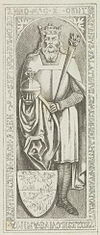
|
1107 First son of Siegfried I and Gertrude of Northeim |
9 March 1113 – 19 March 1124 | County of Weimar-Orlamünde | Irmgard of Henneberg no children |
19 March 1124 aged 16–17 | |
| Albert I the Bear | 
|
c.1100 Son of Otto I and Eilika of Saxony |
9 February 1123 – 18 November 1170 | County of Ballenstedt (with Brandenburg from 1157) |
Sophie of Winzenburg 1124 thirteen children |
18 November 1170 Stendal (possibly) aged 69–70 |
Besides count of Ballenstedt, he was also the first Margrave of Brandenburg (1157). Ruler of the Northern March from 1134, and the county of Weimar-Orlamünde since 1140. |
| Regency of Otto I, Count of Salm (1124-1126) | Also ascended as a minor Left no descendants. The county went to his cousin, Albert the Bear, from Ballenstedt. | ||||||
| Wilhelm von Ballenstedt | 1112 Worms Second son of Siegfried I and Gertrude of Northeim |
19 March 1124 – 13 February 1140 | County of Weimar-Orlamünde | Adelaide no children |
13 February 1140 Cochem aged 27–28 | ||
| Weimar-Orlamünde briefly annexed to Ballenstedt (1140-70) | |||||||
| Otto I | 
|
1128 First son of Albert I and Sophie of Winzenburg |
18 November 1170 – 8 July 1184 | Margraviate of Brandenburg | Judith of Poland 1148 two children Ada of Holland 1175 one child |
8 July 1184 aged 55–56 |
Children of Albert I, divided their inheritance. After Adalbert and Dietrich's childless deaths, their possessions were inherited by the younger brother, Bernard. |
| Herman I | 1130 Second son of Albert I and Sophie of Winzenburg |
18 November 1170 – 19 October 1176 | County of Weimar-Orlamünde | Irmgard two children |
19 October 1176 aged 45–46 | ||
| Adalbert (III) | 1136 Fourth son of Albert I and Sophie of Winzenburg |
18 November 1170 – 1171 | County of Ballenstedt (at Aschersleben) |
Unmarried | 1171 aged 34–35 | ||
| Theodoric | 1137 Fifth son of Albert I and Sophie of Winzenburg |
18 November 1170 – 1183 | County of Ballenstedt (at Burgwerben) |
1183 aged 45–46 | |||
| Bernard (I) | 
|
1140 Sixth son of Albert I and Sophie of Winzenburg |
18 November 1170 – 2 February 1212 | County of Anhalt (with Ballenstedt and Saxony) |
Brigitte of Denmark one child Judith of Greater Poland c.1173 five children Sophia of Thuringia one child |
2 February 1212 Bernburg aged 71–72 | |
| Aschersleben and Burgwerben annexed to Anhalt | |||||||
| Siegfried III | 1155 Son of Herman I and Irmgard |
19 October 1176 – 1206 | County of Weimar-Orlamünde | Sophia of Denmark c.1180 three children |
1206 aged 50–51 |
||
| Otto II the Generous | 
|
c.1150 First son of Otto I and Judith of Poland |
8 July 1184 – 4 July 1205 | Margraviate of Brandenburg | Unmarried | 4 July 1205 aged 54–55 |
Elder children of Otto I, both left no descendants. The patrimony was inherited by their half-brother, Albert II. |
| Henry | c.1150? Second son of Otto I and Judith of Poland |
8 July 1184 – 1192 | Margraviate of Brandenburg (at Gardelegen) |
Unmarried | 1192 aged 41–42? | ||
| Albert II | 
|
1177 Son of Otto I and Ada of Holland |
4 July 1205 – 25 February 1220 | Margraviate of Brandenburg | Matilda of Lusatia 1205 four children |
25 February 1220 aged 42–43 |
|
| Albert II | 1182 First son of Siegfried III and Sophia of Denmark |
1206 – 22 October 1245 | County of Weimar-Orlamünde (at Nordhalben) |
Unmarried | 22 October 1245 aged 62–63 |
Children of Siegfried III, divided their inheritance, which was soon reunited by Herman II. | |
| Herman II | 
|
1184 Second son of Siegfried III and Sophia of Denmark |
1206 – 27 December 1247 | County of Weimar-Orlamünde (at Orlamünde) |
Beatrix of Andechs-Merania c.1230 six children |
27 December 1247 aged 62–63 | |
| Otto II | c.1185 Third son of Siegfried III and Sophia of Denmark |
1206–1211 | County of Weimar-Orlamünde (at Weimar) |
Unmarried | 1211 aged 25–26 | ||
| Nordhalben and Weimar rejoined Orlamünde | |||||||
| Henry I | 
|
c.1173 First son of Bernard (I) and Judith of Greater Poland |
2 February 1212 – 1252 | County of Anhalt (until 1218) Principality of Anhalt (from 1218) |
Irmgard of Thuringia 1211 eleven children |
1252 aged 78–79 |
Children of Bernard, divided their inheritance. In 1218 Henry becomes Prince of Anhalt, which after his death is divided by his sons. |
| Albert I | 
|
c.1175 Second son of Bernard (I) and Judith of Greater Poland |
2 February 1212 – 7 October 1260 | Duchy of Saxony | Agnes of Austria 1222 five children Agnes of Thuringia 1238 three children Helene of Brunswick-Lüneburg 1247 five children |
7 October 1260 aged 84–85 | |
| Regencies of Henry I, Count of Anhalt (1220–1225), Albert I, Archbishop of Magdeburg (1220–1221) and Matilda of Lusatia (1221–1225) | Children of Albert II, ruled jointly, but their children divided the margraviate. | ||||||
| John I | 
|
1213 First son of Albert II and Matilda of Lusatia |
25 February 1220 – 4 April 1266 | Margraviate of Brandenburg | Sophie of Denmark 1230 six children Judith of Saxony 1255 four children |
4 April 1266 Stendal aged 52–53 | |
| Otto III the Pious | 1215 Second son of Albert II and Matilda of Lusatia |
25 February 1220 – 9 October 1267 | Beatrice of Bohemia 1243 six children |
9 October 1267 Brandenburg an der Havel aged 51–52 | |||
| Herman III the Popular | c.1230 Second son of Herman II and Beatrix of Andechs-Merania |
27 December 1247 – 1283 | County of Orlamünde | Unknown four children |
1283 aged 52–23 |
Children of Herman II, divided their inheritance. | |
| Otto III the Magnificent | 
|
1236 Third son of Herman II and Beatrix of Andechs-Merania |
27 December 1247 – 13 May 1285 | County of Weimar | Agnes of Leiningen (c. 1230/40-13 May 1285) 1266 four children |
13 May 1285 aged 48–49 | |
| Albert III | c.1240 Fourth son of Herman II and Beatrix of Andechs-Merania |
27 December 1247 – 1283 | County of Weimar | Unmarried | 1283 aged 42–43 | ||
| Sophia | c.1240 Daughter of Herman II and Beatrix of Andechs-Merania |
27 December 1247 – 1270 | County of Weimar-Orlamünde (at Regnitzland) |
Henry VIII Reuss, Lord of Weida 19 July 1258 three children |
c.1270 aged 29–30 | ||
| Henry II the Fat | 
|
1215 First son of Henry I and Irmgard of Thuringia |
1252 – 12 June 1266 | Principality of Aschersleben | Matilda of Brunswick-Lüneburg 1245 two children |
12 June 1266 aged 50–51 |
Children of Henry I, divided their inheritance. |
| Bernard I | 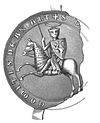
|
1218 Second son of Henry I and Irmgard of Thuringia |
1252–1287 | Principality of Bernburg | Sophia of Denmark 3 February 1258 Hamburg six children |
1287 aged 68–69 | |
| Siegfried I | 1230 Seventh son of Henry I and Irmgard of Thuringia |
1252 – 25 March 1298 | Principality of Zerbst | Catherine of Sweden 17 October 1259 ten children |
25 March 1298 Köthen aged 67–68 | ||
| John I | 1249 Wittenberg First son of Albert I and Helene of Brunswick-Lüneburg |
7 October 1260 – 1282 | Duchy of Saxony (Since 1296 in Saxe-Wittenberg) |
Ingeborg Birgersdotter of Sweden 1270 eight children |
30 July 1285 Wittenberg aged 35–36 |
Ruled jointly; and associated his nephews to the joint rulership after his brothers death. However, these three nephews divided the land with him. Albert II retained Saxe-Wittenberg, and became the head of the Elder Saxon Line; Albert III, Eric I and John II ruled together in Saxe-Lauenburg, becoming the founders of the Younger Saxon Line. | |
| Albert II | 
|
1250 Wittenberg Second son of Albert I and Helene of Brunswick-Lüneburg |
7 October 1260 – 25 August 1298 | Agnes-Gertrude of Austria 1282 six children |
25 August 1298 Aken aged 35–36 | ||
| In 1296 Albert II and his nephews (Albert III, Eric I, and John II) ended their joint rule and divided Saxony into the Lauenburg line, where Albert III, Eric I, and John II continued to rule jointly until 1303, and the Wittenberg line, where Albert II continued as sole ruler until 1298. Since the Duke of Saxony was considered one of the prince-electors electing a new Holy Roman Emperor, conflict arose between the lines of Lauenburg and Wittenberg over the issue of who should cast Saxony's vote. In 1314 both lines found themselves on different sides in a double election. Eventually, the Dukes of Saxe-Wittenberg succeeded in 1356 after the promulgation of the Golden Bull. To distinguish him from other rulers bearing the title Duke of Saxony, he was commonly called Elector of Saxony. | |||||||
| Regency of Matilda of Brunswick-Lüneburg (1266–1270) | Children of Henry II, ruled jointly, first under their mother, who was elected Abbess of Gernrode in 1275. In 1283, Henry renounced his rights in Otto's favor, and later became Archbishop of Magdeburg. | ||||||
| Otto I | 
|
c.1245 First son of Henry II and Matilda of Brunswick-Lüneburg |
12 June 1266 – 25 June 1304 | Principality of Aschersleben | Hedwig of Wrocław 1283 three children |
25 June 1304 aged 58–59 | |
| Henry III | c.1245 Second son of Henry II and Matilda of Brunswick-Lüneburg |
12 June 1266 – 1283 | Unmarried | 9 November 1307 aged 61–62 | |||
| John II | 
|
1237 First son of John I and Sophie of Denmark |
9 October 1267 – 10 September 1281 | Margraviate of Stendal (at Krossen) |
Hedwig of Werle (1243–1287) 1249 two children |
10 September 1281 aged 43–44 |
Children of John I. Despite co-rulership between them, they received different parts in the Margraviate to rule (alone or in co-rulership):
|
| Otto IV of the Arrow | 
|
1238 Second son of John I and Sophie of Denmark |
9 October 1267 – 27 November 1308 | Margraviate of Stendal (at Stendal) |
Heilwig of Holstein-Kiel (d.1305) 1279 no children Judith of Henneberg-Schleusingen (d.1315) 1308 no children |
27 November 1308 aged 69–70 | |
| Conrad I | 
|
1240 Third son of John I and Sophie of Denmark |
9 October 1267 – 1304 | Margraviate of Stendal (at Neumark) |
Constance of Greater Poland 1260 Santok three children |
1304 Chorin aged 63–64 | |
| Otto VII | 
|
c.1265 Second son of Conrad I and Constance of Greater Poland |
1291–1297 | Unmarried | 1297 aged 31–32 | ||
| John III of Prague | 
|
6 April 1244 Prague First son of Otto III and Beatrice of Bohemia |
9 October 1267 – 8 April 1268 | Margraviate of Salzwedel (at Salzwedel) |
Unmarried | 8 April 1268 Merseburg aged 24 |
Children of Otto III. Despite co-rulership between them, they received different parts in the Margraviate to rule (alone or in co-rulership):
|
| Otto V the Tall | 1246 Prague Second son of Otto III and Beatrice of Bohemia |
9 October 1267 – July 1299 | Judith of Henneberg-Coburg 22 October 1268 Freiburg four children |
July 1299 aged 52–53 | |||
| Otto VI the Short | 
|
3/17 November 1264 Fourth son of Otto III and Beatrice of Bohemia |
9 October 1267 – 1286 | Hedwig of Austria February 1279 Vienna no children |
6 July 1303 Lehnin aged 38 | ||
| Albert III | 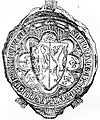
|
c.1250 Third son of Otto III and Beatrice of Bohemia |
9 October 1267 – 1300 | Margraviate of Salzwedel (at Stargard) |
Matilda of Denmark 1268 four children |
1300 aged 49–50 | |
| Conrad II | 1261 Son of John II and Hedwig of Werle |
10 September 1281 – 1308 | Margraviate of Stendal (at Krossen) |
Unmarried | 1308 aged 46–47 |
With his childless death his land reverted to Stendal. | |
| Krossen re-annexed to Stendal | |||||||
| Henry I | c. 1270 First son of Herman III |
1283 – 26 March 1354 | County of Orlamünde | Irmgard of Schwarzburg-Blankenburg 26 July 1313 two children |
26 March 1354 aged 83–84? |
Children of Herman III, divided their inheritance. | |
| Herman V | c. 1270 Second son of Herman III |
1283–1312 | Unmarried | 1312 aged 41–42? | |||
| Elisabeth (I) the Elder | 1265 Daughter of Herman III |
1283–1327 | County of Orlamünde (at Nordhalben) |
Hartmann XI, Count of Lobdeburg-Arnshaugk one child Albert II, Margrave of Meissen 1 October 1290 no children |
1327 aged 56–57 | ||
| Herman IV | 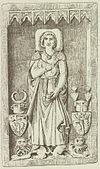
|
c. 1270 First son of Otto III and Agnes of Leiningen |
13 May 1285 – 1319 | County of Weimar | Matilda of Rabenswald (d.1339) 24 November 1290 four children |
1319 aged 48–49 |
Children of Otto III, divided their inheritance. |
| Otto IV the Younger | 
|
1279 Second son of Otto III and Agnes of Leiningen |
13 May 1285 – 1318 | County of Plassenburg | Adelaide of Kafernburg (d.c.1305) 14 December 1296 one child Catherine of Hesse (1286–1322) 1308 one child |
1318 aged 38–39 | |
| John I | 1258 First son of Bernard I and Sophia of Denmark |
1287 – 5 June 1291 | Principality of Bernburg | Unmarried | 5 June 1291 aged 32–33 |
Children of Bernard I, ruled jointly. | |
| Bernard II | 
|
1260 Third son of Bernard I and Sophia of Denmark |
1287 – 1323 | Helena of Rügen 27 December 1302 three children |
1323 aged 62–63 | ||
| John II | 1275 First son of John I and Ingeborg Birgersdotter of Sweden |
20 September 1296 – 22 April 1322 | Duchy of Mölln (in co-rulership in Lauenburg until 1303) |
Elizabeth of Holstein-Rendsburg 1315 one child |
22 April 1322 Mölln aged 46–47 |
Children of John I, co-ruled first with their uncle Albert II since 1282 (since the death of their father), and in 1296 split the land with him. They retained Lauenburg, which they divided once more. Albert passed the land to his widow, and after her death, in 1315, the territory was realigned: Eric divided Bergdorf with his surviving brother and held all of his brother Albert's inheritance. However, he ended up abdicating to his son, and survived for most of his reign. | |
| Eric I | 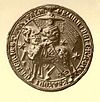
|
1280 Second son of John I and Ingeborg Birgersdotter of Sweden |
20 September 1296 – 1338 | Duchy of Bergedorf (in co-rulership in Lauenburg until 1303; in Bergedorf 1303–1315) Duchy of Ratzeburg (from 1315) |
Elisabeth of Pomerania 1316 or 1318 four children |
1360 Nienburg aged 79–80 | |
| Albert III | 1281 Third son of John I and Ingeborg Birgersdotter of Sweden |
20 September 1296 – 1308 | Duchy of Ratzeburg (in co-rulership in Lauenburg until 1303) |
Margaret of Brandenburg-Salzwedel 1302 two children |
1308 aged 26–27 | ||
| Margaret of Brandenburg-Salzwedel | 1270 Second daughter of Albert III, Margrave of Brandenburg-Salzwedel and Matilda of Denmark |
1308 – 1 May 1315 | Duchy of Ratzeburg | Przemysł II, King of Poland 1302 two children Albert III 1302 two children |
1 May 1315 Ratzeburg aged 44–45 | ||
| In 1315, after the death of Margaret of Brandenburg, the remaining brothers Eric and John redesigned the political division in Saxe-Lauenburg; Eric retained all of Margaret's part, but had to give part of his original domains to his brother. | |||||||
| Albert I | c.1260 Son of Siegfried I and Catherine of Sweden |
25 March 1298 – 17 August 1316 | Principality of Zerbst | Liutgard of Holstein-Itzehoe after 1277 two children Agnes of Brandenburg-Stendal 1300 five children |
17 August 1316 aged 55–56 |
||
| Rudolph I (Rudolf I) |

|
1284 Wittenberg Son of Albert II and Agnes-Gertrude of Austria |
25 August 1298 – 10 January 1356 10 January 1356 – 12 March 1356 |
Duchy of Wittenberg (until 1356) Electorate of Saxony (from 1356) |
Judith of Brandenburg-Salzwedel 1298 eight children Kunigunde of Poland 28 August 1328 one child Agnes of Lindow-Ruppin 1333 three children |
12 March 1356 Wittenberg aged 71–72 |
In January 1356 the Golden Bull confirmed Rudolf I as the legitimate Saxon Prince-Elector, thus the rulers of Saxe-Wittenberg are conceived as Electors of Saxony. |
| The Golden Bull of 1356 confirmed the right to participate in the election of a Holy Roman Emperor to the Duke of Saxony in the Saxe-Wittenberg line. | |||||||
| Herman the Tall | 
|
1275 Son of Otto V and Judith of Henneberg-Coburg |
July 1299 – 1 February 1308 | Margraviate of Salzwedel (at Salzwedel) |
Anne of Austria 1295 Graz four children |
1 February 1308 Lübz aged 32–33 |
Children of Otto V, divided the land. Beatrice's part was then annexed to the Duchy of Świdnica-Jawor. |
| Beatrice (I) | 1270 Daughter of Otto V and Judith of Henneberg-Coburg |
July 1299 – 1316 | Margraviate of Salzwedel (at Upper Lusatia) |
Bolko I, Duke of Świdnica 4 October 1284 Berlin ten children Władysław, Duke of Bytom 21 September 1308 two children |
1316 aged 45–46 | ||
| Upper Lusatia annexed to the Duchy of Świdnica-Jawor | |||||||
| Beatrice (II) | c. 1270 First daughter of Albert III and Matilda of Denmark |
1300 – 22 September 1314 | Margraviate of Salzwedel (at Stargard) |
Henry II, Lord of Mecklenburg 1292 Stargard Castle four children |
22 September 1314 aged 43–44 |
Daughter and heiress of Albert III. Her marriage transferred the Stargard region into the Duchy of Mecklenburg. | |
| Stargard annexed to the Duchy of Mecklenburg | |||||||
| John IV | 
|
1261 First son of Conrad I and Constance of Greater Poland |
1304–1305 | Margraviate of Stendal (at Neumark) |
Unmarried | 1305 aged 43–44 |
Co-ruler of his father since 1291. His childless death reverted his lands to his younger brother Valdemar. |
| Otto II | 
|
c.1260 Son of Otto I and Hedwig of Wrocław |
25 June 1304 – 24 July 1315 | Principality of Aschersleben | Elisabeth of Meissen 24 August 1309 two children |
24 July 1315 aged 54–55 |
After his death in 1315 without male heirs opened a succession crisis in the Principality. |
| Henry I Lackland | 21 March 1256 Son of John I and Judith of Saxony |
27 November 1308 – 14 February 1318 | Margraviate of Stendal (at Delitzsch since 1297; at Stendal since 1308) |
Agnes of Bavaria 1303 three children |
14 February 1318 aged 61 |
Younger brother of John II, Otto IV and Conrad I. Started his co-rulership in 1297, receiving seat at Delitzsch; he ended up as successor of his childless elder brother Otto IV. | |
| Regency of Valdemar, Margrave of Brandenburg-Stendal (1308–1316) | Children of Herman, divided the land:
John's and Agnes' childless deaths left the main core of Salzwedel and the important seat of the Altmark to be reunited in Brandenburg. The remaining possessions were annexed by the respective marriages. | ||||||
| John V the Illustrious | August 1302 Son of Herman and Anne of Austria |
1 February 1308 – 26 March 1317 | Margraviate of Salzwedel (at Salzwedel) |
Unmarried | 26 March 1317 Spandau aged 14 | ||
| Matilda | 1296 First daughter of Herman and Anne of Austria |
1 February 1308 – 31 March 1329 | Margraviate of Salzwedel (at Lower Lusatia) |
Henry IV, Duke of Żagań 5 January 1310 four children |
31 March 1329 aged 32–33 | ||
| Agnes | 
|
1297 Second daughter of Herman and Anne of Austria |
1 February 1308 – 27 November 1334 | Margraviate of Salzwedel (at Altmark) |
Valdemar, Margrave of Brandenburg-Stendal 1309 no children Otto, Duke of Brunswick-Lüneburg 1319 no children |
27 November 1334 Braunschweig aged 36–37 | |
| Judith | 
|
1301 Third daughter of Herman and Anne of Austria |
1 February 1308 – 1353 | Margraviate of Salzwedel (at Coburg) |
Henry VI, Count of Henneberg-Coburg 1 January 1317 or 1 February 1319 five children |
1353 aged 51–52 | |
| Salzwedel and Altmark reunited with Stendal; Coburg returned to the House of Henneberg, and Lower Lusatia was inherited by the Duchy of Żagań | |||||||
| Elisabeth of Meissen | c.1280? Daughter of Frederick of Meissen, Margrave of Dresden and Judith of Schwarzburg-Blankenburg |
24 July 1315 – 1332 | Principality of Aschersleben (in Aschersleben) |
Otto II 24 August 1309 two children |
1332 aged 51–52? |
Succession crisis in Aschersleben: Louis IV, Holy Roman Emperor, supported Bernard II, Prince of Anhalt-Bernburg as successor, but Bernard ended up giving his rights to Aschersleben to the Bishopric of Halberstadt. However, it is known that Otto II's widow inherited Aschersleben as a seat, and that she had to obtain consent of her daughters ("heiresses of the Allodial") and approval of Bernard II of Bernburg for making her donations. This may possibly imply that, at least between Otto II's death (1315) and the definite delivery of Aschersleben to Halberstadt (December 1316), both Otto's minor daughters may have inherited the principality, under regency of the Prince of Bernburg, with Elisabeth receiving its main town as a widow's seat. | |
| Regency of Bernard II, Prince of Anhalt-Bernburg (1315-1316) | |||||||
| Catharina | c.1310 First daughter of Otto II and Elisabeth of Meissen |
24 July 1315 – December 1316 | Principality of Aschersleben (in the remaining principality) |
Herman VI, Count of Weimar 1328 two children |
1369 aged 58–59 | ||
| Elisabeth | c.1310 Second daughter of Otto II and Elisabeth of Meissen |
Unmarried | 1319 aged 8–9 | ||||
| The whole Principality was definitively annexed by the Bishopric of Halberstadt | |||||||
| Regency of Valdemar, Margrave of Brandenburg-Stendal (1316-1319) | Albert III and Valdemar I ruled jointly, as sons of Albert II. In 1359 Albert II associated his eldest son, Albert III, but he predeceased him. | ||||||
| Albert II | c.1305 First son of Albert I and Agnes of Brandenburg-Stendal |
17 August 1316 – 17 July 1362 | Principality of Zerbst | Agnes of Rügen 2 September 1324 no children Beatrice of Saxe-Wittenberg c.1337 five children |
17 July 1362 aged 56–57 | ||
| Valdemar I | c.1305 Second son of Albert I and Agnes of Brandenburg-Stendal |
17 August 1316 – 7 January 1368 | Elisabeth of Saxe-Wittenberg 22 June 1344 six children Beatrice d'Este 1365 no children |
7 January 1368 aged 62–63 | |||
| Albert III | c.1337 First son of Albert II and Beatrice of Saxe-Wittenberg |
1359 – 1 August 1359 | Unmarried | 1 August 1359 aged 21–22 | |||
| Valdemar the Great | 
|
1280 Third son of Conrad I and Constance of Greater Poland |
1305 – 14 February 1318 | Margraviate of Stendal (at Neumark) |
Agnes of Brandenburg-Salzwedel 1309 no children |
14 August 1319 Mieszkowice aged 38–39 |
Son of Conrad, co-ruled with his uncles since 1308. Left no descendants, and the margraviate went to his underage cousin. |
| 14 February 1318 – 14 August 1319 | Margraviate of Brandenburg | ||||||
| Otto VI | 
|
1297 Son of Otto IV and Adelaide of Kafernburg |
1318 – 28 July 1340 | County of Plassenburg | Kunigunde of Leuchtenberg 1321 no children |
28 July 1340 aged 42–43 |
Left no descendants. After his death his possessions were annexed by the House of Hohenzollern. |
| Plassenburg annexed to the House of Hohenzollern | |||||||
| Frederick I the Elder | 
|
c.1290 First son of Herman IV and Matilda of Rabenswald |
1319 – 25 July 1365 | County of Weimar | Elisabeth of Meissen (d. 2 May 1347) 1322 three children |
25 July 1365 aged 74–75 |
Children of Herman IV, divided their inheritance. |
| Otto V | c.1290 Third son of Herman IV and Matilda of Rabenswald |
1319 – 12 March 1335 | County of Lauenstein | Helena of Nuremberg 1321 three children |
12 March 1335 aged 44–45 | ||
| Regency of Wartislaw IV, Duke of Pomerania (1319–1320) | Children of Henry I, divided their inheritance. Henry died as a minor, and the Brandenburg Ascanians were extinct in the male line. Their lands came under the control of the Emperor Louis IV of the House of Wittelsbach, who granted Brandenburg to his eldest son, Louis V of Bavaria.
For Sophia, she inherited the Margraviate of Landsberg, which was inherited by her sons. | ||||||
| Henry II the Child | 
|
1302 Son of Henry I and Agnes of Bavaria |
14 August 1319 – July 1320 | Margraviate of Brandenburg | Unmarried | July 1320 Mieszkowice aged 17–18 | |
| Sophia | 1300 Daughter of Henry I and Agnes of Bavaria |
14 August 1319 – 1356 | Margraviate of Brandenburg (at Landsberg) |
Magnus I, Duke of Brunswick-Lüneburg 1327 eight children |
1356 aged 55–56 | ||
| Brandenburg definitively annexed to the House of Wittelsbach; Landsberg definitely annexed to the House of Welf | |||||||
| Regency of Elizabeth of Holstein-Rendsburg (1322–1330) | |||||||
| Albert IV | 1315 Son of John II and Elizabeth of Holstein-Rendsburg |
1322–1343 | Duchy of Mölln | Beata of Schwerin 1334 three child Sophia of Werle-Güstrow 1341 no children |
1343 aged 27–28 | ||
| Bernard III | 
|
1300 Son of Bernard II and Helena of Rügen |
1323 – 20 August 1348 | Principality of Bernburg | Agnes of Saxe-Wittenberg 1328 five children Matilda of Anhalt-Zerbst 1339 no children Matilda of Brunswick-Wolfenbüttel 1343 two children |
20 August 1348 aged 47–48 |
|
| Frederick II | c.1321 Son of Otto V and Helena of Nuremberg |
12 March 1335 – 14 October 1368 | County of Lauenstein | Sophia of Schwarzburg-Blankenburg (d.1392) 18 November 1357 two children |
14 October 1368 aged 46–47 |
||
| Eric II | 1318 Ratzeburg Son of Eric I and Elisabeth of Pomerania |
1338–1368 | Duchy of Ratzeburg | Agnes of Holstein-Plön between 1342 and 1349 four children |
1368 Ratzeburg aged 49–50 |
||
| Regency of Sophia of Werle-Güstrow (1343-1349) | Left no descendants. He was succeeded by his brother, Albert. | ||||||
| John III | c.1335 First son of Albert IV and Beata of Schwerin |
1343–1356 | Duchy of Mölln | Unmarried | 1356 aged 20–21 | ||
| Bernard IV | 
|
c.1330 First son of Bernard III and Agnes of Saxe-Wittenberg |
20 August 1348 – 28 June 1354 | Principality of Bernburg | Unmarried | 28 June 1354 aged 23–24 |
|
| Frederick III | c.1320 First son of Henry I and Irmgard of Schwarzburg-Blankenburg |
26 March 1354 – 1379 | County of Orlamünde (at Schauenforst) |
Unknown two children |
1379 aged 58–59 |
Children of Henry I, ruled jointly. In 1354, Orlamunde was annexed to the House of Wettin, and the family changed seat to Schauenforst, while Frederick's brother Henry II ruled from Droyssig. After Henry's death, Frederick reunited Orlamunde. | |
| Henry II | c.1320 Second son of Henry I and Irmgard of Schwarzburg-Blankenburg |
26 March 1354 – 1357 | County of Orlamünde (at Droyssig) |
Richeza of Henneberg (d.1379) 1357 one child |
1357 aged 36–37 | ||
| Henry IV | c.1330 Second son of Bernard III and Agnes of Saxe-Wittenberg |
28 June 1354 – 7 July 1374 | Principality of Bernburg | Sophia of Stolberg c.1345 three children |
7 July 1374 aged 43–44 |
Unlike usual co-rulerships seen in the family, Henry was bypassed by his older brother Bernard, who ruled alone. He only assumed rule of the principality when Bernard died in 1354. | |
| Albert V | c.1335 Second son of Albert IV and Beata of Schwerin |
1356–1370 | Duchy of Mölln | Catherine of Werle-Güstrow 25 January 1366 no children |
1370 aged 34–35 |
Left no descendants. He was succeeded by his brother, Eric. | |
| Rudolph II the Blind (Rudolf II. der Blinde) |

|
1307 Wittenberg Son of Rudolph I and Judith of Brandenburg-Salzwedel |
12 March 1356 – 6 December 1370 | Electorate of Saxony | Elisabeth of Hesse (d.1354) 1336 three children Elisabeth of Lindow-Ruppin c.1355? no children |
6 December 1370 Wittenberg aged 62–63 |
Left no descendants. He was succeeded by his half-brother. |
| Herman VI | c.1290? Second son of Herman IV and Matilda of Rabenswald |
25 July 1365 – 1372 | County of Weimar | Catherine of Anhalt (d. 15 April 1369) 1328 two children |
1372 aged 81–82? |
Uncle and nephew possibly ruled jointly. After Herman's death Weimar was annexed to the House of Wettin. | |
| Frederick IV the Younger | c.1325 Son of Frederick I and Elisabeth of Meissen |
Irmgard no children |
1381 aged 55–56 | ||||
| Definitively annexed to the House of Wettin | |||||||
| Otto VII | 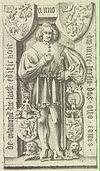
|
c.1360 Son of Frederick II and Sophia of Schwarzburg-Blankenburg |
14 October 1368 – 1405 | County of Lauenstein | Liutgard Reuss of Gera (d.c.1410) c.1390 six children |
1405 Ludwigsstadt aged 44–45 |
|
| John II | c.1340 Second son of Albert II and Beatrice of Saxe-Wittenberg |
7 January 1368 – 11 April 1382 | Principality of Zerbst | Elisabeth of Henneberg-Schleusingen 1366 four children |
11 April 1382 aged 41–42 |
Double cousins, ruled jointly. | |
| Valdemar II | c.1345 Son of Valdemar I and Elisabeth of Saxe-Wittenberg |
7 January 1368 – 1371 | Unmarried | 1371 aged 25–26 | |||
| Wenceslaus | 
|
1337 Wittenberg Son of Rudolph I and Agnes of Lindow-Ruppin |
6 December 1370 – 15 May 1388 | Electorate of Saxony | Cecilia da Carrara 23 January 1376 six children |
15 May 1388 Celle aged 50–51 |
Brother of his predecessor. In 1370, jointly with his nephew Albert, he managed to acquire the Principality of Lüneburg. This conquer was lost after his death. |
| Eric III | 
|
c.1335 Third son of Albert IV and Beata of Schwerin |
1370 – 25 May 1401 | Duchy of Mölln | Unmarried | 25 May 1401 Ratzeburg aged 65–66? |
Determined to enter to clergy, has to resign to succeed his brothers. He also left no descendants, which allowed the Ratzeburg line to reunite the Duchy of Lauenburg. |
| Mölln was annexed to Ratzeburg; Reunion of Lauenburg | |||||||
| Otto III | c.1345 Son of Bernard III and Matilda of Brunswick-Wolfenbüttel |
7 July 1374 – 27 February 1404 | Principality of Bernburg | Unknown two children Lutrudis before 1391 one child |
27 February 1404 aged 58–59 |
||
| Frederick V | c.1360? Son of Frederick III |
1379–1405 | County of Orlamünde (at Droyssig) |
Catherine of Gleichen c.1380? two children |
c.1405 aged 44–45 |
Changed seat once more to Droyssig. | |
| Sigismund I | c.1370 First son of John II and Elisabeth of Henneberg-Schleusingen |
11 April 1382 – 19 January 1405 | Principality of Dessau (in co-rulership in Zerbst until 1396) |
Judith of Querfurt 1386 eleven children |
19 January 1405 Coswig aged 34–35 |
Sons of John II. Ruled jointly until 1396, when they divided their inheritance. | |
| Albert IV | c.1370 Second son of John II and Elisabeth of Henneberg-Schleusingen |
11 April 1382 – 24 November 1423 | Principality of Köthen (in co-rulership in Zerbst until 1396) |
Elisabeth of Mansfeld (I) before 1398 six children Elisabeth of Querfurt before 4 January 1419 three children |
24 November 1423 Coswig aged 52–53 | ||
| Valdemar III | c.1370 Third son of John II and Elisabeth of Henneberg-Schleusingen |
11 April 1382 – 1391 | Principality of Zerbst | Unmarried | 1391 aged 20–21? | ||
| Zerbst divided between Kothen and Dessau | |||||||
| Rudolph III | 
|
1378 Wittenberg First son of Wenceslaus and Cecilia da Carrara |
15 May 1388 – 11 June 1419 | Electorate of Saxony | Anna of Meissen 1387/89 three children Barbara of Legnica March 1396 two children |
11 June 1419 in Bohemia (Prague (?)) aged 40–41 |
Left no male descendants. he was succeeded by his brother, Albert. |
| Eric IV | 1354 Ratzeburg Son of Eric II and Agnes of Holstein-Plön |
1368 – 25 May 1401 | Duchy of Ratzeburg | Sophia of Brunswick-Lüneburg 8 April 1373 ten children |
21 June 1412 Ratzeburg aged 57–58 |
In 1401 reunited Saxe-Lauenburg. | |
| 25 May 1401 – 21 June 1412 | Duchy of Lauenburg | ||||||
| In 1401 the Ratzeburg line inherited the duchy of Mölln and reunited the Duchy of Lauenburg. | |||||||
| Bernard V | c.1350 Son of Henry IV and Sophia of Stolberg |
27 February 1404 – 24 June 1420 | Principality of Bernburg | Elisabeth of Hohnstein-Kelbra 8 September 1396 one child |
24 June 1420 aged 69–70? |
Cousins, ruled jointly. As neither of them left male heirs, the land was inherited by his other cousin, Bernard. | |
| Otto IV | c.1380? First son of Otto III |
27 February 1404 – 1 May 1415 | Unmarried | 1 May 1415 aged 34–35? | |||
| Valdemar IV | c.1386 First son of Sigismund I and Judith of Querfurt |
19 January 1405 – 1417 | Principality of Dessau | Unmarried | 1417 aged 30–31 |
Sons of Sigismund I, ruled jointly. In 1468 inherited Anhalt-Bernburg. | |
| George I the Elder | 1390 Second son of Sigismund I and Judith of Querfurt |
19 January 1405 – 22 September 1474 | Matilda of Anhalt-Bernburg I after 1413 no children Euphemia of Oleśnica 1432 six children Sophia of Hohnstein after 1442 three children Anna of Lindow-Ruppin 7 September 1453 nine children |
21 September 1474 Dessau aged 83–84? | |||
| Sigismund II | c.1390 Fourth son of Sigismund I and Judith of Querfurt |
19 January 1405 – 1452 | Matilda of Anhalt-Bernburg II no children |
1452 aged 61–62 | |||
| Albert V | c.1390 Fifth son of Sigismund I and Judith of Querfurt |
19 January 1405 – 1469 | Sophie of Hadmersleben no children |
1469 aged 78–79 | |||
| William | c.1395 First son of Otto VII and Liutgard Reuss of Gera |
1405 – 3 March 1460 | County of Lauenstein | Catherine of Blankenhain 1427 two children |
3 March 1460 aged 64–65? |
Children of Otto VII, divided their inheritance, which was progressively annexed to the House of Wettin. Elisabeth's part of Lauenstein went to the House of Schwarzburg. | |
| Elisabeth (II) | c.1395 Daughter of Otto VII and Liutgard Reuss of Gera |
1405–1450 | Henry XVIII, Count of Schwarzburg-Blankenburg no children |
c.1450 aged 54–55? | |||
| Otto VIII | c.1395 Second son of Otto VII and Liutgard Reuss of Gera |
1405 – 30 March 1460 | County of Lauenstein (at Grafenthal) |
Agnes of Beichlingen (d. 2 May 1347) 1322 three children |
30 March 1460 aged 64–65? | ||
| Sigismund | c.1395 Third son of Otto VII and Liutgard Reuss of Gera |
1405 – 2 July 1447 | County of Lauenstein (at Lichtenberg) |
Unmarried | 2 July 1447 aged 51–52? | ||
| Definitively annexed to the House of Wettin | |||||||
| Henry III | c.1390? First son of Frederick V and Catherine of Gleichen |
1405–1423 | County of Orlamünde (at Droyssig) |
Unmarried | 1423 aged 32–33? |
Children of Frederick V, ruled jointly. After their childless deaths their possessions were annexed by the House of Wettin. | |
| Martin | c.1390? Second son of Frederick V and Catherine of Gleichen |
1405 | 1405 aged 14–15? | ||||
| Definitively annexed to the House of Wettin | |||||||
| Eric V | c.1375 Ratzeburg First son of Eric IV and Sophia of Brunswick-Lüneburg |
21 June 1412 – 1436 | Duchy of Lauenburg | Elisabeth of Holstein-Rendsburg 1404 no children Elisabeth of Weinsberg before 1422 one child |
1436 Ratzeburg aged 60–61 |
Children of Eric IV, ruled jointly. | |
| John IV | c.1375 Ratzeburg Second son of Eric IV and Sophia of Brunswick-Lüneburg |
21 June 1412 – 1414 | Unmarried | 1414 Ratzeburg aged 38–39 | |||
| Albert III | 
|
1380 Wittenberg Second son of Wenceslaus and Cecilia da Carrara |
11 June 1419 – 1422 | Electorate of Saxony | Euphemia of Oleśnica 14 January 1420 no children |
1422 Wittenberg aged 41–42 |
Left no male descendants, which led the Ascanian Saxe-Wittenberg line to extinction. |
| The Ascanian Dynasty became extinct in Wittenberg in 1422. However, the dynasty's presence in Saxony continued, through the Duchy of Lauenburg, until 1689. After losing the Saxon Electorate to the Wittenberg line in 1356, and failing to obtain it again in 1422, the recognition of power of this Lauenburg line as Dukes of Saxony weakened. To follow the remnant House of Ascania in Saxe-Lauenburg, follow this table. For the following Electors of Saxony, see Rulers of Saxony. | |||||||
| Bernard VI | c.1390? Second son of Otto III |
24 June 1420 – 2 February 1468 | Principality of Bernburg | Matilda of Querfurt-Burgscheidungen 21 October 1419 two children Hedwig of Żagań 11 March 1434 no children |
2 February 1468 aged 77–78? |
His children predeceased him, which left him with no heirs at his death in 1468. Bernburg was inherited by the Dessau line. | |
| Anhalt-Bernburg was annexed to Anhalt-Dessau | |||||||
| Adolph I | c.1400 First son of Albert IV and Elisabeth of Mansfeld (I) |
24 November 1423 – 28 August 1473 | Principality of Köthen | Cordula of Lindow-Ruppin 2 November 1442 Ruppin seven children |
28 August 1473 Zerbst aged 72–73? |
Ruled jointly. Adolph ruled with his brother Valdemar V until 1436 and then with Valdemar's son John. In 1436, shortly after his father's death, John III renounced his rights to the principality. In 1471, Adolph concluded a succession contract with George I, Prince of Anhalt-Dessau, which would put the latter's youngest son in Köthen's throne as Valdemar VI. | |
| Valdemar V | c.1400 Second son of Albert IV and Elisabeth of Mansfeld (I) |
24 November 1423 – 1436 | Sophie of Hadmersleben 1420 no children |
1436 aged 35–36? | |||
| John III | c.1415? Son of Valdemar V and Sophie of Hadmersleben |
1436 | Unmarried | 1463 aged 47–48? | |||
| Bernard II | 1385 Ratzeburg Third son of Eric IV and Sophia of Brunswick-Lüneburg |
1436 – 16 July 1463 | Duchy of Lauenburg | Adelaide of Pomerania-Stolp 2 February 1429 two children |
16 July 1463 Ratzeburg aged 77–78 |
||
| John V | 18 July 1439 Ratzeburg Son of Bernard II and Adelaide of Pomerania-Stolp |
16 July 1463 – 15 August 1507 | Duchy of Lauenburg | Dorothea of Brandenburg 12 February 1464 twelve children |
15 August 1507 Ratzeburg aged 68 |
||
| Valdemar VI | 1450 Son of George I, Prince of Anhalt-Dessau and Sophia of Hohnstein |
28 August 1473 – 1 November 1508 | Principality of Köthen | Margaret of Schwarzburg-Arnstadt 24 January 1485 Köthen four children |
1 November 1508 Köthen aged 57–58 |
After the contract established with Dessau, this line of princes dominated in Köthen. After the death of Adolph in 1473, George I of Dessau's sons, Valdemar VI and Albert VI, ascended to the principality. After Albert's death, Valdemar co-ruled with his nephews. In 1508, all his co-rulers abdicated to him. | |
| Albert VI | c.1420 Son of Albert IV and Elisabeth of Querfurt |
28 August 1473 – 9 January 1475 | Elisabeth of Mansfeld (II) 27 March 1454 Alsleben seven children |
9 January 1475 aged 54–55 | |||
| Philip | 31 May 1468 Son of Albert VI and Elisabeth of Mansfeld (II) |
9 January 1475 – 13 November 1500 | Unmarried | 13 November 1500 aged 32 | |||
| Magnus | 1455 Third son of Adolph I and Cordula of Lindow-Ruppin |
28 August 1473 – 1508 | 29 October 1524 aged 68–69 | ||||
| Adolph II | 16 October 1458 Fifth son of Adolph I and Cordula of Lindow-Ruppin |
24 March 1526 Merseburg aged 67 | |||||
| Ernest I | 1454 First son of George I and Anna of Lindow-Ruppin |
21 September 1474 – 12 June 1516 | Principality of Dessau | Margaret of Münsterberg 20 January 1494 Cottbus four children |
12 June 1516 Dessau aged 61–62 |
Sons of George I, co-ruled jointly with their father since 1471, and continued the joint rule after his death. | |
| George II the Strong | 1454Second son of George I and Anna of Lindow-Ruppin | 1474 – 25 April 1509 | Agnes of Pomerania-Barth 1478 no children |
25 April 1509 aged 54–55 | |||
| Sigismund III | 1456 Third son of George I and Anna of Lindow-Ruppin |
21 September 1474 – 27 November 1487 | Unmarried | 27 November 1487 Dessau aged 30–31 | |||
| Rudolph the Valiant | 1466 Fourth son of George I and Anna of Lindow-Ruppin |
21 September 1474 – 7 September 1510 | 7 September 1510 aged 43–44 | ||||
| Magnus I | 
|
1 January 1470 Ratzeburg Son of John V and Dorothea of Brandenburg |
15 August 1507 – 1 August 1543 | Duchy of Lauenburg | Catherine of Brunswick-Wolfenbüttel 20 November 1509 Wolfenbüttel six children |
1 August 1543 Ratzeburg aged 73 |
|
| Wolfgang the Confessor | 
|
1 August 1492 Köthen Son of Valdemar VI and Margaret of Schwarzburg-Arnstadt |
1 November 1508 – 23 March 1566 | Principality of Köthen (at Coswig only, since 1562) |
Unmarried | 23 March 1566 Zerbst aged 73 |
Sole ruler of Köthen. In 1562, without descendants, he abdicated of all his territories, with the sole exception of Coswig (which he kept until his death) to the recreated Principality of Zerbst. |
| Köthen (and later Coswig) annexed to Zerbst | |||||||
| Regency of Margaret of Münsterberg (1516–1524) | Children of Ernest I, ruled jointly, firstly under their mother. In 1544, the brothers divided the land. Joachim mainteined Dessau to himself; John took Zerbst and refounded Anhalt-Zerbst; George took Plotzkau. After George and Joachim's deaths without descendants, their lands were inherited by their nephews, sons of John III. | ||||||
| John V | 
|
4 September 1504 Dessau Second son of Ernest I and Margaret of Münsterberg |
12 June 1516 – 4 February 1551 | Principality of Zerbst (in co-rulership in Dessau until 1544)) |
Margaret of Brandenburg 15 February 1534 Dessau six children |
4 February 1551 Zerbst aged 46 | |
| George III the God-Blessed | 
|
15 August 1507 Dessau Third son of Ernest I and Margaret of Münsterberg |
12 June 1516 – 17 October 1553 | Principality of Dessau (in co-rulership until 1544; at Plotzkau since 1544) |
Unmarried | 17 October 1553 Dessau aged 46 | |
| Joachim I | 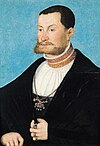
|
7 August 1509 Dessau Fourth son of Ernest I and Margaret of Münsterberg |
12 June 1516 – 6 December 1561 | Principality of Dessau (in co-rulership until 1544) |
6 December 1561 Dessau aged 52 | ||
| Dessau and Plotzkau annexed to Zerbst | |||||||
| Francis I | 1510 Ratzeburg Son of Magnus I and Catherine of Brunswick-Wolfenbüttel |
1 August 1543 – 1571 1573 – 19 March 1581 |
Duchy of Lauenburg | Sibylle of Saxony 8 February 1540 Dresden nine children |
19 March 1581 Buxtehude aged 70–71 |
In 1571 – highly indebted – Francis I resigned in favour of his eldest son Magnus II, who had promised to redeem the pawned ducal demesnes with funds he gained as Swedish military commander and by his marriage to a Swedish princess. However, after warring with his son and pushing him back, he regained the title. | |
| Charles I | 17 November 1534 Dessau First son of John V and Margaret of Brandenburg |
4 February 1551 – 4 May 1561 | Principality of Zerbst (in co-rulership) |
Anna of Pomerania-Stettin 16 May 1557 Zerbst no children |
4 May 1561 Zerbst aged 26 |
Children of John V, ruled jointly. In 1553 inherited Plotzkau from their uncle George III. In 1561 inherited Dessau and Bernburg from their uncle Joachim. In the next year inherited Kothen. From 1570 Joachim Ernest was the sole owner of all Anhalt. | |
| Joachim Ernest | 
|
21 October 1536 Dessau Second son of John V and Margaret of Brandenburg |
4 February 1551 – 6 December 1586 | Principality of Anhalt (in co-rulership in Zerbst until 1562) |
Agnes of Barby-Mühlingen 3 March 1560 Barby six children Eleonore of Württemberg 9 January 1571 Stuttgart ten children |
6 December 1586 Dessau aged 50 | |
| Bernard VII | 17 March 1540 Dessau Third son of John V and Margaret of Brandenburg |
4 February 1551 – 1 March 1570 | Clara of Brunswick-Lüneburg 28 May 1565 Dessau one child |
1 March 1570 Dessau aged 29 | |||
| Magnus II | 1543 Ratzeburg Second son of Francis I and Sibylle of Saxony |
1571–1573 | Duchy of Lauenburg | Sophia of Sweden 4 July 1568 Stockholm one child |
14 March 1603 Ratzeburg aged 59–60 |
Eldest son of Francis I. He didn't pay the debts he promised to pay and led to war with his father and brothers. Two years later they deposed Magnus II and Francis I re-ascended. Magnus' violent and judicial attempts to regain the duchy failed. In 1588 he was imprisoned for the remainder of his life. | |
| Francis II | 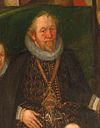
|
10 August 1547 Ratzeburg Third son of Francis I and Sibylle of Saxony |
19 March 1581 – 2 July 1619 | Duchy of Lauenburg | Margaret of Pomerania-Wolgast 26 December 1574 Wolgast four children Maria of Brunswick-Wolfenbüttel 10 November 1582 Wolfenbüttel fourteen children |
2 July 1619 Lauenburg aged 71 |
Brothers of Magnus II, ruled jointly. Francis was vice-regent from 1578, and administrator from 1581. |
| Maurice | 1551 Ratzeburg Fifth son of Francis I and Sibylle of Saxony |
19 March 1581 – 2 November 1612 | Katharina von Spörck 1581 (annulled 1582) no children |
2 November 1612 Buxtehude aged 60–61 | |||
| John George I | 
|
9 May 1567 Harzgerode First son of Joachim Ernest and Agnes of Barby-Mühlingen |
6 December 1586 – 24 May 1618 | Principality of Dessau (in co-rulership in the whole Anhalt until 1603) |
Dorothea of Mansfeld-Arnstein 22 February 1588 Hedersleben five children Dorothea of Palatinate-Simmern 21 February 1595 Heidelberg eleven children |
24 May 1618 Dessau aged 51 |
Sons of Joachim Ernest, ruled jointly. In 1603 divided their inheritance. |
| Christian I | 
|
11 May 1568 Bernburg Second son of Joachim Ernest and Agnes of Barby-Mühlingen |
6 December 1586 – 17 April 1630 | Principality of Bernburg (in co-rulership in the whole Anhalt until 1603) |
Anna of Bentheim-Tecklenburg 2 July 1595 Lorbach sixteen children |
17 April 1630 Bernburg aged 61 | |
| Augustus | 14 July 1575 Dessau Second son of Joachim Ernest and Eleonore of Württemberg |
6 December 1586 – 22 August 1653 | Principality of Plötzkau (in co-rulership in the whole Anhalt until 1603) |
Sibylle of Solms-Laubach 25 January 1618 Ansbach eight children |
22 August 1653 Plötzkau aged 78 | ||
| Rudolph | 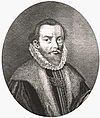
|
28 October 1576 Harzgerode Third son of Joachim Ernest and Eleonore of Württemberg |
6 December 1586 – 30 July 1621 | Principality of Zerbst (in co-rulership in the whole Anhalt until 1603) |
Dorothea Hedwig of Brunswick-Wolfenbüttel 29 December 1605 Wolfenbüttel four children Magdalena of Oldenburg 31 August 1612 Oldenburg two children |
30 July 1621 Zerbst aged 44 | |
| Louis I | 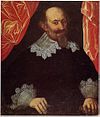
|
17 June 1579 Dessau Fifth son of Joachim Ernest and Eleonore of Württemberg |
6 December 1586 – 7 January 1650 | Principality of Köthen (in co-rulership in the whole Anhalt until 1603) |
Amöena Amalie of Bentheim-Tecklenburg 31 October 1606 Rheda two children Sophia of Lippe 12 September 1626 Detmold two children |
7 January 1650 Köthen aged 70 | |
| John Casimir | 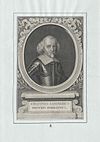
|
17 December 1596 Dessau Son of John George I and Dorothea of Palatinate-Simmern |
24 May 1618 – 15 September 1660 | Principality of Dessau | Agnes of Hesse-Kassel 18 May 1623 Dessau six children Sophie Margaret of Anhalt-Bernburg 14 July 1651 Dessau no children |
15 September 1660 Dessau aged 63 |
|
| Augustus | 
|
17 February 1577 Ratzeburg Son of Francis II and Margaret of Pomerania-Wolgast |
2 July 1619 – 18 January 1656 | Duchy of Lauenburg | Elisabeth Sophie of Holstein-Gottorp 5 March 1621 Husum six children Catherina of Oldenburg 4 June 1633 no children |
18 January 1656 Lauenburg aged 78 |
Left no male descendants; he was succeeded by his half-brother Julius Henry. |
| Regency of Augustus, Prince of Anhalt-Plötzkau (1621–1642) | |||||||
| John VI | 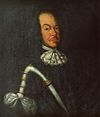
|
24 March 1621 Zerbst Son of Rudolph and Magdalena of Oldenburg |
30 July 1621 – 4 July 1667 | Principality of Zerbst | Sophie Augusta of Holstein-Gottorp 16 September 1649 Gottorp fourteen children |
4 July 1667 Zerbst aged 46 | |
| Christian II | 
|
11 August 1599 Amberg Second son of Christian I and Anna of Bentheim-Tecklenburg |
17 April 1630 – 22 September 1656 | Principality of Bernburg | Eleonore Sophie of Holstein-Sonderburg 28 February 1625 Ahrensbök fifteen children |
22 September 1656 Bernburg aged 57 |
Children of Christian I, divided their inheritance. |
| Frederick | 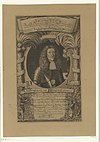
|
16 November 1613 Ensdorf Fourth son of Christian I and Anna of Bentheim-Tecklenburg |
17 April 1630 – 30 June 1670 | Principality of Bernburg (at Harzgerode) |
Johanna Elisabeth of Nassau-Hadamar 10 August 1642 Bückeburg three children Anna Catharina of Lippe-Detmold (31 July 1612 – 15 October 1659) 26 May 1657 Harzgerode no children |
30 June 1670 Plötzkau aged 56 | |
| Regency of Augustus, Prince of Anhalt-Plötzkau, Lebrecht, Prince of Anhalt-Köthen and Emmanuel, Prince of Anhalt-Köthen (1650–1653) | After his death without descendants, his previous regents took over the principality for themselves. | ||||||
| William Louis | 3 August 1638 Köthen Son of Louis I and Sophia of Lippe |
7 January 1650 – 13 April 1665 | Principality of Köthen | Elisabeth Charlotte of Anhalt-Harzgerode 25 August 1663 Köthen no children |
13 April 1665 Köthen aged 26 | ||
| Ernest Gottlieb | 4 September 1620 Plötzkau First son of Augustus and Sibylle of Solms-Laubach |
22 August 1653 – 7 March 1654 | Principality of Plötzkau | Unmarried | 7 March 1654 Plötzkau aged 33 |
||
| Lebrecht I | 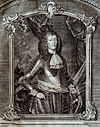
|
8 April 1622 Plötzkau Second son of Augustus and Sibylle of Solms-Laubach |
7 March 1654 – 13 April 1665 | Principality of Plötzkau | Sophie Eleonore of Stolberg-Wernigerode 18 January 1655 Plötzkau no children |
7 November 1669 Köthen aged 47 |
Cousins of William Louis, and princes of Anhalt-Plötzkau, they served as regents for their cousin alongside their uncle, Augustus. After William Louis' death in 1665, they took the principality of Köthen for themselves, giving away their inheritance in Plötzkau to Anhalt-Bernburg. |
| 13 April 1665 – 7 November 1669 | Principality of Köthen | ||||||
| Emmanuel | 
|
6 October 1631 Plötzkau Third son of Augustus and Sibylle of Solms-Laubach |
7 March 1654 – 13 April 1665 | Principality of Plötzkau | Anna Eleonore of Stolberg-Wernigerode 23 March 1670 Ilsenburg one child |
8 November 1670 Köthen aged 39 | |
| 13 April 1665 – 8 November 1670 | Principality of Köthen | ||||||
| Plotzkau definitively annexed to the Principality of Bernburg | |||||||
| Victor Amadeus | 
|
6 October 1634 Harzgerode Son of Christian II and Eleonore Sophie of Holstein-Sonderburg |
22 September 1656 – 14 February 1718 | Principality of Bernburg | Elisabeth of Palatinate-Zweibrücken 16 October 1667 Meisenheim six children |
14 February 1718 Bernburg aged 83 |
Annexed Anhalt-Plötzkau in 1665. |
| Julius Henry | 
|
9 April 1586 Wolfenbüttel Son of Francis II and Maria of Brunswick-Wolfenbüttel |
18 January 1656 – 20 November 1665 | Duchy of Lauenburg | Anna of East Frisia 17 March 1617 Grabow no children Elisabeth Sophia of Brandenburg 4 June 1633 Toužim one son Anna Magdalena of Lobkowicz 18 August 1632 Vienna six children |
20 November 1665 Prague aged 79 |
|
| John George II | 
|
17 November 1627 Dessau Son of John Casimir and Agnes of Hesse-Kassel |
15 September 1660 – 7 August 1693 | Principality of Dessau | Henriette Catherine of Orange-Nassau 9 September 1659 Groningen five children |
7 August 1693 Berlin aged 65 |
Prince of Anhalt-Dessau, he also served as regent for his cousin, Emmanuel Lebrecht of Anhalt-Kothen, together with the prince's mother, Anna Eleonore of Stolberg-Wernigerode. |
| Francis Erdmann | 25 February 1629 Toužim Son of Julius Henry and Elisabeth Sophia of Brandenburg |
20 November 1665 – 30 July 1666 | Duchy of Lauenburg | Sibylle Hedwig of Saxe-Lauenburg 1654 no children |
30 July 1666 Schwarzenbek aged 37 |
Left no descendants; He was succeeded by his brother Julius Francis. | |
| Julius Francis | 
|
16 September 1641 Prague Son of Julius Henry and Anna Magdalena of Lobkowicz |
30 July 1666 – 30 September 1689 | Duchy of Lauenburg | Hedwig of the Palatinate-Sulzbach 9 April 1668 Sulzbach two children |
30 September 1689 Zákupy aged 48 |
|
| Definitively annexed to the House of Welf | |||||||
| Regency of Sophie Augusta of Holstein-Gottorp (1667–1674) | Children of John VI, divided their inheritance. | ||||||
| Charles William | 
|
16 October 1652 Zerbst Third son of John VI and Sophie Augusta of Holstein-Gottorp |
4 July 1667 – 3 November 1718 | Principality of Zerbst | Sophia of Saxe-Weissenfels 18 June 1676 Halle three children |
3 November 1718 Zerbst aged 66 | |
| Anton Günther | 
|
11 November 1653 Zerbst Fourth son of John VI and Sophie Augusta of Holstein-Gottorp |
4 July 1667 – 1 November 1704 | Principality of Zerbst (at Mühlingen) |
Auguste Antonie Marschall of Bieberstein (3 March 1659 – 28 December 1736) 1 January 1705 Zerbst (morganatic) seven children |
10 December 1714 Zerbst aged 61 | |
| John Louis I | 4 May 1656 Zerbst Sixth son of John VI and Sophie Augusta of Holstein-Gottorp |
4 July 1667 – 1 November 1704 | Principality of Zerbst (at Dornburg) |
Christine Eleonore of Zeutsch (5 June 1666 – 17 May 1699) 23 July 1687 Halle (morganatic) seven children |
1 November 1704 Dornburg aged 48 | ||
| Mühlingen reannexed to Zerbst | |||||||
| William Louis | 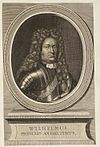
|
18 August 1643 Harzgerode Son of Frederick and Johanna Elisabeth of Nassau-Hadamar |
30 June 1670 – 14 October 1709 | Principality of Bernburg (at Harzgerode) |
Elisabeth Juliana of Solms-Laubach (6 March 1631 – 2 January 1693) 25 July 1671 Laubach no children Sophie Auguste of Nassau-Dillenburg (28 April 1666 – 14 January 1733) 20 October 1695 Frederiksborg no children |
14 October 1709 Harzgerode aged 66 |
After his death, Harzgerode merged again in Bernburg. |
| Harzgerode reannexed to Bernburg | |||||||
| Regencies of Anna Eleonore of Stolberg-Wernigerode (1670–1690) and John George II, Prince of Anhalt-Dessau (1690–1692) | |||||||
| Emmanuel Lebrecht | 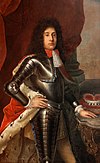
|
20 May 1671 Köthen Son of Emmanuel and Anna Eleonore of Stolberg-Wernigerode |
20 May 1671 – 30 May 1704 | Principality of Köthen | Gisela Agnes of Rath 30 September 1692 Nienburg (morganatic) ten children |
30 May 1704 Köthen aged 33 | |
| Regency of Henriette Catherine of Orange-Nassau (1693–1698) | |||||||
| Leopold I | 
|
3 July 1676 Dessau Son of John George II and Henriette Catherine of Orange-Nassau |
7 August 1693 – 7 April 1747 | Principality of Dessau | Anna Louise Föhse 8 September 1698 Dessau (morganatic) ten children |
7 April 1747 Dessau aged 70 | |
| Regency of Gisela Agnes of Rath (1704–1715) | With no male heirs, he was succeeded by his brother. | ||||||
| Leopold | 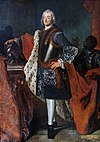
|
29 November 1694 Köthen Second son of Emmanuel Lebrecht and Gisela Agnes of Rath |
30 May 1704 – 19 November 1728 | Principality of Köthen | Frederica Henriette of Anhalt-Bernburg 11 December 1721 Bernburg one child Charlotte Frederike of Nassau-Siegen 27 June 1725 Weimar two children |
19 November 1728 Köthen aged 33 | |
| Charles Frederick | 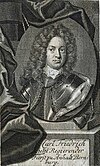
|
13 July 1668 Bernburg First son of Victor Amadeus and Elisabeth of Palatinate-Zweibrücken |
14 February 1718 – 22 April 1721 | Principality of Bernburg | Sophie Albertine of Solms-Sonnenwalde 25 June 1692 Bernburg six children Wilhelmine Charlotte Nüssler 1 May 1715 Bernburg two children |
22 April 1721 Bernburg aged 52 |
Children of Victor Amadeus, divided their rule. |
| Lebrecht | 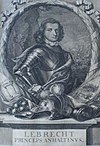
|
28 June 1669 Second son of Victor Amadeus and Elisabeth of Palatinate-Zweibrücken |
14 February 1718 – 17 May 1727 | Principality of Bernburg (in Zeitz and Hoym) |
Charlotte of Nassau-Schaumburg Schaumburg Castle 12 April 1692 five children Eberhardine of Weede 27 June 1702 Grave six children Sophie Sibylla of Ingersleben (18 March 1684 – 31 March 1726) 14 September 1725 (morganatic) no children |
17 May 1727 Bad Ems aged 57 | |
| John Augustus | 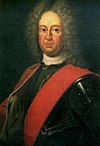
|
29 July 1677 Zerbst Son of Charles William and Sophia of Saxe-Weissenfels |
3 November 1718 – 7 November 1742 | Principality of Zerbst | Frederica of Saxe-Gotha-Altenburg 25 May 1702 Zerbst no children |
7 November 1742 Zerbst aged 65 |
Died without issue. Zerbst was inherited by his cousins from Dornburg. |
| Victor Frederick | 
|
20 September 1700 Bernburg Son of Charles Frederick and Sophie Albertine of Solms-Sonnenwalde |
22 April 1721 – 18 May 1765 | Principality of Bernburg | Louise of Anhalt-Dessau 25 November 1724 Dessau one child Sophie Albertine Fredericka of Brandenburg-Schwedt 22 May 1733 Potsdam five children Konstanze Fredericka Schmidt 13 November 1750 Bernburg (morganatic) one child |
18 May 1765 Bernburg aged 64 |
|
| Victor I Amadeus | 
|
7 September 1693 Schaumburg Son of Lebrecht and Charlotte of Nassau-Schaumburg |
17 May 1727 – 15 April 1772 | Principality of Bernburg (in Zeitz, Hoym and Schaumburg) |
Charlotte Louise of Isenburg-Birstein 22 November 1714 Birstein six children Hedwig Sophie Henckel of Donnersmarck 14 February 1740 Pölzig six children |
15 April 1772 Schaumburg aged 78 |
|
| Augustus Louis | 
|
9 June 1697 Köthen Third son of Emmanuel Lebrecht and Gisela Agnes of Rath |
19 November 1728 – 6 August 1755 | Principality of Köthen (at Güsten until 1737; at Köthen proper since 1737) |
Agnes Wilhelmine von Wuthenau 23 January 1722 Dresden (morganatic) two children Christine Johanna Emilie of Promnitz-Pless 14 January 1726 Sorau five children Anna Fredericka of Promnitz-Pless 21 November 1732 Sorau two children |
6 August 1755 Köthen aged 58 |
Inheritors of Leopold, "fought" (legally) for the inheritance. Heiress of her father, Gisela Agnes claimed her allodial inheritance (possibly, while Augustus Louis, brother of the deceased Leopold, should keep the main principality. According to the Reichskammergericht final decision, she kept her father's collections, and eventually gave up her inheritance (which included the main capital, Köthen, and other estates) when she married (1737), being compensated by her uncle with great sums of money that highly indebted the principality. |
| Regency of Charlotte Frederike of Nassau-Siegen (1728-1734) | |||||||
| Gisela Agnes | 
|
21 September 1722 Köthen Daughter of Leopold and Frederica Henriette of Anhalt-Bernburg |
19 November 1728 – 25 May 1737 | Principality of Köthen (at Köthen, Prosigk and Klepzig) |
Leopold II, Prince of Anhalt-Dessau 25 May 1737 Bernburg seven children |
20 April 1751 Dessau aged 22 | |
| The property of the Principality of Köthen was reunited in 1737 | |||||||
| John Louis II | 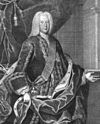
|
23 June 1688 Dornburg First son of John Louis I and Christine Eleonore of Zeutsch |
7 November 1742 – 5 November 1746 | Principality of Zerbst (in Dornburg 1704–1742; in Zerbst proper since 1742) |
Unmarried | 5 November 1746 Dornburg aged 58 |
First cousins of John Augustus I, they were Princes of Dornburg, until its ending by joining it with the inherited Principality of Zerbst. |
| Christian August | 
|
29 November 1690 Dornburg Third son of John Louis I and Christine Eleonore of Zeutsch |
7 November 1742 – 16 March 1747 | Joanna Elisabeth of Holstein-Gottorp 8 November 1727 Vechelde five children |
16 March 1747 Dornburg aged 56 | ||
| Dornburg reannexed to Zerbst | |||||||
| Leopold II Maximilian | 
|
25 December 1700 Dessau Son of Leopold I and Anna Louise Föhse |
7 April 1747 – 16 December 1751 | Principality of Dessau | Gisela Agnes of Anhalt-Köthen 25 May 1737 Bernburg seven children |
16 December 1751 Dessau aged 50 |
|
| Regency of Joanna Elisabeth of Holstein-Gottorp (1747–1752) | Left no descendants; after his death, his property was annexed by his cousins from Dessau. | ||||||
| Frederick August | 
|
8 August 1734 Stettin Son of Christian August and Joanna Elisabeth of Holstein-Gottorp |
16 March 1747 – 3 March 1793 | Principality of Zerbst | Caroline Wilhelmina Sophia of Hesse-Kassel 17 November 1753 Zerbst no children Friederike Auguste Sophie of Anhalt-Bernburg 22 May 1764 Ballenstedt no children |
3 March 1793 Luxembourg aged 58 | |
| Definitively annexed by the Principality of Anhalt-Dessau | |||||||
| Regency of Dietrich of Anhalt-Dessau (1751–1758) | Initially under regency, Leopold III himself also served later as regent for his cousin, Louis Augustus Karl Frederick Emil from Anhalt-Kothen. After his death the regency in Anhalt-Kothen passed together with the principality of Anhalt-Dessau to his grandson. | ||||||
| Leopold III Frederick Franz | 
|
10 August 1740 Dessau Son of Leopold II Maximilian and Gisela Agnes of Anhalt-Köthen |
16 December 1751 – 9 August 1817 | Principality of Dessau (until 1807) Duchy of Dessau (from 1807) |
Louise Henriette of Brandenburg-Schwedt 25 July 1767 Charlottenburg two children |
9 August 1817 Luisium Castle aged 76 | |
| Charles George Lebrecht | 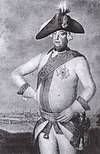
|
15 August 1730 Köthen Second son of Augustus Louis and Christine Johanna Emilie of Promnitz-Pless |
6 August 1755 – 17 October 1789 | Principality of Köthen | Louise Charlotte of Holstein-Glücksburg 26 July 1763 Glücksburg six children |
17 October 1789 Zemun aged 59 |
Children of Augustus Louis, divided their inheritance. |
| Frederick Erdmann | 
|
27 October 1731 Köthen Third son of Augustus Louis and Christine Johanna Emilie of Promnitz-Pless |
6 August 1755 – 12 December 1797 | Principality of Köthen (at Pless) |
Louise Ferdinande of Stolberg-Wernigerode 13 June 1766 Wernigerode nine children |
12 December 1797 Pless aged 66 | |
| Frederick Albert | 
|
15 August 1735 Bernburg Son of Victor Frederick and Sophie Albertine Fredericka of Brandenburg-Schwedt |
18 May 1765 – 9 April 1796 | Principality of Bernburg | Louise Albertine of Holstein-Plön 25 November 1724 Augustenburg two children |
9 April 1796 Ballenstedt aged 60 |
|
| Charles Louis | 16 May 1723 Schaumburg Third son of Victor I Amadeus and Charlotte Louise of Isenburg-Birstein |
15 April 1772 – 20 August 1806 | Principality of Bernburg (in Schaumburg and Hoym) |
Benjamine Gertrude Keiser (1 January 1729 – 6 January 1787) 25 March 1748 Stevensweert (morganatic) Amalia Eleonora of Solms-Braunfels 12 December 1765 Braunfels five children |
20 August 1806 Schaumburg aged 83 |
||
| Augustus Christian Frederick | 18 November 1769 Köthen Son of Charles George Lebrecht and Louise Charlotte of Holstein-Glücksburg |
17 October 1789 – 5 May 1812 | Principality of Köthen (until 1806) Duchy of Köthen (from 1806) |
Frederica of Nassau-Usingen 9 February 1792 Frankfurt-am-Main no children |
5 May 1812 Geuz aged 42 |
In 1806 became Duke of Anhalt-Köthen. Left no descendants, and was succeeded by his nephew. | |
| Alexius Frederick Christian | 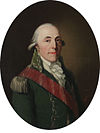
|
12 June 1767 Ballenstedt Son of Frederick Albert and Louise Albertine of Holstein-Plön |
9 April 1796 – 24 March 1834 | Principality of Bernburg (until 1803) Duchy of Bernburg (from 1803) |
Marie Friederike of Hesse-Kassel 29 November 1794 Kassel (annulled 1817) four children Dorothea Fredericka of Sonnenberg 11 January 1818 Ballenstedt (morganatic) no children Ernestine Charlotte of Sonnenberg 2 May 1819 Bernburg (morganatic) no children |
24 March 1834 Ballenstedt aged 66 |
In 1803 became Duke of Anhalt-Bernburg. |
| Victor II Charles | 2 November 1767 Schaumburg Son of Charles Louis and Amalia Eleonora of Solms-Braunfels |
20 August 1806 – 22 April 1812 | Principality of Bernburg (in Schaumburg and Hoym) |
Amelia of Nassau-Weilburg 29 October 1793 Weilburg four children |
22 April 1812 Schaumburg aged 44 |
||
| Frederick | 29 November 1741 Schaumburg Fifth son of Victor I Amadeus and Charlotte Louise of Isenburg-Birstein |
22 April – 24 December 1812 | Principality of Bernburg (in Schaumburg and Hoym) |
Unmarried | 24 December 1812 | After his childless death, Hoym and Holzappel were inherited by his niece Hermine (daughter of Victor II), while Hoym merged in Bernburg again. | |
| Hoym reannexed to Bernburg | |||||||
| Regencies of Leopold III, Duke of Anhalt-Dessau (1812–1817) and Leopold IV, Duke of Anhalt (1817–1818) | Nephew of Augustus Christian Frederick. Died as a minor, never ruled by his own. | ||||||
| Louis Augustus Karl | 
|
20 September 1802 Köthen Son of Louis of Anhalt-Köthen and Louise Caroline of Hesse-Darmstadt |
5 May 1812 – 18 December 1818 | Duchy of Köthen | Louise Charlotte of Schleswig-Holstein-Sonderburg-Glücksburg 26 July 1763 Glücksburg six children |
18 December 1818 Leipzig aged 16 | |
| Hermine | 
|
2 December 1797 Hoym Daughter of Victor II Charles and Amelia of Nassau-Weilburg |
24 December 1812 – 14 September 1817 | Principality of Bernburg (in Schaumburg and Holzappel) |
Archduke Joseph, Palatine of Hungary 30 August 1815 Schaumburg Castle two children |
14 September 1817 Budapest aged 19 |
After her death her lands probably merged again in Bernburg. |
| Schaumburg and Holzappel reannexed to Bernburg | |||||||
| Frederick Ferdinand | 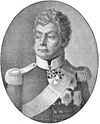
|
25 June 1769 Pless Second son of Frederick Erdmann and Louise Ferdinande of Stolberg-Wernigerode |
18 December 1818 – 23 August 1830 | Duchy of Köthen (in Pless 1797–1818; in Köthen proper since 1818) |
Maria Dorothea of Holstein-Beck 26 July 1763 Lindenau bei Heiligenbeil no children Julie of Brandenburg 20 May 1816 Berlin no children |
23 August 1830 Köthen aged 61 |
From the Anhalt-Pless line, cousin of his predecessor. Attempted, with no success, to reinstall Catholicism in his duchy. Left no descendants; he was succeeded by his brother. |
| Henry | 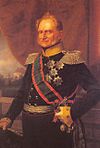
|
30 July 1778 Pless Fourth son of Frederick Erdmann and Louise Ferdinande of Stolberg-Wernigerode |
23 August 1830 – 23 November 1847 | Duchy of Köthen | Augusta Reuss of Middle Köstritz 18 May 1819 Trebschen no children |
23 November 1847 Köthen aged 69 |
Left no descendants. His lands were inherited by Leopold of Anhalt-Dessau. |
| Definitively annexed to the Principality of Anhalt-Dessau | |||||||
| Alexander Charles | 
|
2 March 1805 Ballenstedt Son of Alexius Frederick Christian and Marie Friederike of Hesse-Kassel |
24 March 1834 – 19 August 1863 | Duchy of Bernburg | Frederica of Holstein-Glücksburg 30 October 1834 Gottorp no children |
19 August 1863 Hoym aged 58 |
Left no male descendants. Bernburg reverted to Anhalt-Dessau. |
| Definitively annexed to the Principality of Anhalt-Dessau | |||||||
| Leopold IV Frederick | 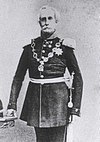
|
1 October 1794 Dessau Son of Frederick of Anhalt-Dessau and Amalie of Hesse-Homburg |
9 August 1817 – 22 May 1871 | Duchy of Dessau (until 1863) Duchy of Anhalt (from 1863) |
Frederica Wilhelmina of Prussia 18 April 1818 Berlin six children |
22 May 1871 Dessau aged 76 |
Grandson of Leopold III. Ended the regency in Kothen after his cousin's death (1818). In 1863 he reunited Anhalt under his rule, and becomes its first duke. |
| Frederick I | 
|
29 April 1831 Dessau Son of Leopold IV Frederick and Frederica Wilhelmina of Prussia |
22 May 1871 – 24 January 1904 | Duchy of Anhalt | Antoinette of Saxe-Altenburg 22 April 1854 Altenburg six children |
24 January 1904 Ballenstedt aged 72 |
|
| Frederick II | 
|
19 August 1856 Dessau First son of Frederick I and Antoinette of Saxe-Altenburg |
24 January 1904 – 21 April 1918 | Duchy of Anhalt | Marie of Baden 2 July 1889 Karlsruhe no children |
21 April 1918 Ballenstedt aged 61 |
Left no descendants. He was succeeded by his brother. |
| Edward | 
|
18 April 1861 Dessau Second son of Frederick I and Antoinette of Saxe-Altenburg |
21 April – 13 September 1918 | Duchy of Anhalt | Louise Charlotte of Saxe-Altenburg 6 February 1895 Altenburg (annulled 26 January 1918) six children |
13 September 1918 Berchtesgaden aged 57 |
|
| Joachim Ernest | 
|
11 January 1901 Dessau Son of Edward and Louise Charlotte of Saxe-Altenburg |
13 September – 12 November 1918 | Duchy of Anhalt | Elisabeth Strickrodt 3 March 1927 Ballenstedt (morganatic, annulled 1929) no children Edda-Charlotte von Stephani-Marwitz 15 October 1929 Ballenstedt (morganatic) five children |
18 February 1947 Weimar aged 46 |
Monarchy abolished in that year. |
Heads of the House of Ascania since 1918
Family trees
Main article: de:Stammliste der Askanier(genealogical list of the dynasty in German)

Armorial
Main article: Coat of arms of SaxonyThe original arms of the house of Ascania, from their ancestors the Saxon counts of Ballenstedt, were "Barry of ten sable and or".
The Ascanian margrave Albert the Bear was invested with the Saxon ducal title in 1138; when he succeeded the Welf's Henry the Lion, who was deposed by Emperor Frederick Barbarossa. In 1180, Albert's son Bernhard, Count of Anhalt received the remaining Saxon territories around Wittenberg and Lauenburg, and the ducal title. Legend, so unlikely to be true, goes that when he rode in front of the emperor, at the occasion of his investiture, he carried a shield with his escutcheon of the Ballenstedt coat of arms (barry sable and or). Barbarossa took the rue wreath he wore against the heat of the sun from his head, hanging it over Bernhard's shield and thus creating the Saxonian crancelin vert ("Barry of ten sable and or, a crancelin vert"). A more likely explanation is that it probably symbolized the waiver of the Lauenburg lands.
From about 1260, the Duchy of Saxe-Wittenberg emerged under the Ascanian duke Albert II, who adopted the tradition of the Saxon stem duchy and was granted the Saxon electoral dignity, against the fierce protest of his Ascanian Saxe-Lauenburg cousins. This was confirmed by the Golden Bull of 1356. As the Ascanian Electors of Saxony also held the High office of an Arch-Marshal of the Holy Roman Empire, they added the ensign Per fess sable and argent two swords in saltire gules (the swords later featuring as the trademark of the Meissen china factory) to their coat of arms. When the line became extinct in 1422, the arms and electoral dignity were adopted by the Wettin by margrave Frederick IV of Meissen as it had become synonymous with the Saxon ducal title.
When upon German reunification the Free State of Saxony was re-established, the coat of arms was formally confirmed in 1991.
-
 Original Arms of counts of Ballenstedt
Original Arms of counts of Ballenstedt
-
 Arms of Ascania impaled with the Mark of Brandenburg
Arms of Ascania impaled with the Mark of Brandenburg
-
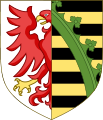 Arms of Ascania impaled with the Mark of Brandenburg
Arms of Ascania impaled with the Mark of Brandenburg
-
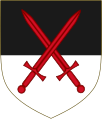 Arms of the Arch-Marshal/prince elector of the Saxons of the Holy Roman Empire
Arms of the Arch-Marshal/prince elector of the Saxons of the Holy Roman Empire
-
 Arms of the Elector/Duke of Saxony (Saxe-Wittenburg)
Arms of the Elector/Duke of Saxony (Saxe-Wittenburg)
-
 Principality of Anhalt in the 15th century
Principality of Anhalt in the 15th century
-
 Principalities of Anhalt in the 17th century
Principalities of Anhalt in the 17th century
-
 Principality of Anhalt-Köthen in the 18th century
Principality of Anhalt-Köthen in the 18th century
-
 Principality of Anhalt-Zerbst in the 19th century
Principality of Anhalt-Zerbst in the 19th century
-
 Coat of Arms of the Duchy of Anhalt
Coat of Arms of the Duchy of Anhalt
-
 Achievement of the Duchy of Anhalt
Achievement of the Duchy of Anhalt
The chivalric order was the House Order of Albert the Bear (German: Hausorden Albrechts des Bären or Der Herzoglich Anhaltische Hausorden Albrechts des Bären) which was founded in 1836 as a joint House Order by three dukes of Anhalt from separate branches of the family: Henry, Duke of Anhalt-Köthen, Leopold IV, Duke of Anhalt-Dessau, and Alexander Karl, Duke of Anhalt-Bernburg.
The namesake of the order, Albert the Bear, was the first Margrave of Brandenburg from the House of Ascania. The origin of his nickname "the Bear" is unknown.
-
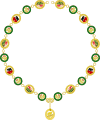 Collar of the Order of Albert the Bear
Collar of the Order of Albert the Bear
-
Star of the Order of Albert the Bear
-
 House Order of Albert the Bear
House Order of Albert the Bear
List of states ruled by the House of Ascania
-
 Saxony in 1180 with the Ascanian duchies in Saxony around 1235 (green). The former stem Duchy of Saxony is in gold with the official electorate duchy of Saxe-Wittenberg in green in the South East. Also shown is Saxe-Lauenburg in North West and the Welf Duchies of Brunswick-Luneburg in orange.
Saxony in 1180 with the Ascanian duchies in Saxony around 1235 (green). The former stem Duchy of Saxony is in gold with the official electorate duchy of Saxe-Wittenberg in green in the South East. Also shown is Saxe-Lauenburg in North West and the Welf Duchies of Brunswick-Luneburg in orange.
-
The Duchy of Saxe-Lauenburg in 1400
-
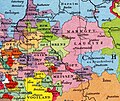 Duchy of Saxe-Wittenberg (dark green, centred on the town of Wittenberg)
Duchy of Saxe-Wittenberg (dark green, centred on the town of Wittenberg)
-
 Brandenburg in 1320 under the Ascanians
Brandenburg in 1320 under the Ascanians
-
 The Duchy of Anhalt, bordered by Prussia und Duchy of Brunswick-Luneburg
The Duchy of Anhalt, bordered by Prussia und Duchy of Brunswick-Luneburg
-
 Anhalt Principalities in 1789: Anhalt-Bernburg (AB), Anhalt-Köthen (AK), Anhalt-Dessau (AD) and Anhalt-Zerbst (AZ); on the rightside of the map: the Electorate of Brandenburg (blue) und Electorate of Saxony (orange)
Anhalt Principalities in 1789: Anhalt-Bernburg (AB), Anhalt-Köthen (AK), Anhalt-Dessau (AD) and Anhalt-Zerbst (AZ); on the rightside of the map: the Electorate of Brandenburg (blue) und Electorate of Saxony (orange)
- County, Principality, and Duchy of Anhalt: c. 1100–1918
- Duchy and Electorate of Saxony: 1112, 1139–1142, 1180–1422
- County of Weimar-Orlamünde: 1112–1486
- Margravate of Brandenburg: 1157–1320
- Duchy of Saxe-Lauenburg: 1269–1689
- Principality of Lüneburg: 1369–1388
- Principality and Duchy of Anhalt-Bernburg: 1252–1468 and 1603–1863
- Principality of Anhalt-Zerbst: 1252–1396 and 1544–1796
- Principality of Anhalt-Aschersleben: 1252–1315
- Principality and Duchy of Anhalt-Köthen: 1396–1561 and 1603–1847
- Principality and Duchy of Anhalt-Dessau 1396–1561 and 1603–1863
- Principality of Anhalt-Plötzkau 1544–1553 and 1603–1665
- Principality of Anhalt-Harzgerode 1635–1709
- Principality of Anhalt-Mühlingen: 1667–1714
- Principality of Anhalt-Dornburg: 1667–1742
- Lordship of Jever: 1667–1796
- Principality of Anhalt-Bernburg-Schaumburg-Hoym: 1718–1812
- Russian Empire: 1762–1796
References
- Askanien, Meyers Konversationslexikon, 1888 Archived 2007-09-24 at the Wayback Machine
- Trillmich, Werner, Kaiser Konrad II. und seine Zeit, Bonn, 1991
- Hiebl, Manfred (2006). "Das Haus Askanien-Anhalt, dessen Zweige und ihre Bedeutung". www.manfred-hiebl.de. Retrieved 2020-08-29.
- "Ascania 1". genealogy.euweb.cz. 2003-08-01. Retrieved 2020-08-29.
- hrsg. von Werner Paravicini. Bearb. von Jan Hirschbiegel. "Askanier". Höfe und Residenzen im spätmittelalterlichen Reich Bd. 1. Ein dynastisch-topographisches Handbuch Teilbd. 2. Residenzen. Ostfildern. ISBN 978-3-7995-4515-0. OCLC 723003848.
- From Stendal split off:
- Krossen (1266–1308)
- Neumark (1266–1318)
- Stargard split off from Salzwedel (1267-1316) and was then annexed to the Duchy of Mecklenburg.
- The color chosen for Dessau was the same as the Principality of Anhalt as a whole, because, when united, the principality had this town as capital.
- Even his name is uncertain; sources name him Adalbert assuming that his grandson, Count Adalbert (II) (d.1080) was named after him.
- Numbered Bernard III as Duke of Saxony, but, as an ancestor of the Anhalt branch, he is not counted in Anhalt, as the next prince Bernard, reigning in Bernburg, is usually styled Bernard I. This is probably derived of a different status between this Bernard, a count in Anhalt, and the following Bernards, who were already princes.
- Otto VII is listed before Otto V and VI here, as his rule, as it was never independent (unlike his brother John IV, who survived their father), is considered within the rule of his father, which began in 1267.
- ^ Herman V was possibly younger than his cousin Herman IV, but he ascended two years earlier then him.
- ^ Otto VI was possibly younger than his cousin Otto V, but he ascended one year earlier then him.
- The numberings here lead to some confusion, as not all genealogists of the House of Ascania count John IV in the list of dukes of Saxe-Lauenburg, numbering John V (John IV's nephew) as John IV.
- Numbered after Bernard, Count of Anhalt, who was also Duke of Saxony.
- Sometimes numbered John IV. He is sometimes confused with his uncle, John IV (Eric V and Bernard IV's brother) and a son of his own (John IV, Bishop of Hildesheim).
- Sometimes numbered Rudolph IV.
- Despite being the fourth ruler in Dessau/Zerbst named John, sources count John, canon of Merseburg (d.1455), a brother of George I of Dessau who never ruled, as John IV. This compromises the countings of John V and John VI, the fourth and fifth rulers of Anhalt of this name.
- Actually the fifth ruler named John. See note for John V of Zerbst.
- Freistaat Sachsen official website Archived 2013-01-22 at the Wayback Machine (in German) Accessed 2009-05-19.
- Flag Legislation (Saxony, Germany) Archived 2008-11-22 at the Wayback Machine :
The Landtag of Saxony state parliament has passed on 25 October 1991 the following law:
§ 1 (1) The lesser coat-of-arms of the Free State of Saxony shows an escutcheon bendy of nine pieces black and gold, a green rue-crown bendwise. (2) A greater coat-of-arms of the Free State of Saxony can be determined by a special law.
§ 2 For the rendering of the coat-of-arms the patterns, which are attached to this law as appendix, are authoritative. The coloured patterns are deposited in the Main Public Record Office of Saxony.
§ 3 The regulations necessary for the implementation of this law are issued by the State Government. It can pass on this authority.
§ 4 This law comes into force the day after its proclamation.
The preceding law is executed herewith and is to be proclaimed.
— Prof. Dr. Kurt Biedenkopf (Minister President), Steffen Heitmann (State Minister of Justice), Law relating to the coat-of-arms of the Free State of Saxony of 18 November 1991, (Saxon Law and Official Gazette 1991, p. 383-385), Dresden, 18 November 1991.
External links
- House of Ascania – official website
- European Heraldry page
- Marek, Miroslav. "GENEALOGY.EU: House of Ascania". Genealogy.EU. (first page of a series)
- Stirnet: Brandenburg1 (subscription required) (genealogy of the Houses of Ascania and Brandenburg, including the most likely ancestry of the 11th-century House of Ascania)
- Stirnet: Ascania1 (subscription required) (an alternate possible ancestry of the 11th-century House of Ascania)